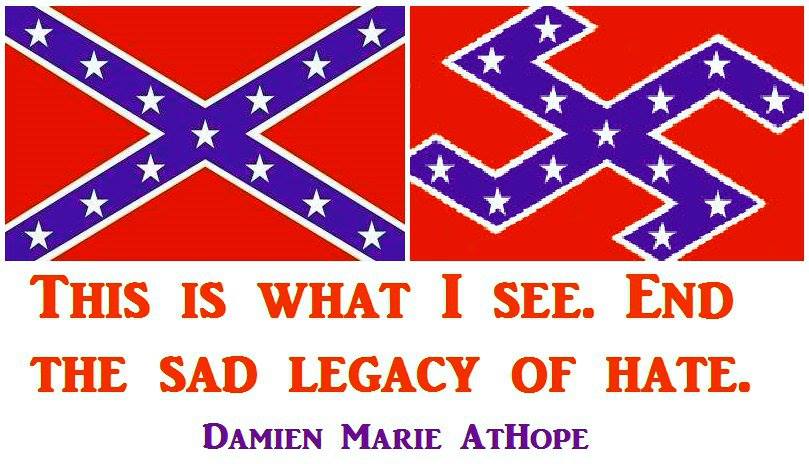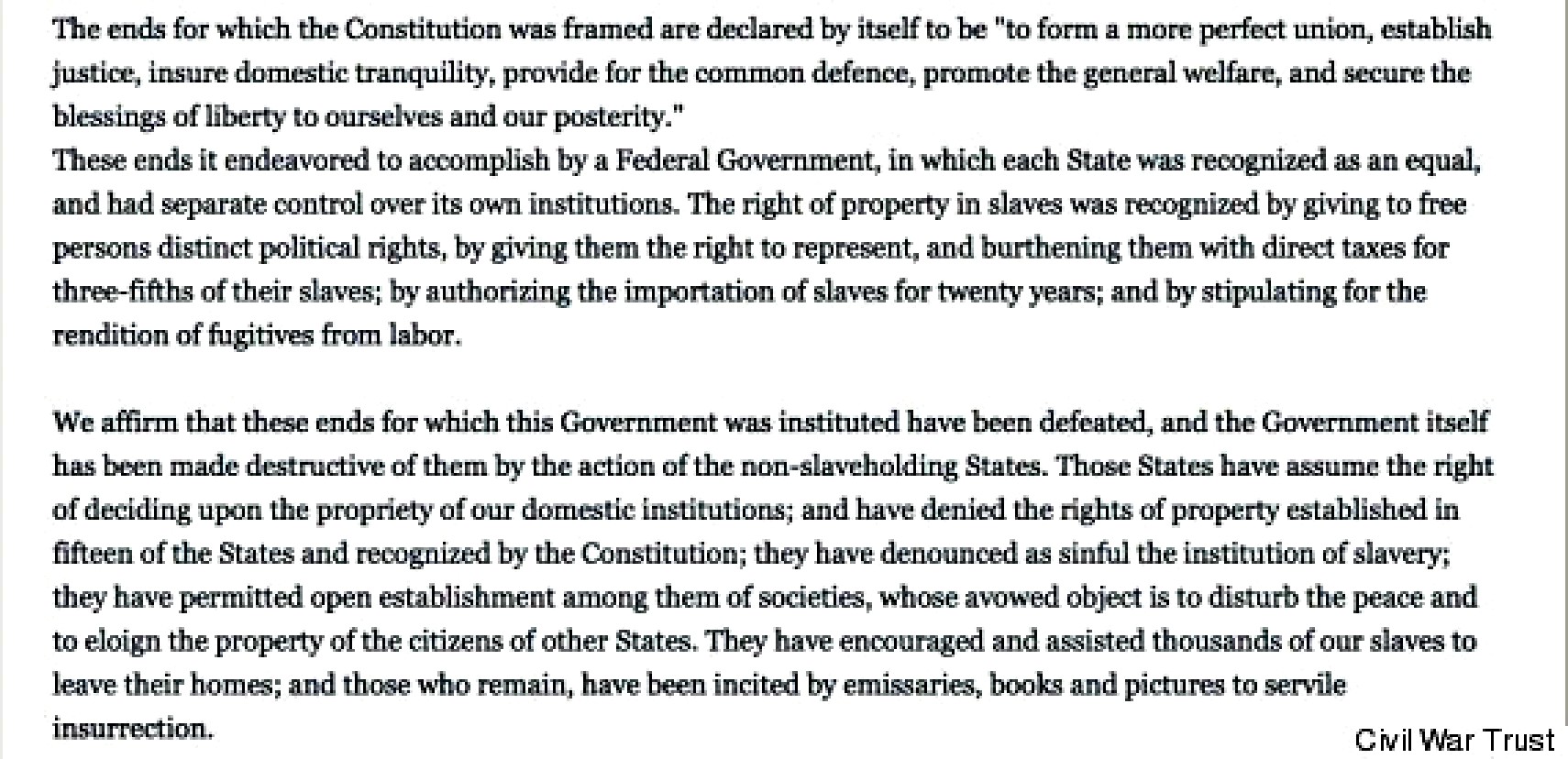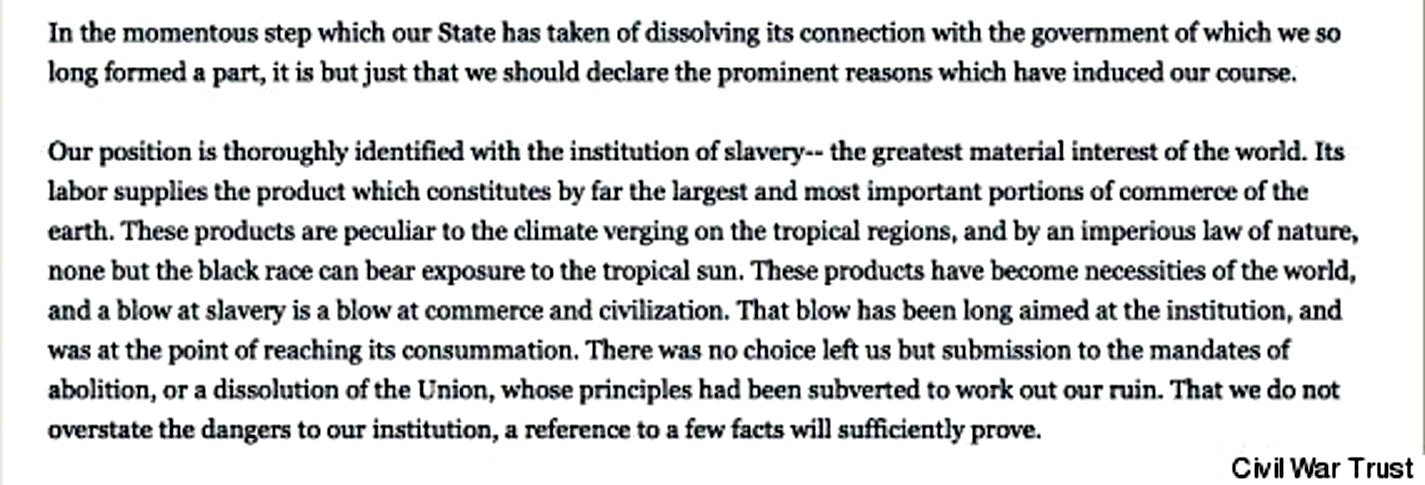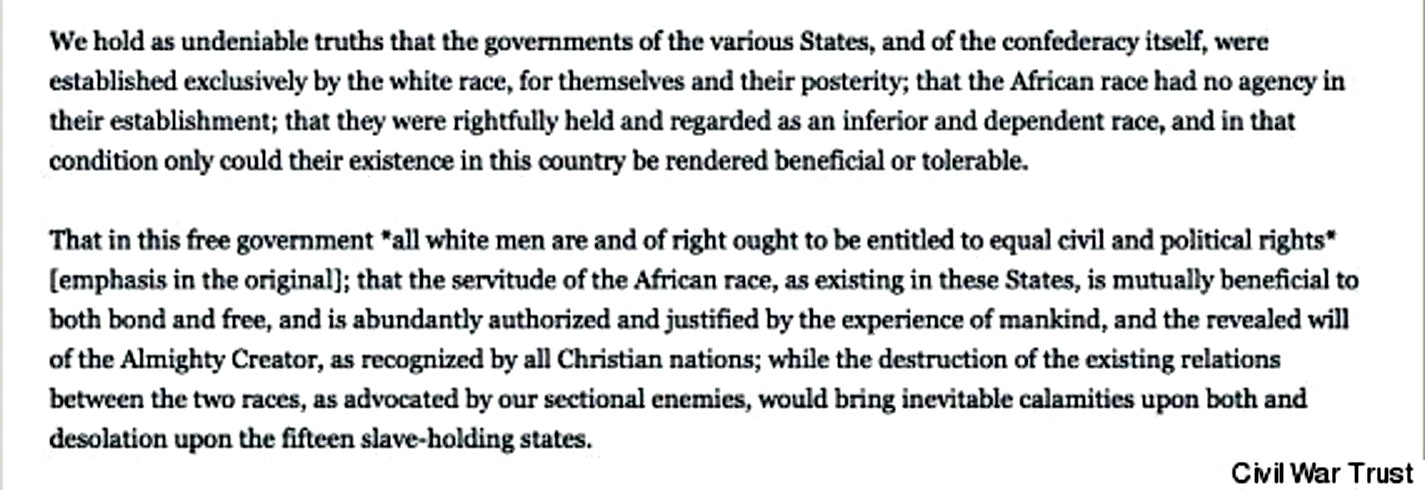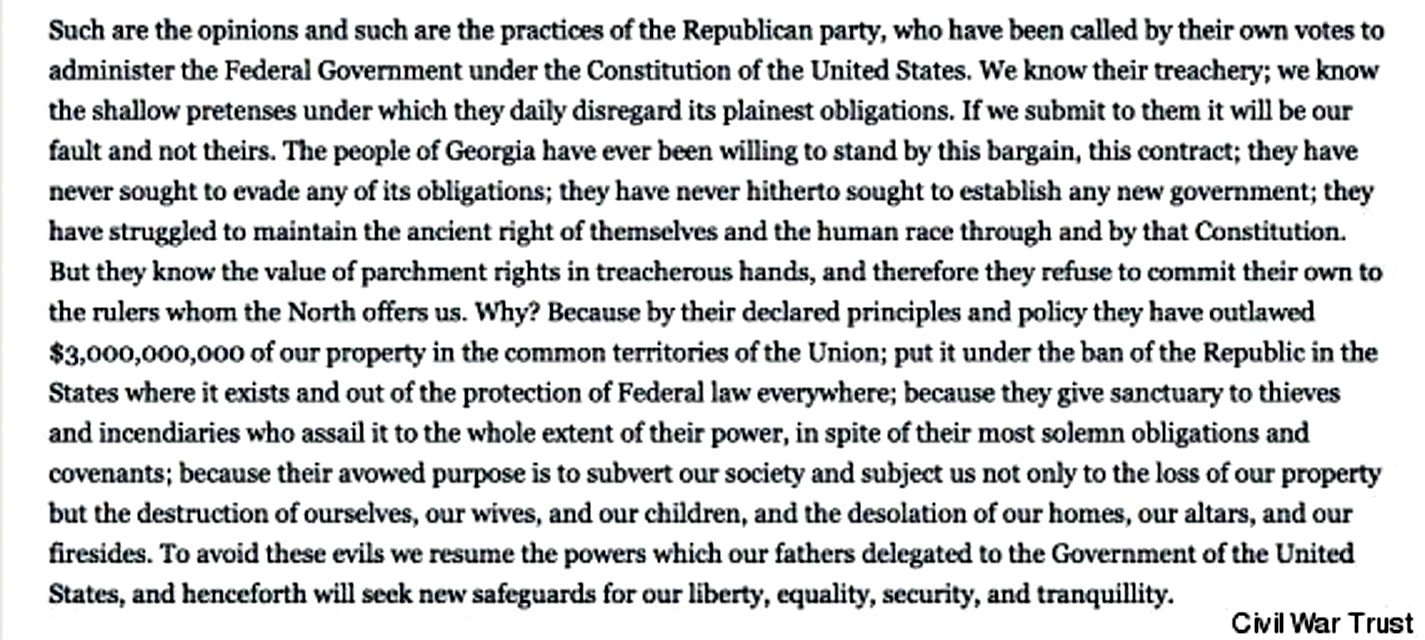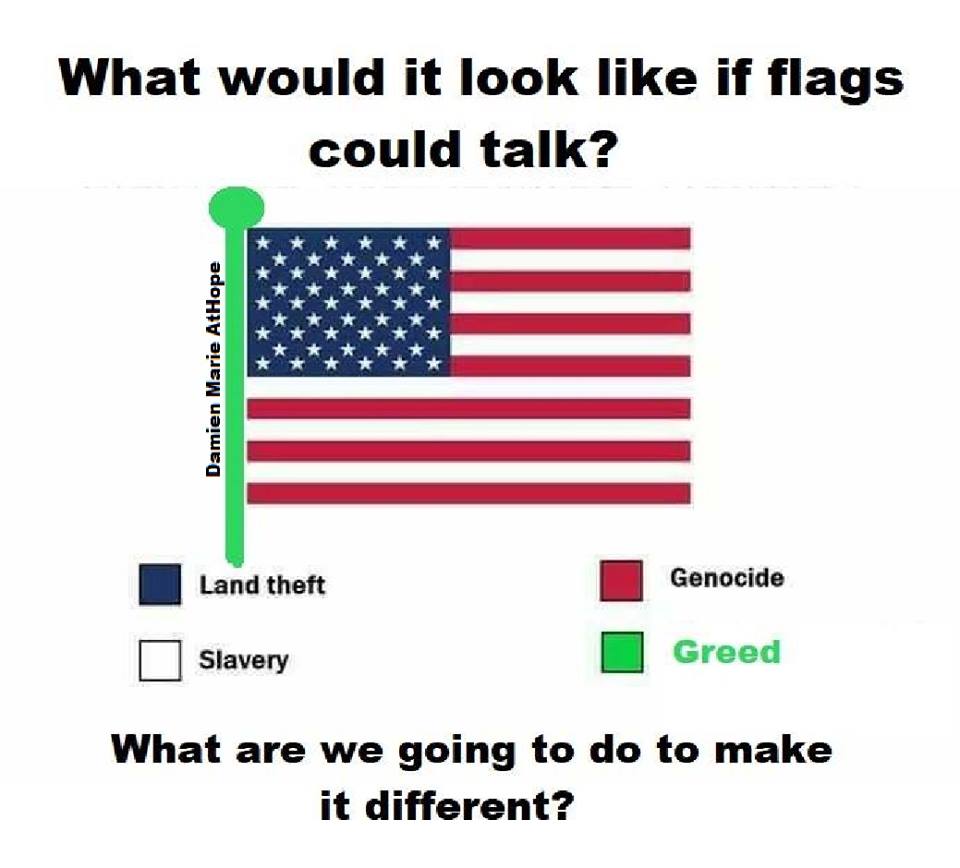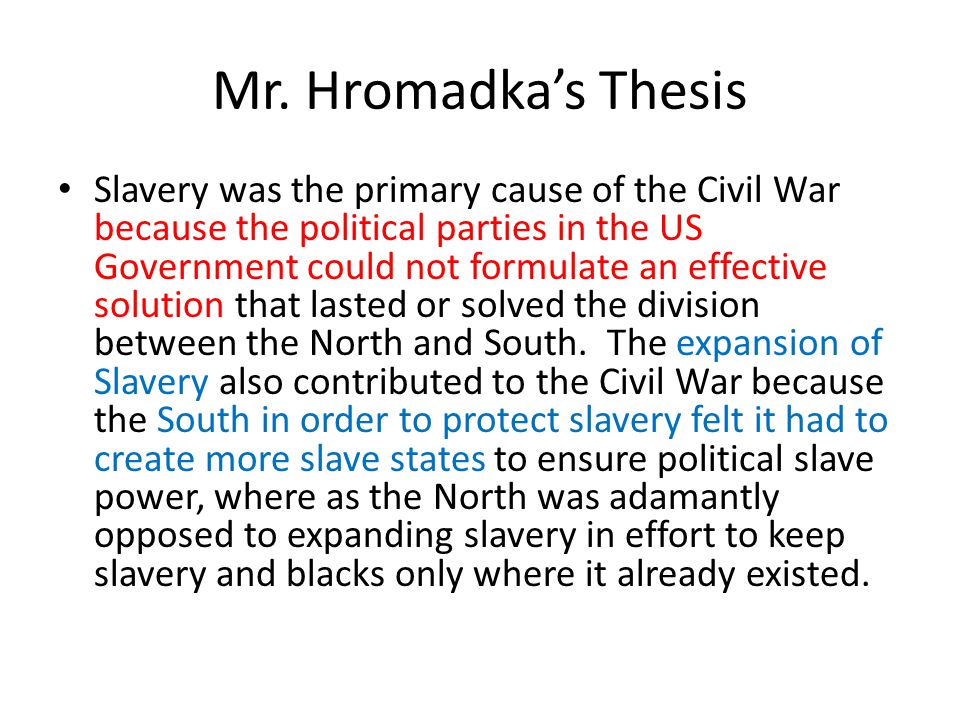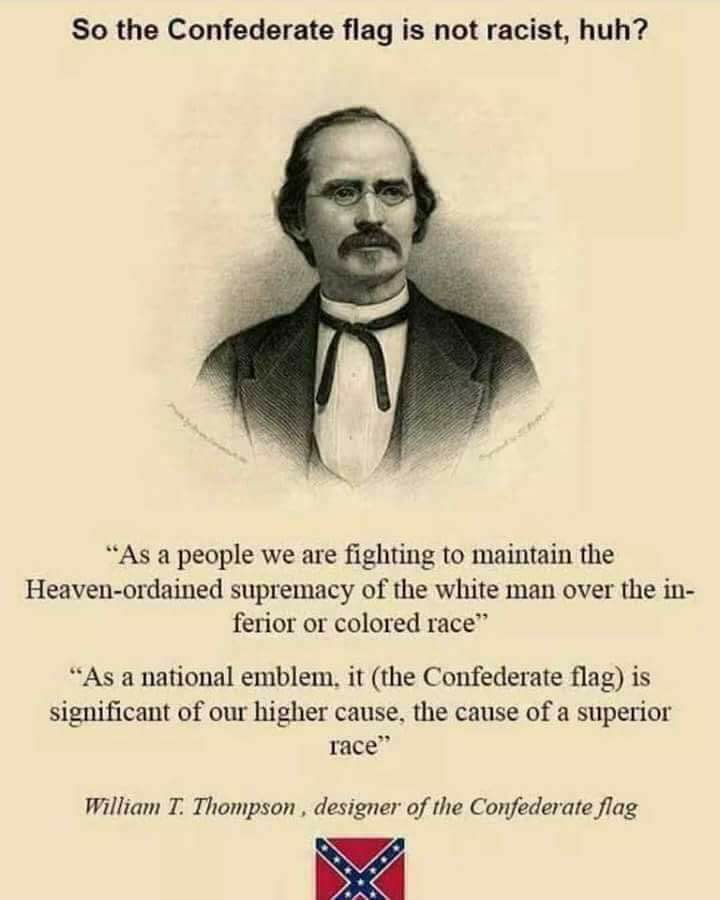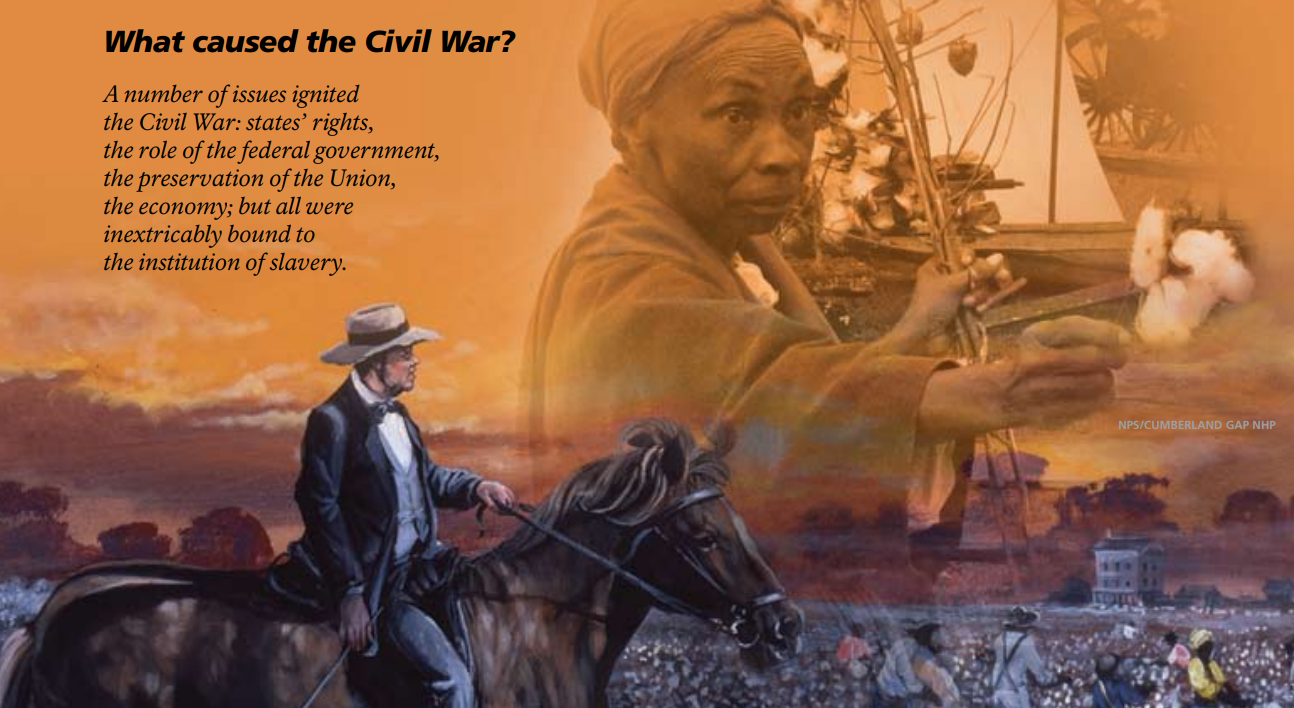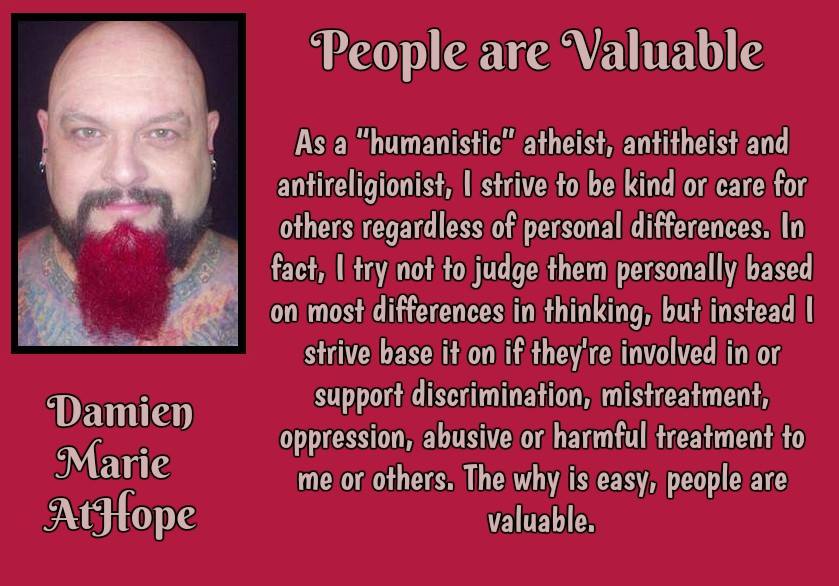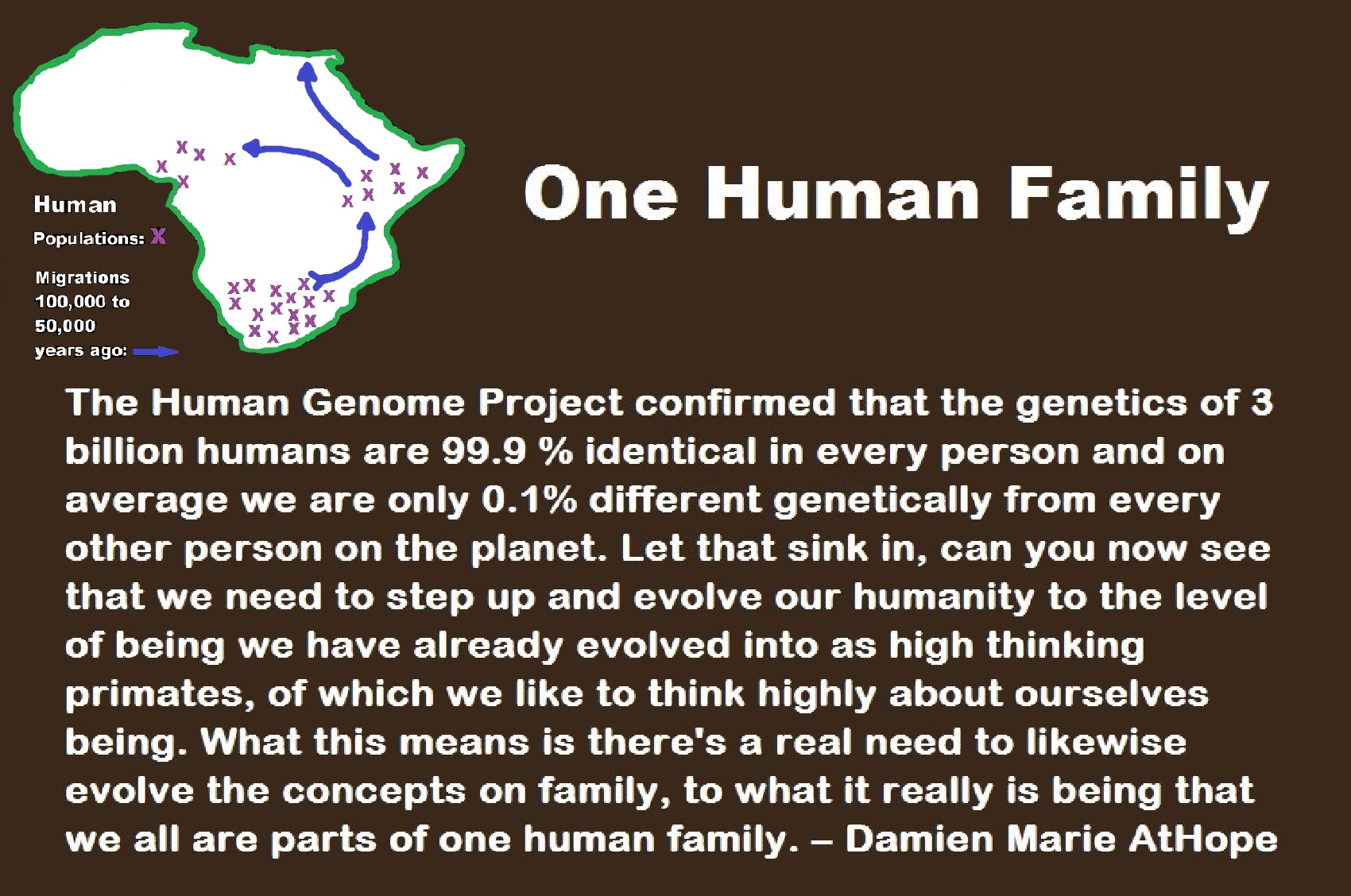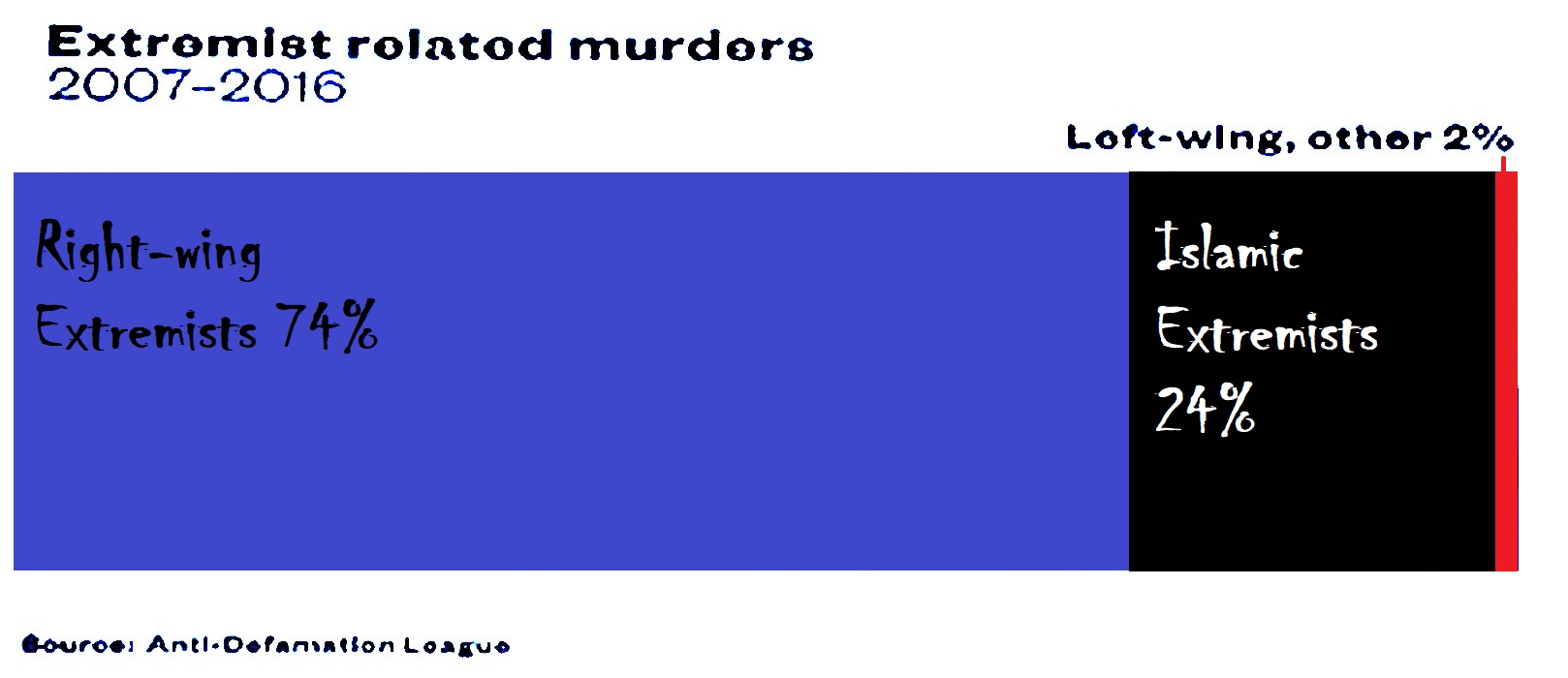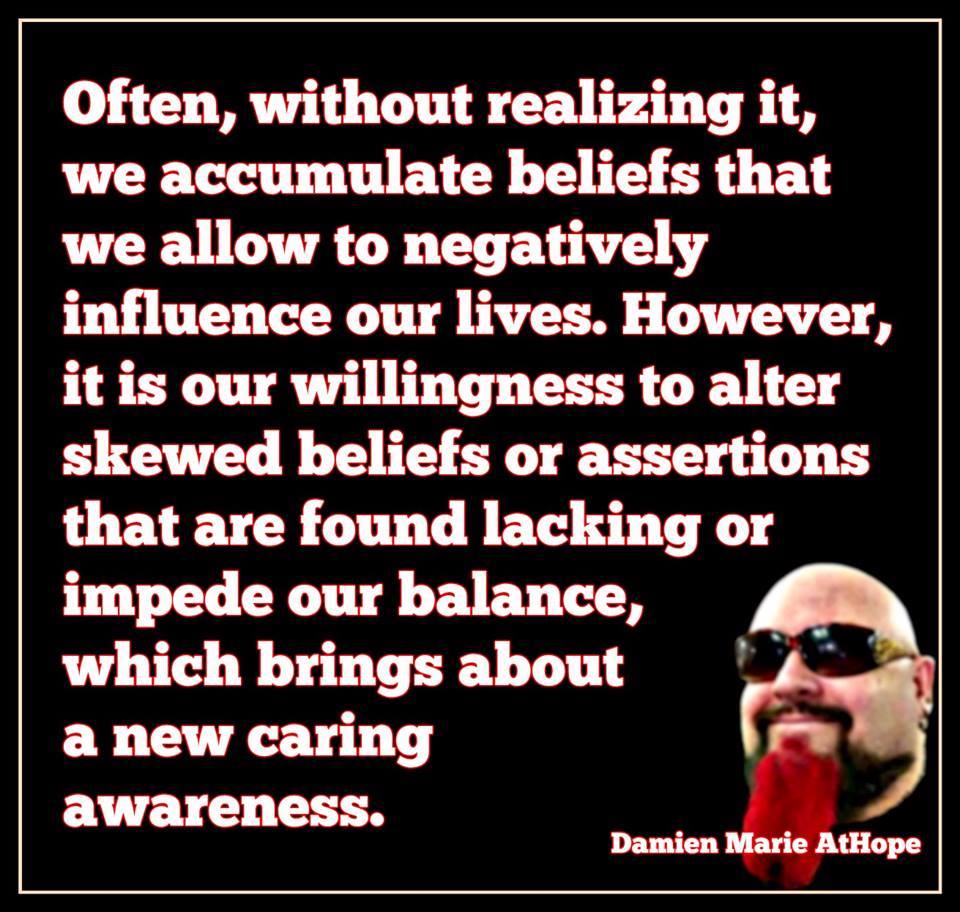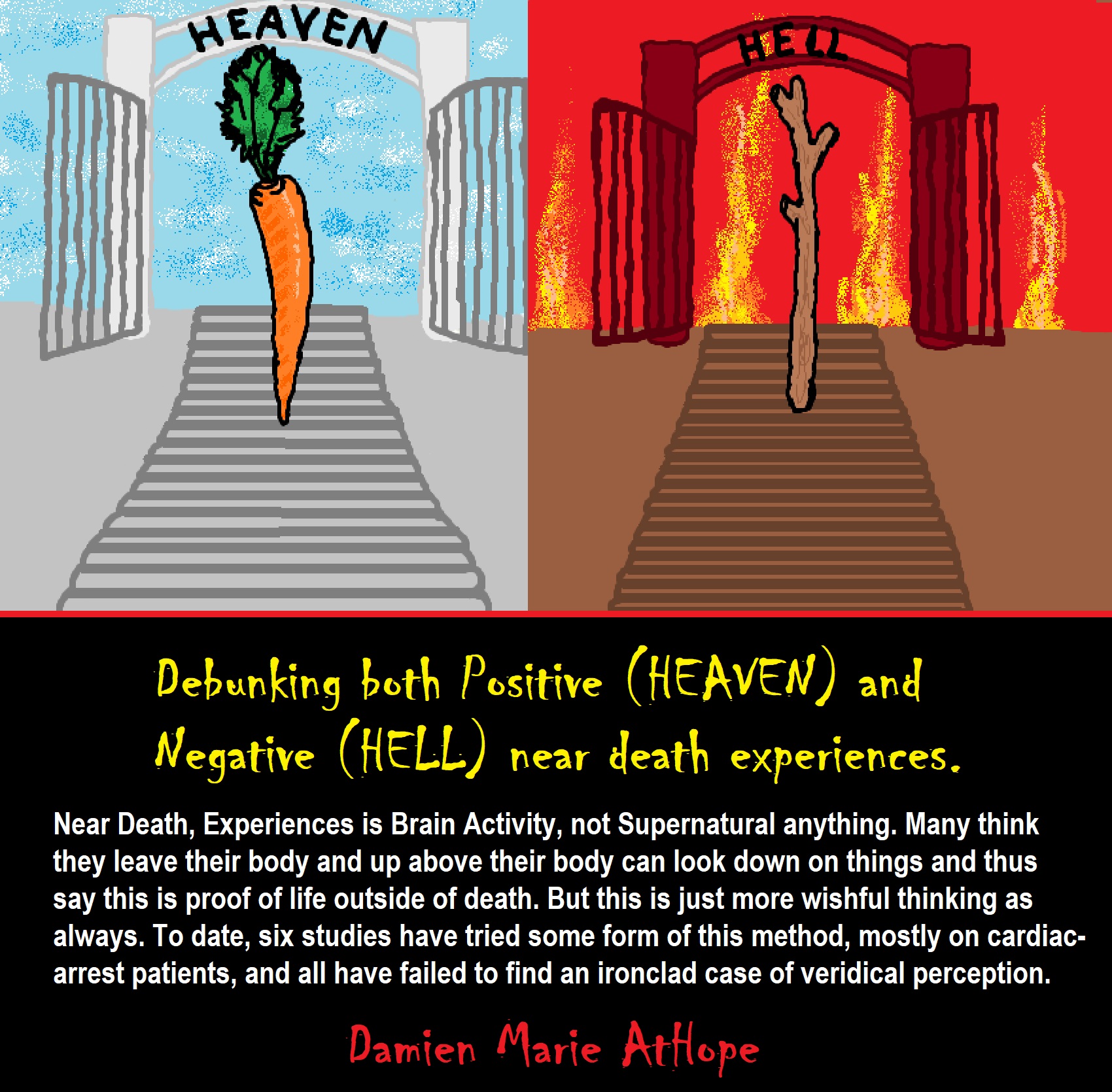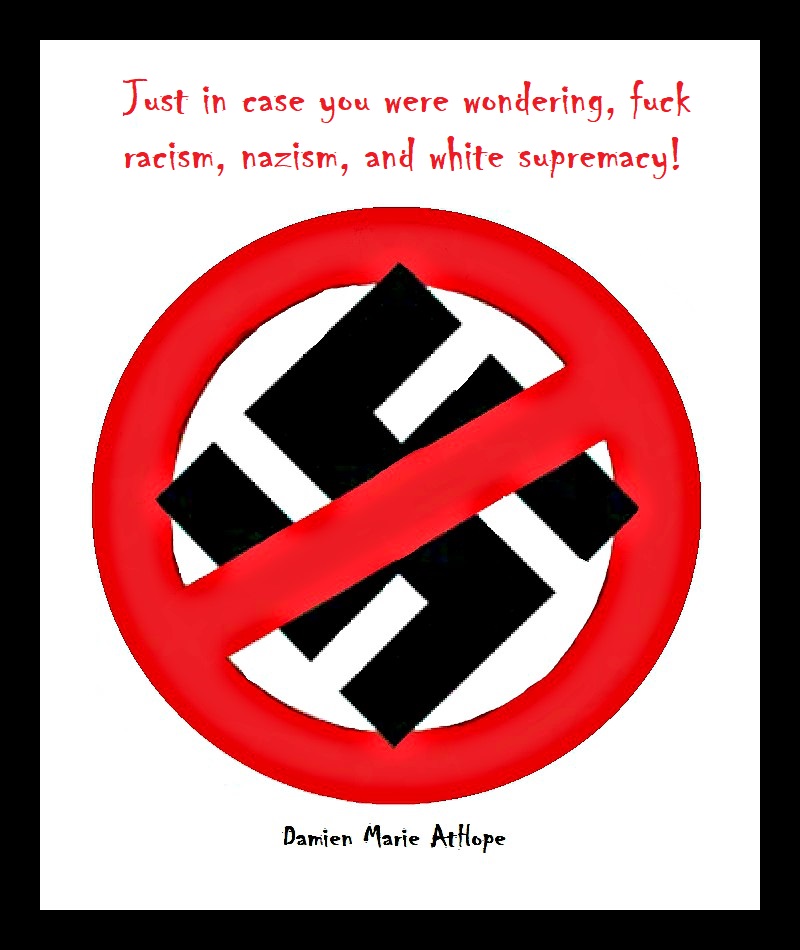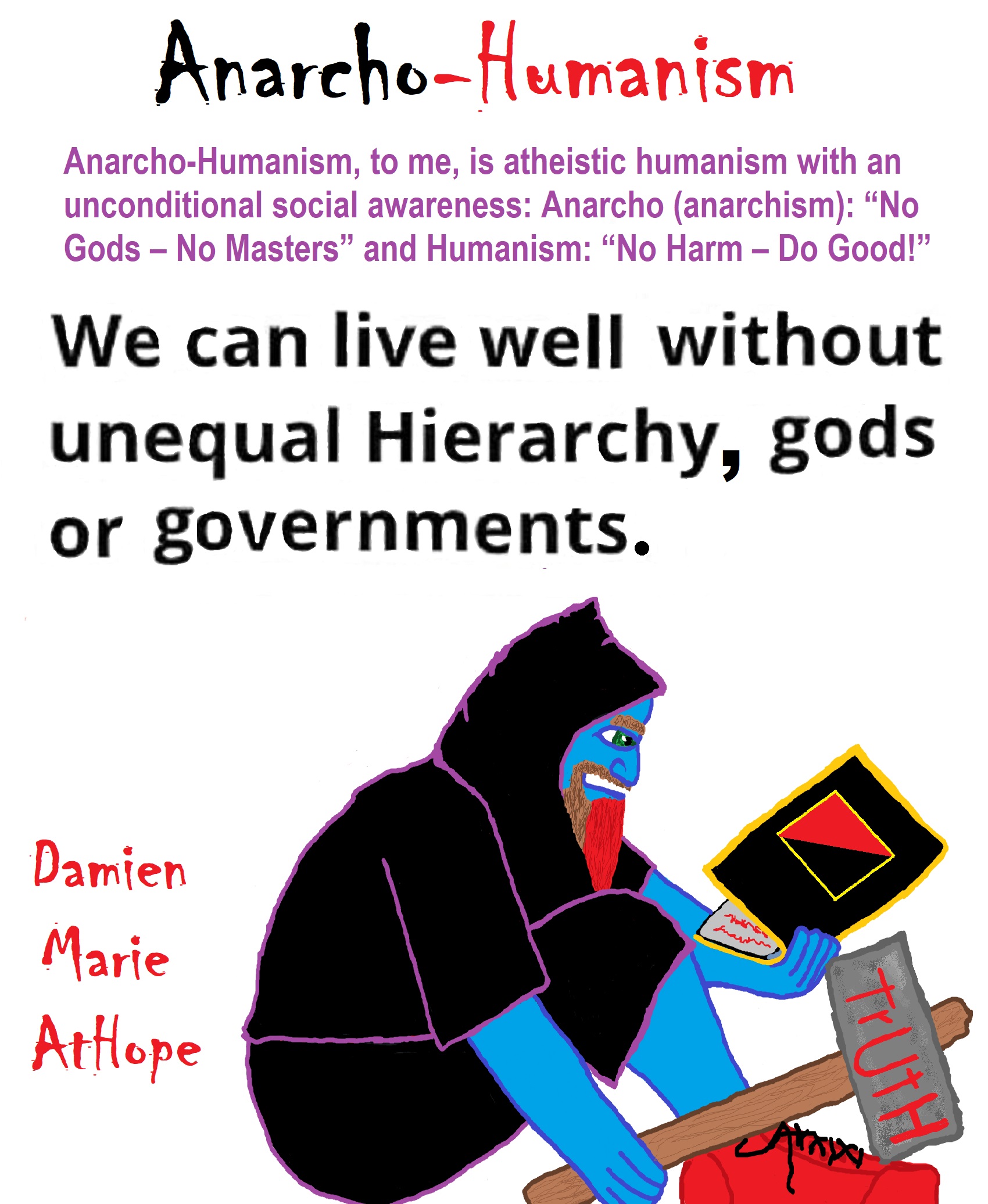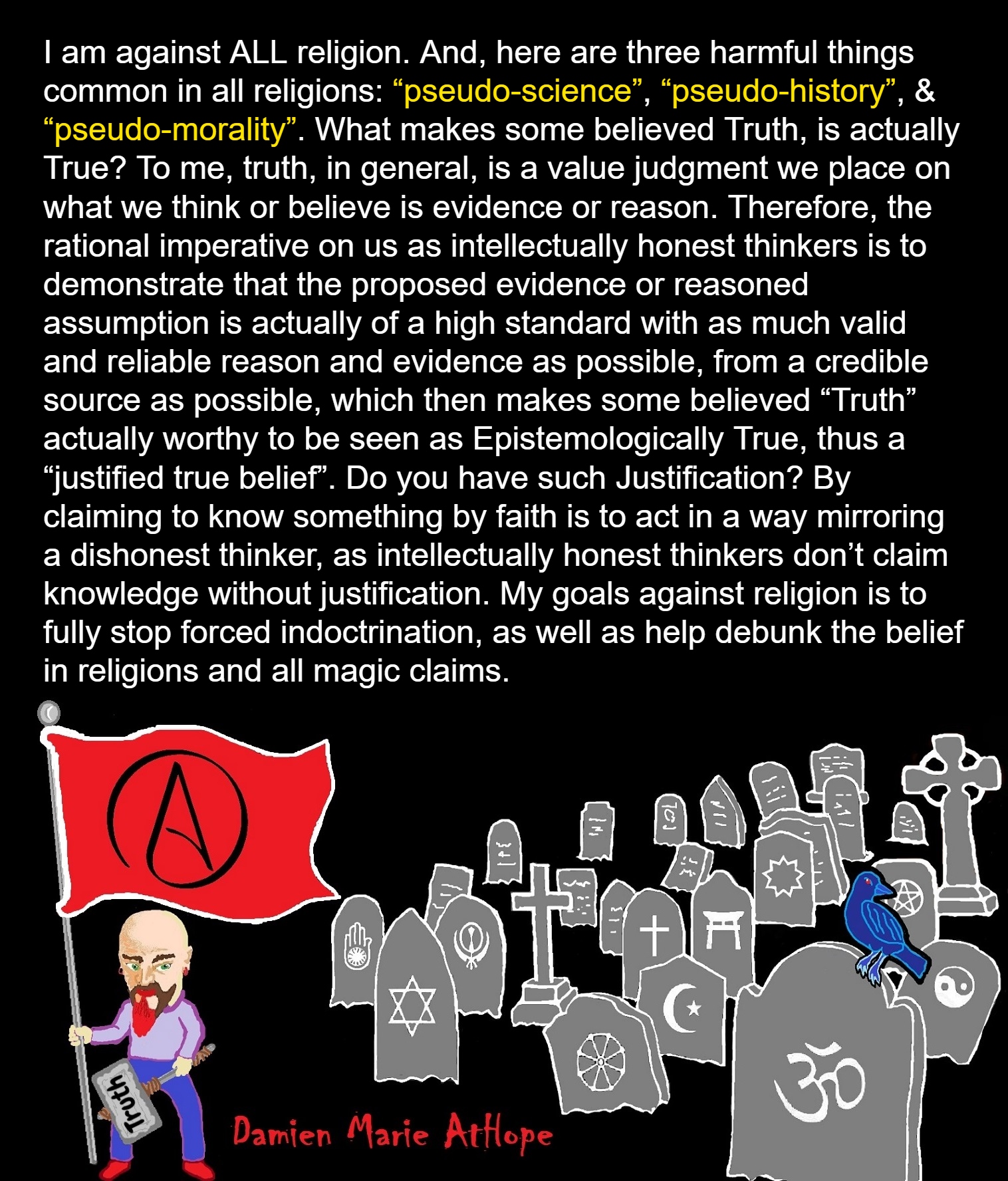The Civil War Was About Slavery.
Confederate Leaders Were Totally Clear On This.
By Julia Craven
Symbols of the Confederacy are an inescapable fact of life in Southern states. The Confederate flag is displayed prominently near the South Carolina statehouse, evoked in multiple Southern state flags, flown in frontyards, on T-shirts and off pickup trucks. And those who fought during the Civil War to maintain antebellum “traditions” are glorified relentlessly. A few days after a white shooter murdered nine black people attending Bible study at Emanuel African Methodist Episcopal Church in Charleston, South Carolina, apparently driven by the same sort of racial animus present in this history, the nation is having a conversation about how, or if, these Confederate tributes have a rightful place in society. This discussion has led some people to question if the Confederacy, and therefore the Civil War, was truly motivated by slavery. “But there are other difficult truths. Among them, when the war began, it was not explicitly a war to end slavery. … When hundreds of thousands of southern men took up arms (most of them non-slave-owning), many of them fought with the explicit belief that they were standing in the shoes of the Founding Fathers, men who’d exercised their own right of self-determination to separate from the mother Country,” wrote David French for National Review. “Others simply saw an invading army marching into their state — into their towns and across their farms — and chose to resist. And no one can doubt their valor.” Others have made similar attempts to explain away the significance of slavery to the war. But like accused shooter Dylann Roof, whose manifesto clearly outlined his hatred for black people and his desire to start a race war, Confederate states and leaders at the time unabashedly declared that the Civil War was about maintaining the institution of slavery and propping up a system of genocidal, white supremacist oppression. There’s nothing admirable about defending the Confederate legacy and its accompanying imagery. Yet many Americans are doing just that, often refusing to accept the role that Confederate pride and white hate played in the creation of these symbols (do a Twitter search and see for yourself). Let’s let the Southern states and their Civil War leaders speak for themselves. Ref
Many governments have been founded upon the principle of the subordination and serfdom of certain classes of the same race; such were and are in violation of the laws of nature. Our system commits no such violation of nature’s laws. With us, all of the white race, however high or low, rich or poor, are equal in the eye of the law. Not so with the negro. Subordination is his place. He, by nature, or by the curse against Canaan, is fitted for that condition which he occupies in our system. The architect, in the construction of buildings, lays the foundation with the proper material — the granite; then comes the brick or the marble. The substratum of our society is made of the material fitted by nature for it, and by experience we know that it is best, not only for the superior, but for the inferior race, that it should be so. It is, indeed, in conformity with the ordinance of the Creator. It is not for us to inquire into the wisdom of His ordinances, or to question them. For His own purposes, He has made one race to differ from another, as He has made “one star to differ from another star in glory. The great objects of humanity are best attained when there is conformity to His laws and decrees, in the formation of governments as well as in all things else. Our confederacy is founded upon principles in strict conformity with these laws.
Jefferson Davis, president of the Confederacy, cited slavery as the reason for going to war in 1861 and rallied in its defense until his death in 1889. His take on the Emancipation Proclamation, reiterated in his memoirs, is quite telling:
A proclamation, dated on January 1, 1863, signed and issued by the President of the United States, orders and declares all slaves within ten of the States of the Confederacy to be free, except such as are found in certain districts now occupied in part by the armed forces of the enemy. We may well leave it to the instinct of that common humanity, which a beneficent Creator has implanted in the breasts of our fellow-men of all countries, to pass judgment on a measure by which several millions of human beings of an inferior race — peaceful, contented laborers in their sphere — are doomed to extermination, while at the same time they are encouraged to a general assassination of their masters by the insidious recommendation “to abstain from violence, unless in necessary self-defense.”
The Confederate leaders couldn’t have been clearer about what they were fighting for.
But let’s not forget where “The Great Emancipator,” Abraham Lincoln, thought slavery fit into all this. Contrary to popular belief, he wasn’t an abolitionist, nor did he support social and political equality for black people. He voiced the primary goal of the war in a letter to abolitionist and publisher Horace Greeley.
“I would save the Union,” Lincoln wrote. As for enslaved Africans, they were just pawns in his war strategy: “If I could save the Union without freeing any slave, I would do it; and if could save it by freeing all the slaves, I would do it. … What I do about Slavery and the colored race, I do because I believe it helps to save this Union.” Ref
Adolf Hitler got a lot of his racist ideas from America, so it was the old USA that was the inspiration for actual Nazism…
People in America like to believe that the USA is usually the good guys, but history doesn’t often back that up.
“MAGAS have ruined the American flag for me. All their incredibly obnoxious, over-the-top use of it as a prop for their support of America’s most notorious traitor is despicable. They also wave it next to Nazi and Confederate flags, soiling it’s once-decent image. Disgusting.” – Michelle @Michell33650674
My response, American history ruined the flag for me. MAGAS only reminds me of the same kind of Americans that in America’s past committed the worst atrocities.
“Agreed.” – Michelle @Michell33650674

Genocide of Indigenous Peoples of the United States
“The genocide of Indigenous peoples, colonial genocide, or settler genocide is the intentional elimination of Indigenous peoples as a part of the process of colonialism. According to certain genocide experts, including Raphael Lemkin – the individual who coined the modern concept of genocide – colonization is intrinsically genocidal. Other scholars view genocide as associated with but distinct from settler colonialism. Lemkin saw genocide via colonialism as a two-stage process: (1) the destruction of the Indigenous group’s way of life, followed by (2) the settlers’ imposition of their way of life on the Indigenous group.” ref
“The expansion of various Western European colonial powers such as the British and Spanish empires and the subsequent establishment of colonies on Indigenous territories frequently involved acts of genocidal violence against Indigenous groups in Europe, the Americas, Africa, Asia, and Oceania. The designation of specific events as genocidal is frequently controversial. Some scholars, among them Lemkin, have argued that cultural genocide, sometimes called ethnocide, should also be recognized. Others scholars contend that genocide should be thought of exclusively in physical and biological terms according to the 1948 Genocide Convention, with cultural genocide being addressed as a human rights issue.” ref
“It is estimated that during the initial Spanish conquest of the Americas, up to eight million Indigenous people died, primarily through the spread of Afro-Eurasian diseases. Simultaneously, wars and atrocities waged by Europeans against native Americans also resulted in hundreds of thousands to millions of deaths. The population of Indigenous Americans is estimated to have decreased from approximately 145 million to around 7-15 million between the late 15th and late 17th centuries, representing a decline of around 90-95%.” ref
“Mistreatment and killing of Native Americans continued for centuries, in every area of the Americas, including the areas that would become Canada, the United States, Mexico, Argentina, Brazil, Paraguay, Chile. In the United States, some scholars (examples listed below) state that the American Indian Wars and the doctrine of manifest destiny contributed to the genocide, with one major event cited being the Trail of Tears.” ref
“In contrast, a 2019 book by Jeffrey Ostler at the University of Oregon has argued that genocide is not a majority viewpoint in the scholarship on the subject, and he writes that,
Since 1992, the argument for a total, relentless, and pervasive genocide in the Americas has become accepted in some areas of Indigenous studies and genocide studies. For the most part, however, this argument has had little impact on mainstream scholarship in U.S. history or American Indian history. Scholars are more inclined than they once were to gesture to particular actions, events, impulses, and effects as genocidal, but genocide has not become a key concept in scholarship in these fields.” ref
“Some scholars view the term ethnic cleansing as a more appropriate designation. As detailed in Ethnic Cleansing: The Crime That Should Haunt America, historian Gary Anderson insists that genocide does not apply to any of American history since “policies of mass murder on a scale similar to events in central Europe, Cambodia, or Rwanda were never implemented” but argues that ethnic cleansing occurred.” ref
“Historians and scholars whose work has examined this history in the context of genocide have included historian Jeffrey Ostler, historian David Stannard, anthropological demographer Russell Thornton (Cherokee Nation), historian Vine Deloria, Jr. (Standing Rock Dakota), as well as activists such as Russell Means (Oglala Lakota) and Ward Churchill. In his book, American Holocaust, Stannard compares the events of colonization in the Americas to the definition of genocide which is written in the 1948 UN convention, and he writes that,
In light of the U.N. language—even putting aside some of its looser constructions—it is impossible to know what transpired in the Americas during the sixteenth, seventeenth, eighteenth, and nineteenth centuries and not conclude that it was genocide.” ref
“Thornton describes the direct consequences of warfare, violence, and massacres as genocides, many of which had the effect of wiping out entire ethnic groups. Political scientist Guenter Lewy states that “even if up to 90 percent of the reduction in Indian population was the result of disease, that leaves a sizeable death toll caused by mistreatment and violence.” Ethnic studies professor Roxanne Dunbar-Ortiz states,
Proponents of the default position emphasize attrition by disease despite other causes equally deadly, if not more so. In doing so they refuse to accept that the colonization of America was genocidal by plan, not simply the tragic fate of populations lacking immunity to disease.” ref
“By 1900, the Indigenous population in the Americas declined by more than 80%, and by as much as 98% in some areas. The effects of diseases such as smallpox, measles, and cholera during the first century of colonialism contributed greatly to the death toll, while violence, displacement, and warfare against the Indians by colonizers contributed to the death toll in subsequent centuries. As detailed in American Philosophy: From Wounded Knee to the Present (2015),
It is also apparent that the shared history of the hemisphere is one which is framed by the dual tragedies of genocide and slavery, both of which are part of the legacy of the European invasions of the past 500 years. Indigenous people both north and south were displaced, died of disease, and were killed by Europeans through slavery, rape, and war. In 1491, about 145 million people lived in the western hemisphere. By 1691, the population of Indigenous Americans had declined by 90–95 percent, or by around 130 million people.” ref
“However, pre-Columbian population figures are difficult to estimate due to the fragmentary nature of the evidence. Estimates range from 8 to 112 million. Russel Thornton has pointed out that there were disastrous epidemics and population losses during the first half of the sixteenth century “resulting from incidental contact, or even without direct contact, as disease spread from one American Indian tribe to another.” Thornton has also challenged higher Indigenous population estimates, which are based on the Malthusian assumption that “populations tend to increase to, and beyond, the limits of the food available to them at any particular level of technology.” ref
“According to geographers from University College London, the colonization of the Americas by Europeans killed so many people, approximately 55 million or 90% of the local populations, it resulted in climate change and global cooling. UCL Geography Professor Mark Maslin, one of the co-authors of the study, states that the large death toll also boosted the economies of Europe: “the depopulation of the Americas may have inadvertently allowed the Europeans to dominate the world. It also allowed for the Industrial Revolution and for Europeans to continue that domination.” ref
“It has proven a controversial question whether the drastic population decline can be considered an example of genocide, and scholars have argued whether the process as a whole or specific periods and local processes qualify under the legal definition. Raphael Lemkin, the originator of the term “genocide”, considered the colonial replacement of Native Americans by English and later British colonists to be one of the historical examples of genocide.” ref
Indian removal
“Indian removal was the United States government policy of forced displacement of self-governing tribes of Native Americans from their ancestral homelands in the eastern United States to lands west of the Mississippi River – specifically, to a designated Indian Territory (roughly, present-day Oklahoma). The Indian Removal Act, the key law which authorized the removal of Native tribes, was signed by Andrew Jackson in 1830. Although Jackson took a hard line on Indian removal, the law was enforced primarily during the Martin Van Buren administration. After the enactment of the Indian Removal Act in 1830, approximately 60,000 members of the Cherokee, Muscogee (Creek), Seminole, Chickasaw, and Choctaw nations (including thousands of their black slaves) were forcibly removed from their ancestral homelands, with thousands dying during the Trail of Tears.” ref
“Indian removal, a popular policy among incoming settlers, was a consequence of actions by European settlers in North America during the colonial period and then by the United States government (and its citizens) until the mid-20th century. The policy traced its origins to the administration of James Monroe, although it addressed conflicts between European and Native Americans which had occurred since the 17th century and were escalating into the early 19th century (as European settlers pushed westward in the cultural belief of manifest destiny). Historical views of Indian removal have been reevaluated since that time. Widespread contemporary acceptance of the policy, due in part to the popular embrace of the concept of manifest destiny, has given way to a more somber perspective. Historians have often described the removal of Native Americans as paternalism, ethnic cleansing, or genocide.” ref
“When Andrew Jackson became president of the United States in 1829, his government took a hard line on Indian removal; Jackson abandoned his predecessors’ policy of treating Indian tribes as separate nations, aggressively pursuing all Indians east of the Mississippi who claimed constitutional sovereignty and independence from state laws. They were to be removed to reservations in Indian Territory, west of the Mississippi (present-day Oklahoma), where they could exist without state interference. At Jackson’s request, Congress began a debate on an Indian-removal bill. After fierce disagreement, the Senate passed the bill by a 28–19 vote; the House had narrowly passed it, 102–97. Jackson signed the Indian Removal Act into law on May 30, 1830.” ref
“That year, most of the Five Civilized Tribes—the Chickasaw, Choctaw, Creek, Seminole, and Cherokee—lived east of the Mississippi. The Indian Removal Act implemented federal-government policy towards its Indian populations, moving Native American tribes east of the Mississippi to lands west of the river. Although the act did not authorize the forced removal of indigenous tribes, it enabled the president to negotiate land-exchange treaties.” ref
“Native groups reshaped their governments, made constitutions and legal codes, and sent delegates to Washington to negotiate policies and treaties to uphold their autonomy and ensure federally-promised protection from the encroachment of states. They thought that acclimating, as the U.S. wanted them to, would stem removal policy and create a better relationship with the federal government and surrounding states.” ref
“Native American nations had differing views about removal. Although most wanted to remain on their native lands and do anything possible to ensure that, others believed that removal to a nonwhite area was their only option to maintain their autonomy and culture. The U.S. used this division to forge removal treaties with (often) minority groups who became convinced that removal was the best option for their people. These treaties were often not acknowledged by most of a nation’s people. When Congress ratified the removal treaty, the federal government could use military force to remove Native nations if they had not moved (or had begun moving) by the date stipulated in the treaty.” ref
United States–Native American treaties
“From 1778 to 1871, the United States government entered into more than 500 treaties with the Native American tribes; all of these treaties have since been violated in some way or outright broken by the United States government, with Native Americans and First Nations peoples still fighting for their treaty rights in federal courts and at the United Nations. In addition to treaties, which are ratified by the U.S. Senate and signed by the U.S. President, there were also Acts of Congress and Executive Orders which dealt with land agreements.” ref
“The U.S. military and representatives of a tribe, or sub unit of a tribe, signed documents which were understood at the time to be treaties, rather than armistices, ceasefires and truces.
- The entries from 1784 to 1895 were initially created by information gathered by Charles C. Royce and published in the U.S. Serial Set, Number 4015, 56th Congress, 1st Session, in 1899. The purpose of the Schedule of Indian Land Cessions was to indicate the location of each cession by, or reservation for the Indian Tribes. Royce’s column headings are titled: “Date, Where or how concluded, Reference, Tribe, Description of cession or reservation, historical data, and remarks, Designation of cession on map, Number, Location.” ref
“The Ratified Indian Treaties that were transferred from the U.S. State Department to the National Archives were recently conserved and imaged for the first time, and in 2020 made available online with additional context at the Indigenous Digital Archive’s Treaties Explorer, or DigiTreaties.org.” ref
Trail of Broken Treaties
“The Trail of Broken Treaties (also known as the Trail of Broken Treaties Caravan and the Pan American Native Quest for Justice) was a 1972 cross-country caravan of American Indian and First Nations organizations that started on the West Coast of the United States and ended at the Department of Interior headquarters building at the US capital of Washington, D.C. Participants called for the restoration of tribes’ treaty-making authority, the abolition of the Bureau of Indian Affairs, and federal investment in jobs, housing, and education. The protest inspired sizable gatherings of Native Americans throughout the journey, with the caravan described as “over four miles long and included some 700 activists from more than 200 tribes and 25 states” when it departed St Paul, Minnesota, for Washington, D.C.” ref
“The eight organizations that sponsored the caravan included the American Indian Movement (AIM), the Canadian National Indian Brotherhood (later renamed the Assembly of First Nations), the Native American Rights Fund, the National Indian Youth Council, the National American Indian Council, the National Council on Indian Work, National Indian Leadership Training, and the American Indian Committee on Alcohol and Drug Abuse. In Minneapolis, AIM headquarters, activists developed a Twenty-Point Position paper to define their demands.” ref
“Land Back, also referred to with hashtag #LandBack, is a decentralized campaign that emerged in the late 2010s among Indigenous Australians, Indigenous peoples in Canada, Native Americans in the United States, other indigenous peoples, and allies who seek to reestablish Indigenous sovereignty, with political and economic control of their ancestral lands. Activists have also used the Land Back framework in Mexico, and scholars have applied it in New Zealand and Fiji. Land Back is part of a broader Indigenous movement for decolonisation.” ref
“Land Back aims to reestablish Indigenous political authority over territories that Indigenous tribes claim by treaty. Scholars from the Indigenous-run Yellowhead Institute at Toronto Metropolitan University describe it as a process of reclaiming Indigenous jurisdiction. The NDN Collective describes it as synonymous with decolonisation and dismantling white supremacy. Land Back advocates for Indigenous rights, preserves languages and traditions, and works toward food sovereignty, decent housing, and a clean environment.” ref
“Land Back was introduced in 2018 by Arnell Tailfeathers, a member of the Blood Tribe, a nation within the Blackfoot Confederacy. It then quickly became a hashtag (#LandBack), and now appears in artwork, on clothes and in beadwork. These creations are often used to raise funds to support water protectors and land defenders who protest against oil pipelines in North America. The Black Hills land claim and protests at Mount Rushmore during Donald Trump’s 2020 presidential campaign was a catalyzing moment for the movement in the United States.” ref
Racism in the United States
“Racism has been reflected in discriminatory laws, practices, and actions (including violence) against “racial” or ethnic groups throughout the history of the United States. Since the early colonial era, White Americans have generally enjoyed legally or socially sanctioned privileges and rights which have been denied to members of various ethnic or minority groups at various times. European Americans have enjoyed advantages in matters of education, immigration, voting rights, citizenship, land acquisition, and criminal procedure.” ref
“Before 1865, most African Americans were enslaved; after the abolition of slavery, they have faced severe restrictions on their political, social, and economic freedoms. Native Americans have suffered genocide, forced removals, and massacres, and they continue to face discrimination. European Americans, Hispanics, Middle Eastern and Asian Americans along with Pacific Islanders have also been the victims of discrimination. In addition, non-Protestant immigrants from Europe, particularly Jews, Slavs, Italians, and the Irish were often subjected to xenophobic exclusion and other forms of ethnicity-based discrimination.” ref
“Racism has manifested itself in a variety of ways, including ethnic conflicts, genocide, slavery, lynchings, segregation, Native American reservations, boarding schools, racist immigration and naturalization laws, and internment camps. Formal racial discrimination was largely banned by the mid-20th century and over time, coming to be perceived as socially and morally unacceptable. Racial politics remains a major phenomenon, and racism continues to be reflected in socioeconomic inequality. Into the 21st century, research has uncovered extensive evidence of racial discrimination in various sectors of modern U.S. society, including the criminal justice system, business, the economy, housing, health care, the media, and politics. In the view of the United Nations and the U.S. Human Rights Network, “discrimination in the United States permeates all aspects of life and extends to all communities of color.” ref
“Native Americans have inhabited the North American continent for at least 10,000 years, and millions of Native Americans lived in the region composing the modern-day United States prior to European colonization. Both during and after the colonial period of American history, white settlers waged a long series of wars against Native Americans with the aim of displacing them and colonizing their lands. Many Native Americans were enslaved as a result of these wars, while others were forcibly assimilated into the culture of the white settlers.” ref
“During the 19th century, the desire to forcibly remove certain Native American nations gained momentum. However, some Native Americans either chose to or were allowed to remain on their land, and as a result, they avoided removal, but thereafter, the federal government treated them in a racist manner. The Choctaws in Mississippi described their situation in 1849, “we have had our habitations torn down and burned, our fences destroyed, cattle turned into our fields, and we ourselves have been scourged, manacled, fettered and otherwise personally abused, until by such treatment some of our best men have died.” According to Charles Hudson, Joseph B. Cobb, who moved to Mississippi from Georgia, described the Choctaws as having “no nobility or virtue at all, and in some respects he found blacks, especially native Africans, to be more interesting and admirable, the red man’s superior in every way. The Choctaw and Chickasaw, the tribes he knew best, were beneath contempt; that is, even worse than black slaves.” ref
“In the 1800s, ideologies such as manifest destiny, which held the view that the United States was destined to expand from coast to coast on the North American continent, fueled U.S. attacks against, and maltreatment of, Native Americans. In the years leading up to the Indian Removal Act of 1830 there were many armed conflicts between white settlers and Native Americans. A justification for the conquest and subjugation of indigenous people emanated from the stereotyped perception that Native Americans were “merciless Indian savages” (as described in the United States Declaration of Independence). Sam Wolfson in The Guardian writes, “The declaration’s passage has often been cited as an encapsulation of the dehumanizing attitude toward indigenous Americans that the US was founded on.” Simon Moya-Smith, culture editor at Indian Country Today, states, “Any holiday that would refer to my people in such a repugnant, racist manner is certainly not worth celebrating. [July Fourth] is a day when we celebrate our resiliency, our culture, our languages, our children and we mourn the millions – literally millions – of indigenous people who have died as a consequence of American imperialism.” ref
“In Martin Luther King Jr.‘s book Why We Can’t Wait, he wrote, “Our nation was born in genocide when it embraced the doctrine that the original American, the Indian, was an inferior race.” In 1861, residents of Mankato, Minnesota, formed the Knights of the Forest, with the goal of ‘eliminating all Indians from Minnesota.’ An egregious attempt occurred with the California gold rush, the first two years of which saw the death of thousands of Native Americans. Under Mexican rule in California, Indians were subjected to de facto enslavement under a system of peonage by the white elite. While in 1850, California formally entered the Union as a free state, with respect to the issue of slavery, the practice of Indian indentured servitude was not outlawed by the California Legislature until 1863. The 1864 deportation of the Navajos by the U.S. government occurred when 9,000 Navajos were forcibly relocated to an internment camp in Bosque Redondo, where, under armed guards, up to 3,500 Navajo and Mescalero Apache men, women, and children died from starvation and disease over the next 4 years.” ref
“Native American nations on the plains in the west continued armed conflicts with the U.S. throughout the 19th century, through what were called generally Indian Wars. Notable conflicts in this period include the Dakota War, Great Sioux War, Snake War, and Colorado War. In the years leading up to the Wounded Knee massacre the U.S. government had continued to seize Lakota lands. A Ghost Dance ritual on the Northern Lakota reservation at Wounded Knee, South Dakota, led to the U.S. Army’s attempt to subdue the Lakota. The dance was part of a religion founded by Wovoka that told of the return of the Messiah to relieve the suffering of Native Americans and promised that if they would live righteous lives and perform the Ghost Dance properly, the European American invaders would vanish, the bison would return, and the living and the dead would be reunited in an Edenic world. On December 29, 1890, at Wounded Knee, gunfire erupted, and U.S. soldiers killed up to 300 Indians, mostly old men, women and children.” ref
“During the period surrounding the 1890 Wounded Knee Massacre, author L. Frank Baum wrote two editorials about Native Americans. Five days after the killing of the Lakota Sioux holy man, Sitting Bull, Baum wrote, “The proud spirit of the original owners of these vast prairies inherited through centuries of fierce and bloody wars for their possession, lingered last in the bosom of Sitting Bull. With his fall the nobility of the Redskin is extinguished, and what few are left are a pack of whining curs who lick the hand that smites them. The Whites, by the law of conquest, by a justice of civilization, are masters of the American continent, and the best safety of the frontier settlements will be secured by the total annihilation of the few remaining Indians. Why not annihilation? Their glory has fled, their spirit broken, their manhood effaced; better that they die than live the miserable wretches that they are.” ref
“Following the December 29, 1890, massacre, Baum wrote, “The Pioneer has before declared that our only safety depends upon the total extermination [sic] of the Indians. Having wronged them for centuries we had better, in order to protect our civilization, follow it up by one more wrong and wipe these untamed and untamable creatures from the face of the earth. In this lies safety for our settlers and the soldiers who are under incompetent commands. Otherwise, we may expect future years to be as full of trouble with the redskins as those have been in the past.” ref
“Once their territories were incorporated into the United States, surviving Native Americans were denied equality before the law and often treated as wards of the state. Many Native Americans were moved to reservations—constituting 4% of U.S. territory. In a number of cases, treaties signed with Native Americans were violated. Tens of thousands of American Indians and Alaska Natives were forced to attend a residential school system which sought to reeducate them in white-settler American values, culture, and economy.” ref
“Further dispossession of various kinds continues into the present, although these current dispossessions, especially in terms of land, rarely make major news headlines in the country (e.g., the Lenape people’s recent fiscal troubles and subsequent land grab by the State of New Jersey), and sometimes even fail to make it to headlines in the localities in which they occur. Through concessions for industries such as oil, mining, and timber and through division of land from the General Allotment Act forward, these concessions have raised problems of consent, exploitation of low royalty rates, environmental injustice, and gross mismanagement of funds held in trust, resulting in the loss of $10–40 billion.” ref
“The Worldwatch Institute notes that 317 reservations are threatened by environmental hazards, while Western Shoshone land has been subjected to more than 1,000 nuclear explosions. However, the last known nuclear explosion testing in the United States occurred in September 1992. American Indian boarding schools, were established in the United States during the 19th and lasted through the mid-20th centuries with the primary objective of assimilating Native Americans into the dominant White American culture. The effect of these schools has been described as forced assimilation against Native peoples.” ref
“In these schools, Native children were prohibited from participating in any of their cultures’ traditions, including speaking their own languages. Instead, they were required to speak English at all times and learn geography, science, and history (among other disciplines) as white Americans saw fit. This meant learning a version of history that upheld whites’ superiority and rightful “inheritance” of the lands of the United States, while Natives were relegated to a position of having to assimilate to white culture without ever truly being considered equals.” ref
“Between 1626 and 1860, the Atlantic slave trade brought more than 470,000 enslaved Africans to what is now the United States. White European Americans who participated in the slave industry tried to justify their economic exploitation of Black people by creating a “scientific” theory of white superiority and Black inferiority. One such slave owner was Thomas Jefferson, and it was his call for science to determine the obvious “inferiority” of Blacks that is regarded as “an extremely important stage in the evolution of scientific racism.” He concluded that Blacks were “inferior to the whites in the endowments of body and mind.” ref
“After the importation of slaves into the United States was outlawed by federal law from 1808, the domestic slave trade was expanded in an attempt to replace it. Maryland and Virginia, for example, would “export” their surplus slaves to the South. These sales of slaves broke up many families, with historian Ira Berlin writing that whether slaves were directly uprooted or lived in fear that they or their families would be involuntarily moved, “the massive deportation traumatized black people.” During the 1820s and 1830s, the American Colonization Society established the colony of Liberia and persuaded thousands of free Black Americans to move there because many members of the white elite both in the North and the South saw them as a problem to be got rid of.” ref
“Even figures, such as Abraham Lincoln, who opposed slavery showed ingrained racist attitudes. Lincoln said during the Fourth Lincoln-Douglas debate held in Charleston, Illinois, on September 18, 1858: “I am not, nor ever have been, in favor of bringing about in any way the social and political equality of the white and black races, [applause]-that I am not nor ever have been in favor of making voters or jurors of negroes, nor of qualifying them to hold office, nor to intermarry with white people; and I will say in addition to this that there is a physical difference between the white and black races which I believe will forever forbid the two races living together on terms of social and political equality. And inasmuch as they cannot so live, while they do remain together there must be the position of superior and inferior, and I as much as any other man am in favor of having the superior position assigned to the white race.” ref
“Both during and immediately after the American Civil War, about four million enslaved African Americans were set free, major legal actions included President Lincoln‘s Emancipation Proclamation which came into effect on January 1, 1863, and the Thirteenth Amendment to the United States Constitution which finally abolished slavery in December 1865. After the Civil War, the Reconstruction Era was characterized by the passage of federal legislation which was designed to protect the rights of the formerly enslaved people, including the Civil Rights Act of 1866 and the Civil Rights Act of 1875. The Fourteenth amendment granted full citizenship to African Americans, and the Fifteenth amendment guaranteed the voting rights of African-American men (see Reconstruction Amendments).” ref
“Despite this, white supremacists came to power in all Southern states, by intimidating Black voters with the assistance of terrorist groups like the Ku Klux Klan, the Red Shirts, and the White League. “Black Codes” and Jim Crow laws deprived African Americans of voting rights and other civil liberties by instituting systemic and discriminatory policies of unequal racial segregation. Segregated facilities extended from white-only schools to white-only graveyards. Anti-miscegenation laws forbade marriage and even sex between whites and non-whites. In the late 19th century and early 20th century, ethnic tensions commonly existed between Austrian immigrants and African-Americans with long-rooted family histories in the United States, and racism and racist policies against non-white workers were often contributed to by Austrians.” ref
“The new century saw a hardening of institutionalized racism and legal discrimination against citizens of African descent in the United States. Throughout the post-Civil War period, racial stratification was informally and systemically enforced, to solidify the pre-existing social order. Although their vote was guaranteed by the 15th Amendment, poll taxes, pervasive acts of terrorism such as lynchings (often perpetrated by hate groups such as the Ku Klux Klan), and discriminatory laws such as grandfather clauses kept Black Americans disenfranchised in most Southern states. In response to de jure racism, protest and lobbyist groups emerged, most notably, the NAACP (National Association for the Advancement of Colored People) in 1909.” ref
“This era is sometimes referred to as the nadir of American race relations because racism, segregation, racial discrimination, and expressions of white supremacy all increased. So did anti-Black violence, including race riots such as the Atlanta race riot of 1906, the Elaine massacre of 1919, the Tulsa race massacre of 1921, the Perry massacre of 1922, and the Rosewood massacre of 1923. The Atlanta riot was characterized as a “racial massacre of negroes” by the French newspaper Le Petit Journal. The Charleston News and Courier wrote in response to the Atlanta riots: “Separation of the races is the only radical solution of the negro problem in this country. There is nothing new about it. It was the Almighty who established the bounds of the habitation of the races. The negroes were brought here by compulsion; they should be induced to leave here by persuasion.” ref
“Additionally, racism, which had previously been considered a problem which primarily existed in the Southern states, burst onto the nation’s consciousness following the Great Migration, the relocation of millions of African Americans from their roots in the rural Southern states to the industrial centers of the North and West between 1910 and 1970.” ref
Slavery in the Americas
“Enslaved Indigenous people were essential to the commercial and diplomatic survival and development of colonial Louisiana—specifically Lower Louisiana, or Basse-Louisiane, which includes the modern-day states of Arkansas, Louisiana, Mississippi, and Alabama—from 1699 to 1803. Although officially banned by the French and Spanish and with numbers never registering more than a few hundred, enslaved Indigenous people and the system that produced them formed an integral component of Indigenous-European relations throughout the life of the colony. Indigenous people were exploited alongside enslaved African peoples as domestic and agricultural laborers, guides, interpreters, hunters, sexual companions, and wives.” ref
“Precedents for enslaving Indigenous peoples in Lower Louisiana existed in Upper Louisiana, or Haute-Louisiane (which includes much of the modern-day midwestern United States), and Canada. The exigencies of local conditions throughout colonial Louisiana often demanded that Europeans work within preexisting Indigenous captive-taking traditions. This meant Indigenous peoples often came into European possession as war captives from allied and hostile Indigenous nations both within and from outside the colony. French and Spanish methods for acquiring captives contrasted sharply with those employed by the English Atlantic colonies, which were active in the Indigenous slave trade from the mid-seventeenth century until the Yamasee War (1715–1717) compelled their gradual disassociation from the practice. Nearly two-thirds of enslaved Indigenous people that were traded or given to the French and Spanish were women and children. New social identities were created when sexual unions between European men and Indigenous women, or métissage, produced children. These offspring could remain enslaved or be incorporated into French and Spanish society.” ref
“Indigenous slavery is understood to encompass the forcible capture and subsequent subjugation and exchange of Indigenous peoples without their consent both before and after a sustained and significant European colonial presence was established on the North American continent by the early seventeenth century. Captives both before and after the arrival of Europeans could anticipate a spectrum of experiences that might also include adoption into the Indigenous captor’s clan—a unilineal kinship group where members saw themselves as blood relatives. Different from enslavement, adoption brought the consequent benefits and rights of kinship to the captive while enhancing the captor’s clan by replacing a member that had died either in battle or from disease. Although captive taking, slavery, and other forms of physical coercion existed in Indigenous societies prior to contact, European market demand for labor and periodic desires for retribution against enemies (Indigenous and European alike), encouraged the hyper-expansion of warlike practices among Indigenous peoples in the Americas. The resultant spiral of violence and upheaval between and among dozens of Indigenous societies spread across much of eastern North America from 1650 to 1730, creating vast regions of sociopolitical instability and dislocation in what anthropologist Robbie Ethridge has described as the “Mississippian shatter zone.” This “shatter zone” had geographic limits, and French Louisiana formed its western edge. Conservative estimates reckon that hundreds of Indigenous towns were destroyed, and tens of thousands of Indigenous people from the Great Lakes to the Gulf Coast and from the Atlantic Coast to the Mississippi River lost their lives and freedom during this period of intense enslavement, disease, and warfare.” ref
“While European colonization was a set of circumstances and economic forces that could often be destructive to traditional Indigenous lifeways, it could also be culturally restorative and produce political innovations. The Indigenous political arrangements that emerged in response to the violence of the Indigenous slave trade were more resilient and shaped European North America for much of the eighteenth century. Often formed by the joining of people from the splintered remains of larger, more complex communities, these coalescent societies simultaneously drew upon and deviated from precontact political and social institutions in ways that helped them transition into potent adversaries to one another and to European colonizers. The Creek and Caddo confederacies, Choctaws, Cherokees, and Chickasaws represent examples of coalescent societies that selectively integrated elements from their Mississippian chiefdom past that still exist today.” ref
“Slavery among Native Americans in the United States includes slavery by and enslavement of Native Americans roughly within what is currently the United States of America. Tribal territories and the slave trade ranged over present-day borders. Some Native American tribes held war captives as slaves prior to and during European colonization. Some Native Americans were captured and sold by others into slavery to Europeans, while others were captured and sold by Europeans themselves. In the late 18th and 19th centuries, a small number of tribes, such as the five so-called “civilized tribes“, began increasing their holding of African-American slaves. European contact greatly influenced slavery as it existed among pre-contact Native Americans, particularly in scale. As they raided other tribes to capture slaves for sales to Europeans, they fell into destructive wars among themselves, and against Europeans.” ref
“Many Native-American tribes practiced some form of slavery before the European introduction of African slavery into North America. The Haida and Tlingit Indians who lived along the southeastern Alaskan coast were traditionally known as fierce warriors and slave-traders, raiding as far as California. Slavery was hereditary after slaves were taken as prisoners of war. Among some Pacific Northwest tribes, about a quarter of the population were slaves. Other slave-owning tribes of North America were, for example, Comanche of Texas, Creek of Georgia, the fishing societies, such as the Yurok, that lived along the coast from what is now Alaska to California; the Pawnee, and Klamath.” ref
“Some tribes held people as captive slaves late in the 19th century. For instance, “Ute Woman”, was a Ute captured by the Arapaho and later sold to a Cheyenne. She was kept by the Cheyenne to be used as a prostitute to serve American soldiers at Cantonment in the Indian Territory. She lived in slavery until about 1880. She died of a hemorrhage resulting from “excessive sexual intercourse.” There were differences between slavery as practiced in the pre-colonial era among Native Americans and slavery as practiced by Europeans after colonization. Whereas many Europeans eventually came to look upon slaves of African descent as being racially inferior, Native Americans took slaves from other Native American groups, and therefore viewed them as ethnically inferior.” ref
“In some cases, Native American slaves were allowed to live on the fringes of Native American society until they were slowly integrated into the tribe. The word “slave” may not accurately apply to such captive people. When the Europeans made contact with the Native Americans, they began to participate in the slave trade. Native Americans, in their initial encounters with the Europeans, attempted to use their captives from enemy tribes as a “method of playing one tribe against another” in an unsuccessful game of divide and conquer.” ref
“The legal institution of human chattel slavery, comprising the enslavement primarily of Africans and African Americans, was prevalent in the United States of America from its founding in 1776 until 1865, predominantly in the South. Slavery was established throughout European colonization in the Americas. From 1526, during the early colonial period, it was practiced in what became Britain’s colonies, including the Thirteen Colonies that formed the United States. Under the law, an enslaved person was treated as property that could be bought, sold, or given away. Slavery lasted in about half of U.S. states until abolition in 1865, and issues concerning slavery seeped into every aspect of national politics, economics, and social custom. In the decades after the end of Reconstruction in 1877, many of slavery’s economic and social functions were continued through segregation, sharecropping, and convict leasing.” ref
“By the time of the American Revolutionary War (1775–1783), the status of enslaved people had been institutionalized as a racial caste associated with African ancestry. During and immediately following the Revolution, abolitionist laws were passed in most Northern states and a movement developed to abolish slavery. The role of slavery under the United States Constitution (1789) was the most contentious issue during its drafting. Although the creators of the Constitution never used the word “slavery”, the final document, through the Three-Fifths Clause, gave slave owners disproportionate political power by augmenting the congressional representation and the Electoral College votes of slaveholding states. The Fugitive Slave Clause of the Constitution—Article IV, Section 2, Clause 3—provided that, if a slave escaped to another state, the other state had to return the slave to his or her master. This clause was implemented by the Fugitive Slave Act of 1793, passed by Congress.” ref
“All Northern states had abolished slavery in some way by 1805; sometimes with completion at a future date, sometimes with an intermediary status of unpaid indentured servant. Abolition was in many cases a gradual process; a few hundred people were enslaved in the Northern states as late as the 1840 census. Some slaveowners, primarily in the Upper South, freed their slaves, and philanthropists and charitable groups bought and freed others. The Atlantic slave trade was outlawed by individual states beginning during the American Revolution. The import trade was banned by Congress in 1808, the earliest date the Constitution permitted (Article 1, Section 9), although smuggling was common thereafter. It has been estimated that before 1820 a majority of serving congressmen owned slaves, and that about 30 percent of congressmen who were born before 1840 (some of whom served into the 20th century) at some time in their lives, were owners of slaves.” ref
“The rapid expansion of the cotton industry in the Deep South after the invention of the cotton gin greatly increased demand for slave labor, and the Southern states continued as slave societies. The United States, divided into slave and free states, became ever more polarized over the issue of slavery. Driven by labor demands from new cotton plantations in the Deep South, the Upper South sold more than a million slaves who were taken to the Deep South. The total slave population in the South eventually reached four million. As the United States expanded, the Southern states attempted to extend slavery into the new Western territories to allow proslavery forces to maintain their power in Congress. The new territories acquired by the Louisiana Purchase and the Mexican Cession were the subject of major political crises and compromises. By 1850, the newly rich, cotton-growing South was threatening to secede from the Union, and tensions continued to rise. Bloody fighting broke out over slavery in the Kansas Territory. Slavery was defended in the South as a “positive good”, and the largest religious denominations split over the slavery issue into regional organizations of the North and South.” ref
“When Abraham Lincoln won the 1860 election on a platform of halting the expansion of slavery, seven slave states seceded to form the Confederacy. Shortly afterward, on April 12, 1861, the Civil War began when Confederate forces attacked the U.S. Army’s Fort Sumter in Charleston, South Carolina. Four additional slave states then joined the Confederacy after Lincoln, on April 15, called forth in response and called up the militia to suppress the rebellion. During the war some jurisdictions abolished slavery and, due to Union measures such as the Confiscation Acts and the Emancipation Proclamation, the war effectively ended slavery in most places. After the Union victory, the Thirteenth Amendment to the United States Constitution was ratified on December 6, 1865, prohibiting “slavery [and] involuntary servitude, except as a punishment for crime.” ref

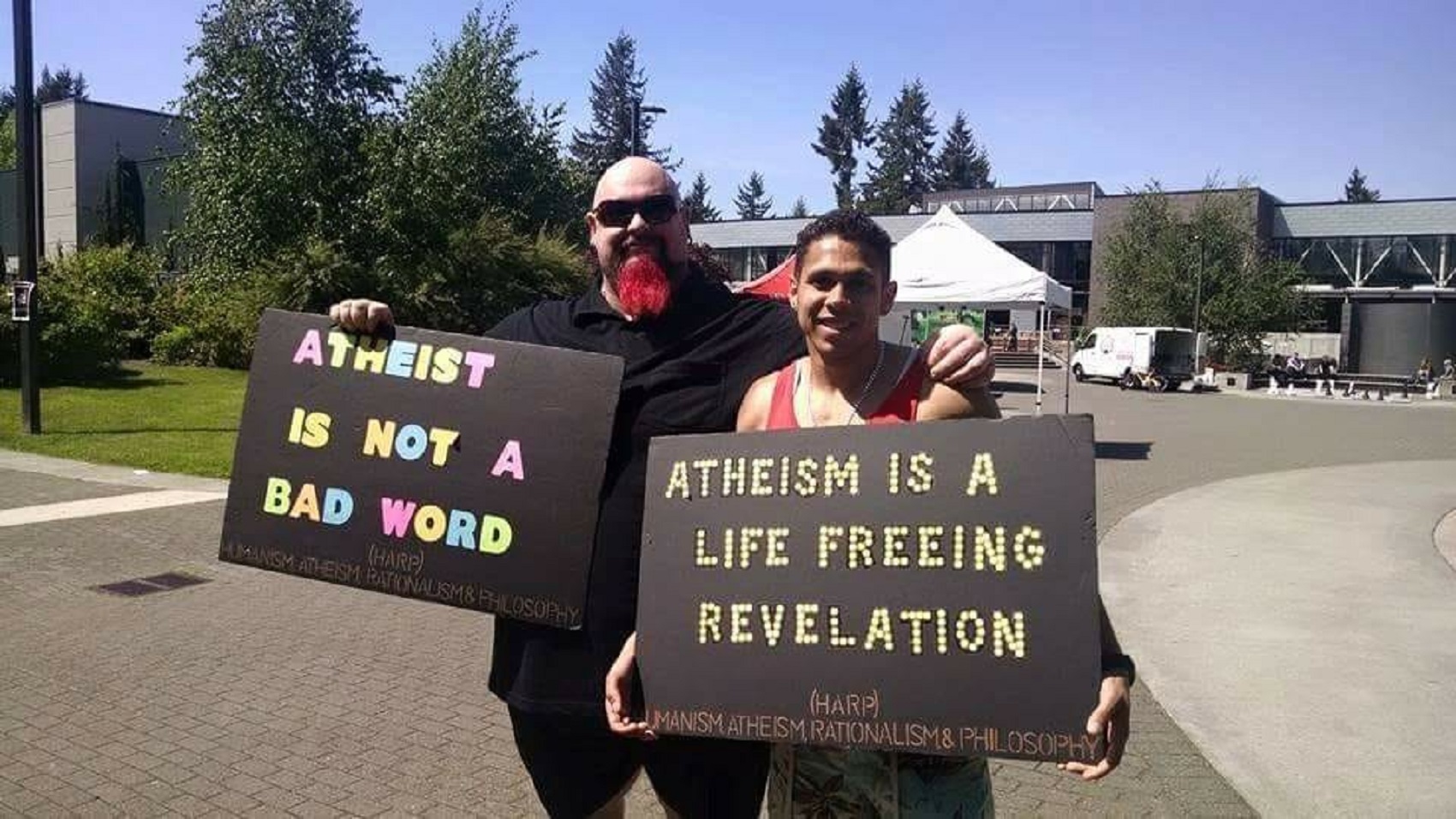

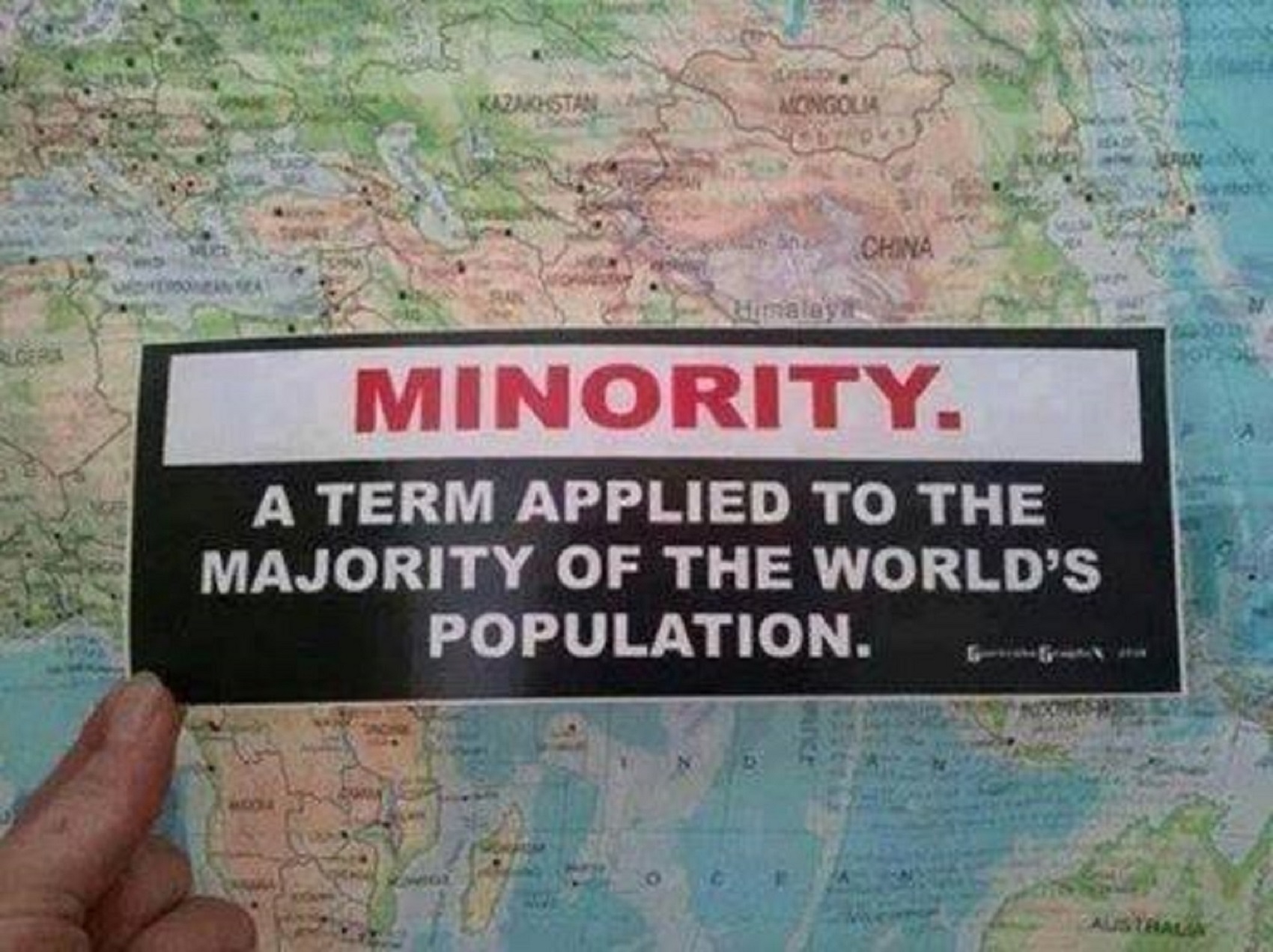
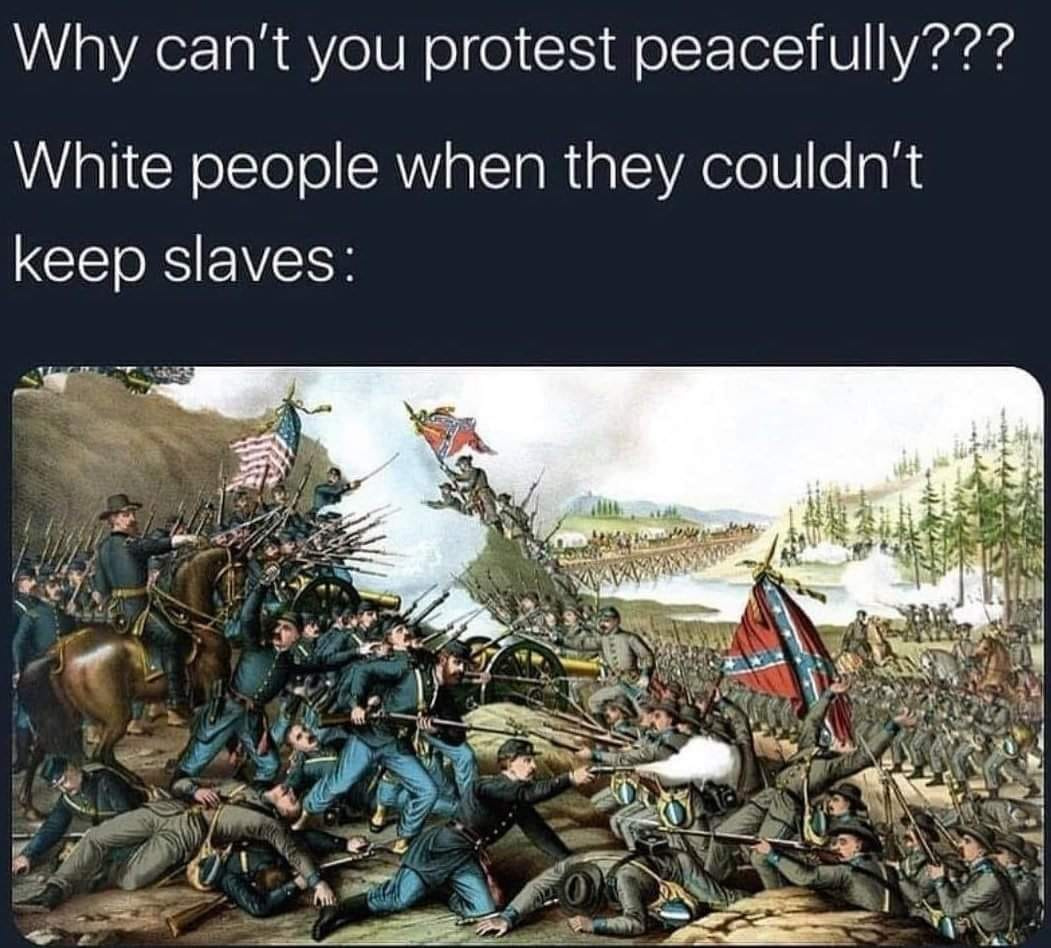
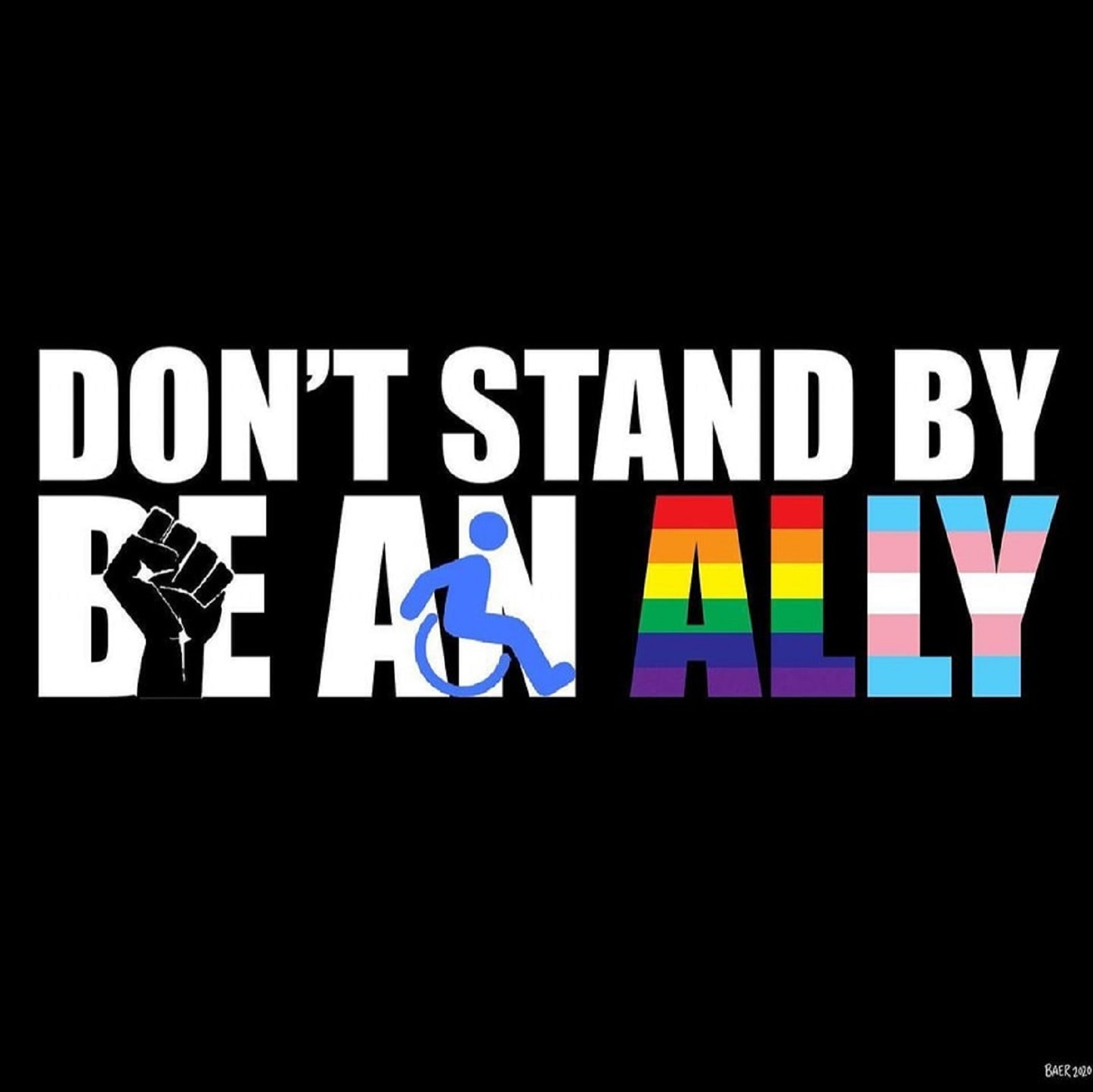
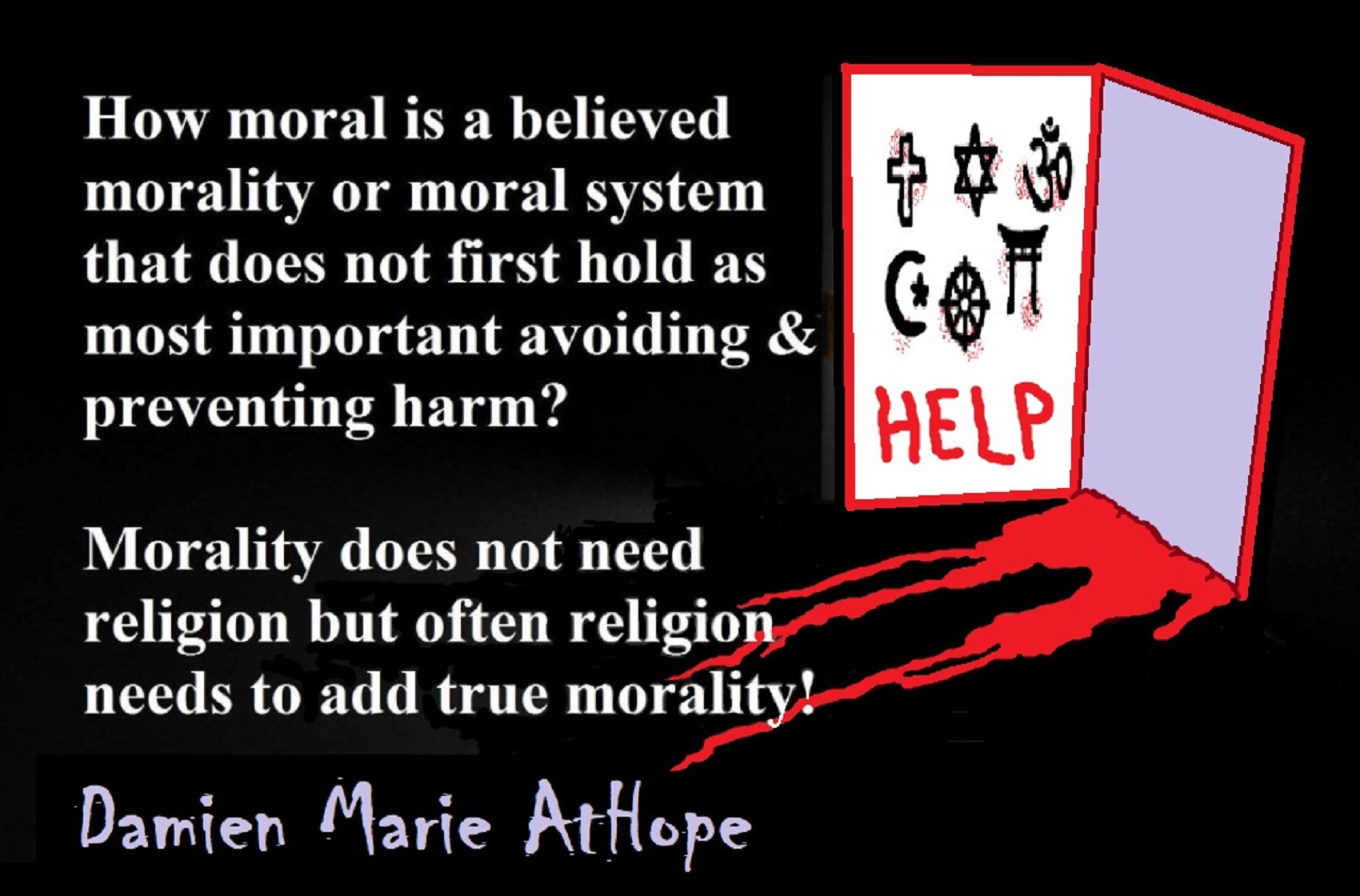
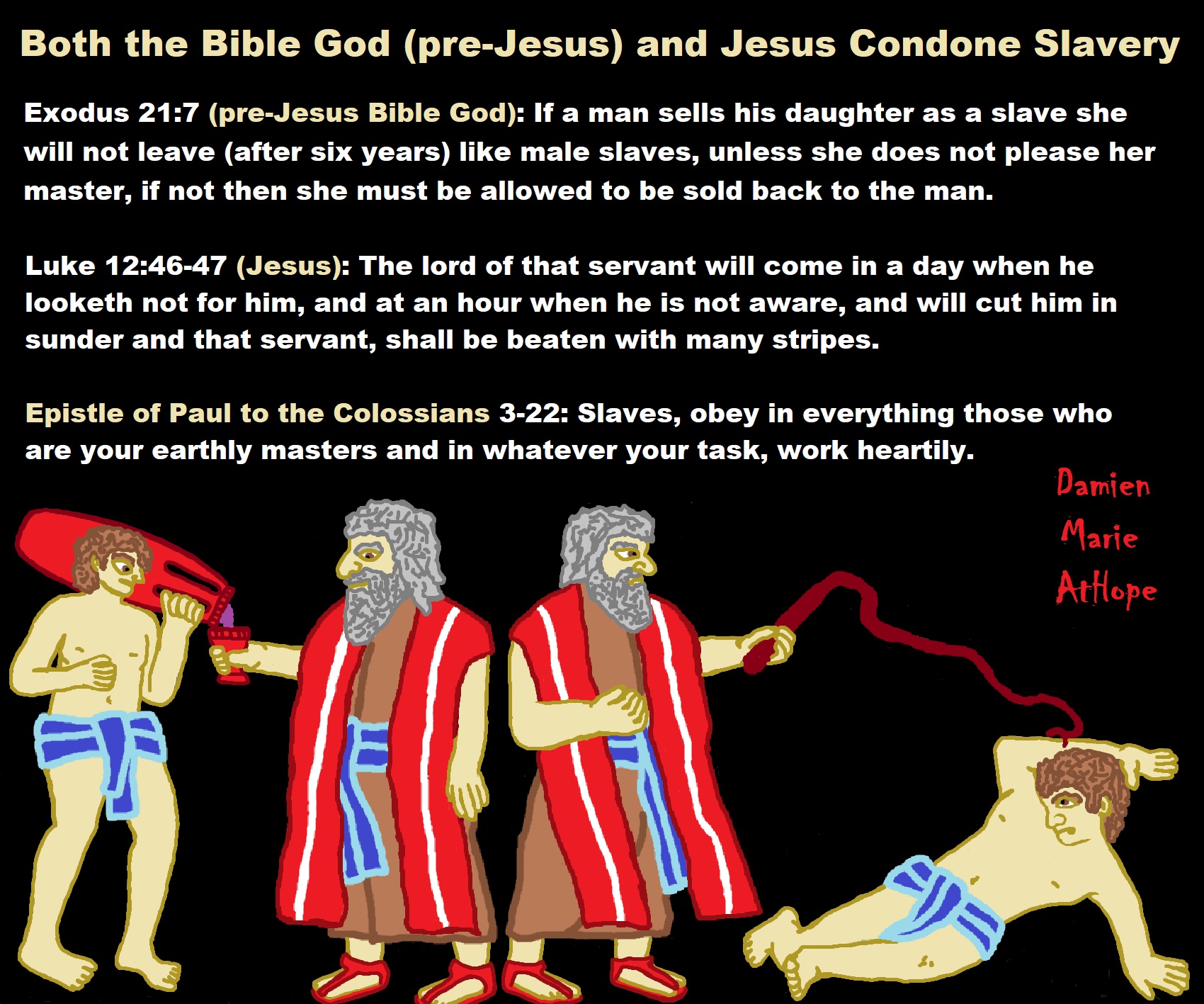
“While some planters became convinced of Christianity as a type of social control, others welcomed ministers to the slave quarters and built plantation chapels out of genuine Christian impulses. Regardless of motives, however, slaveholders remained mindful of the potential subversiveness of religion among slaves.” ref
“Though Africans landed with few possessions, they carried their cultures, skills, and spiritual worldviews into the Americas. Wherever African religions took root in the New World, Africans and their descendants changed and adapted their belief systems to local circumstances and influences. Individual circumstances created variations in the way people practiced their faiths, what they believed, and what significance it held for their lives.” ref
“Throughout the Americas, religious beliefs emerged in distinct local forms: for example, Santería in Cuba, obeah and myalism in Jamaica, and voodoo in Saint-Domingue (Haiti). All—and there were many others—allowed Africans and their descendants a social space of their own. The continuation of the slave trade to Cuba and Brazil through the mid-nineteenth century consolidated and strengthened African religions in both countries. The best known perhaps is candomblé in Brazil. In both places, African deities and African religious customs survived in ways they did not elsewhere in the Americas. They also spawned secret societies which were important social institutions among local enslaved people and, again, often fomented unrest among the enslaved.” ref
“Though African religions were largely frowned upon by colonial authorities, they nonetheless survived and adapted, enabling enslaved practitioners to enjoy a degree of freedom in the way they conducted their social and private lives. For people whose lives were controlled by intrusive owners, it is hard to overestimate the importance of these religious practices.” ref
“Millions of Africans and their New World descendants became Christians, but there were marked differences between slave societies, notably in those dominated by the Catholic and Protestant churches. Catholics tended to welcome Africans, and to convert them simply and with little fuss. Protestant churches tended to insist on instruction and conversion before baptizing Africans into the church. In British colonies, the Anglican church was notoriously hesitant and reluctant to convert enslaved people, largely because of the opposition and hostility of powerful planters in the colonies.” ref
“However, the emergence of evangelical dissenting sects in the eighteenth century, especially Moravians, Baptists, and Methodists, saw a major transformation, notably in the English-speaking Americas. Throughout the Caribbean and in North America, slaves were drawn in ever greater numbers to dissenting churches and chapels, converted by evangelical, peripatetic preachers, sometimes by their own masters. Among these expanding armies of Christian slaves, the Bible, but especially the message, imagery, and the stories of the Old Testament, spoke to their enslaved condition, and nurtured their growing demands for freedom and equality.” ref
“By the early nineteenth century, increasing numbers of slaves demanded their freedom as Christians. This black Christian voice was heeded and supported by fellow Christian sympathizers in the U.S. North and in the centers of political power in Europe. Christianity was, eventually, to prove one of the major challenges to slavery itself.” ref
“Outsiders—Europeans and slave owners across the Americas—tended to dismiss African faiths and practices as mere superstitions. They overwhelmingly viewed African beliefs as idolatry and heathen that lacked the essential customary religions, including religious text. The exception was Islam. It was no accident that those Africans who tended to be spotted as exceptional came from the ranks of African laborers who were practicing Muslims: those who could read and/or write, and those with regular habits of worship, which Christians recognized as paralleling their own religious routines. The rest—many millions—arrived as they left Africa, mere heathens in the eyes of the people who bought and sold them. Indeed, Europeans used the concept of “paganism” to justify their enslavement of people in the first place. In European minds, New World slavery brought the Africans within reach of Christian conversion.” ref
“Muslim Africans were scattered through the slave colonies, though they arrived in especially large numbers in northeast Brazil in the early nineteenth century after being captured as victims of Africans wars and enduring the Middle Passage. These individuals were to prove to be a source of great discontent—and trouble—to their owners.” ref
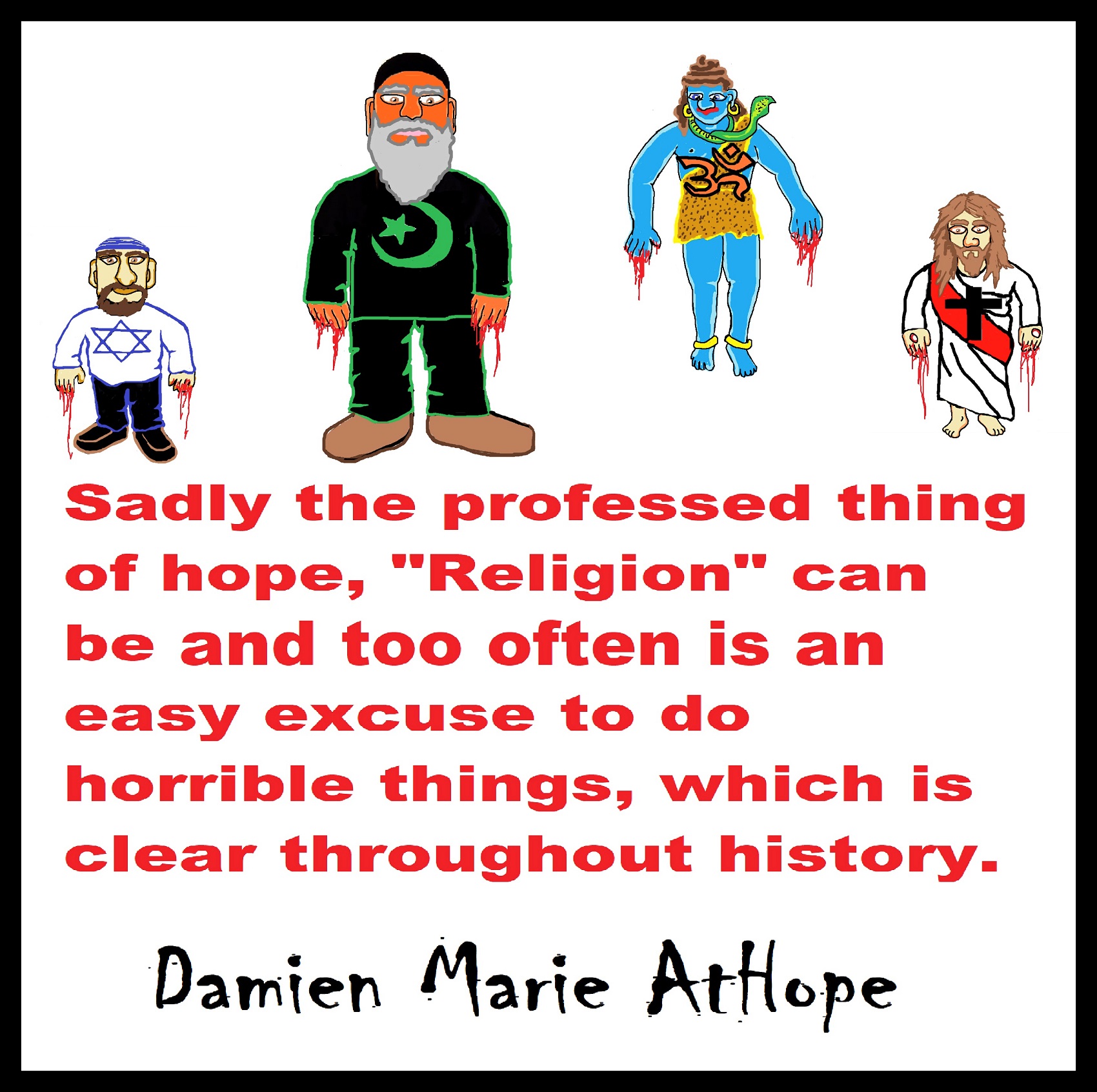
Slavery and Religion?
“Historically, slavery has been regulated, supported, or opposed on religious grounds. In Judaism, slaves were given a range of treatments and protections. They were to be treated as an extended family with certain protections, and they could be freed. They were property but could also own material goods. Early Christian authors (except for Assyrian Christians who did not believe in slavery) maintained the spiritual equality of slaves and free persons while accepting slavery as an institution. Early modern papal decrees allowed the enslavement of the unbelievers, though popes denounced slavery from the fifteenth century onward. This denouncement of slavery did not discourage (for example) the diocese of the Anglican church from having an indirect involvement with the religious conversion of black slaves in Barbados, in which one of the main principles was the divine right of the master over the slave.” ref
“In the eighteenth century, the abolition movement took shape among Christians across the globe, but various denominations did not prohibit slavery among their members into the nineteenth century. Enslaved non-believers were sometimes converted to Christianity, but elements of their traditional beliefs merged with their Christian beliefs. Early Islamic texts encourage kindness towards slaves and manumission (legally freeing individual slaves), while recognizing slavery as an institution and permitting enslavement of non-Muslims imprisoned or bought beyond the borders of Islamic rule. Children born to slaves were also considered legally as slaves.” ref
“Slavery was customary in antiquity, and it is condoned by the Torah. The Bible uses the Hebrew term ebed to refer to slavery; however, ebed has a much wider meaning than the English term slavery, and in several circumstances it is more accurately translated into English as servant. It was seen as legitimate to enslave captives obtained through warfare, but not through kidnapping. Children could also be sold into debt bondage, which was sometimes ordered by a court of law.” ref
“As with the Hittite Laws and the Code of Hammurabi, the Bible does set minimum rules for the conditions under which slaves were to be kept. Slaves were to be treated as part of an extended family; they were allowed to celebrate the Sukkot festival, and expected to honor Shabbat. Israelite slaves could not be compelled to work with rigour, and debtors who sold themselves as slaves to their creditors had to be treated the same as a hired servant. If a master harmed a slave in one of the ways covered by the lex talionis, the slave was to be compensated by manumission; if the slave died within 24 to 48 hours, he or she was to be avenged (whether this refers to the death penalty or not is uncertain).” ref
“Israelite slaves were automatically manumitted after six years of work, and/or at the next Jubilee (occurring either every 49 or every 50 years, depending on interpretation), although the latter would not apply if the slave was owned by an Israelite and wasn’t in debt bondage. Slaves were released automatically in their 7th year of service, which did not include female slaves, or did, were to be given livestock, grain, and wine, as a parting gift (possibly hung around their necks). This 7th-year manumission could be voluntarily renounced, which would be signified, as in other Ancient Near Eastern nations, by the slave gaining a ritual ear piercing; after such renunciation, the individual was enslaved forever (and not released at the Jubilee). Non-Israelite slaves were always to be enslaved forever, and treated as inheritable property.” ref
“In New Testament books, including the First Epistle of Peter, slaves are admonished to obey their masters, as to the Lord, and not to men; and the Epistle to Philemon was used by both pro-slavery advocates as well as by abolitionists; in the epistle, Paul returns Onesimus, a fugitive slave, back to his master. Different forms of slavery existed for over 18 centuries within Christianity. Although in the early years of Christianity, freeing slaves was regarded as an act of charity, and the Christian view that all people were equal including slaves was a novel idea within the Roman Empire, the institution of slavery was rarely criticized. David Brion Davis writes that the “variations in early Christian opinion on servitude fit comfortably within a framework of thought that would exclude any attempt to abolish slavery as an institution.” ref
“Indeed, in 340, the local Synod of Gangra condemned the Manicheans for urging that slaves should liberate themselves; with one of the 20 canons of the Synod declaring: “If anyone shall teach a slave, under the pretext of piety, to despise his master and to run away from his service, and not to serve his own master with good-will and all honor, let him be anathema.” A variation of the Canon would be adopted as Orthodox Catholic Law, during the 451 AD, Council of Chalcedon, as: … Every monk must be subject to his bishop, and must not leave his house except at his suggestion. A slave, however, can not enter the monastic life without the consent of his master. Augustine of Hippo, who renounced his former Manicheanism, argued that slavery was part of the mechanism to preserve the natural order of things; John Chrysostom, who is regarded as a saint by Eastern Orthodoxy and Roman Catholicism, argued that slaves should be resigned to their fate, because by “obeying his master he is obeying God”. but he also stated that “Slavery is the fruit of covetousness, of extravagance, of insatiable greediness” in his Epist. ad Ephes.” ref
“As the Apostle Paul admonished the early Christians; “There is neither Jew nor Greek: there is neither bond nor free: there is neither male nor female. For you are all one in Christ Jesus”. And in fact, even some of the first popes were once slaves themselves. Pope Gelasius I, in 492 CE, sanctioned that heathens in Gaul could be enslaved, imported, and sold by Jews, in Rome. Though in the following centuries, Roman popes would ban the ownership of Christian slaves by Jews, Muslims, Heathens, and other Christians, while the Catholic Council of London in 1102, issued a local blanket decree, though not a Church canon: “Let no one dare hereafter to engage in the infamous business, prevalent in England, of selling men like animals.” ref
“In 1452 Pope Nicholas V issued the papal bull Dum Diversas, which granted Afonso V of Portugal the right to reduce any “Saracens, pagans and any other unbelievers” to hereditary slavery. The approval of slavery under these conditions was reaffirmed and extended in his Romanus Pontifex bull of 1455. (This papal bull was issued in response to the wars which were triggered by the Fall of Constantinople in 1453) In 1488 Pope Innocent VIII accepted the gift of 100 slaves from Ferdinand II of Aragon and distributed those slaves to his cardinals and the Roman nobility. Also, in 1639 Pope Urban VIII purchased slaves for himself from the Knights of Malta. In the 15th and 16th centuries, other popes denounced slavery as a great crime, including Pius II, Paul III, and Eugene IV. In 1639, Pope Urban VIII forbade slavery, as did Benedict XIV in 1741. In 1815, Pope Pius VII demanded that the Congress of Vienna suppress the slave trade, and Gregory XVI condemned it again in 1839.” ref
“In addition, the Dominican friars who arrived in the Spanish settlement of Santo Domingo in 1510 strongly denounced the enslavement of the local Indians. Along with other priests, they opposed the mistreatment of the Indians and denounced it as unjust and illegal in an audience with the Spanish king as well as in the subsequent royal commission. As a response to this position, the Spanish monarchy’s subsequent Requerimiento provided a religious justification for the enslavement of the local populations, on the pretext that they refused to convert to Roman Catholicism and therefore denied the authority of the pope.” ref
“Various interpretations of Christianity were also used to justify slavery. For example, some people believed that slavery was a punishment that was reserved for sinners. Some other Christian organizations were slaveholders. The eighteenth-century high-church Anglican Society for the Propagation of the Gospel in Foreign Parts owned the Codrington Plantation, in Barbados, which contained several hundred slaves, who were branded on their chests with the word Society. George Whitefield, who is famed for his sparking of the so-called Great Awakening of American evangelicalism, overturned a province-wide ban against slavery, and went on to own several hundred slaves himself. Yet Whitefield is remembered as one of the first evangelists who preached to the enslaved.” ref
“At other times, Christian groups worked against slavery. The seventh-century Saint Eloi used his vast wealth to purchase British and Saxon slaves in groups of 50 to 100 in order to set them free. The Quakers in particular were early leaders of abolitionism, and in keeping with this tradition they denounced slavery at least as early as 1688. In 1787 the Society for Effecting the Abolition of the Slave Trade was formed, and 9 of its 12 founding members were Quakers; William Wilberforce, an early supporter of the society, went on to push through the 1807 Slave Trade Act, striking a major blow against the Atlantic slave trade. Leaders of Methodism and Presbyterianism also vehemently denounced human bondage, convincing their congregations to do likewise; Methodists and Presbyterians subsequently made the repudiation of slavery a condition of membership.” ref
“In the Southern United States, however, support for slavery was strong; anti-slavery literature was prevented from passing through the postal system, and even the transcripts of sermons, by the famed English preacher Charles Spurgeon, were burned due to their censure of slavery. When the American Civil War broke out, slavery became one of the issues which would be decided by its outcome; the southern defeat led to a constitutional ban on slavery. Despite the general emancipation of slaves, members of fringe white groups like the Christian Identity movement, and the Ku Klux Klan (a white supremacist group) see the enslavement of Africans as a positive aspect of American history.” ref
“In the United States, Christianity not only held views about slavery but also on how slaves practiced their own form of Christianity. Prior to the work of Melville Herskovits in 1941, it was widely believed that all elements of African culture were destroyed by the horrific experiences of Africans who had been forced to come to the United States of America. Since his groundbreaking work, scholarship has found that Slave Christianity existed as an extraordinarily creative patchwork of African and Christian religious traditions. The slaves brought a wide variety of religious traditions with them including tribal shamanism and Islam. Beyond that, tribal traditions could vary to a high degree across the African continent.” ref
“During the early eighteenth century, Anglican missionaries who attempted to bring Christianity to slaves in the Southern colonies often found themselves butting up against uncooperative masters and resistant slaves. An unquestionable obstacle to the acceptance of Christianity among slaves was their desire to continue to adhere to the religious beliefs and rituals of their African ancestors as much as possible. Missionaries who worked in the South were especially displeased with the slaves’ retention of African practices such as polygamy and what they called idolatrous dancing. In fact, even black people who embraced Christianity in America did not completely abandon the religion of the Old World.” ref
“Instead, they engaged in syncretism, blending Christian influences with traditional African rites and beliefs. Symbols and objects, such as crosses, were conflated with charms which were carried by Africans in order to ward off evil spirits. Christ was interpreted as a healer who was similar to the priests of Africa. In the New World, fusions of African spirituality and Christianity led to distinctly new practices within slave populations, including voodoo or vodun in Haiti and Spanish Louisiana. Although African religious influences were also important among Northern black people, the exposure to Old World religions was more intense in the South, where the density of the black population was higher.” ref
“There were, however, some commonalities across the majority of tribal traditions. Perhaps the primary understanding of tribal traditions was the commonly-held belief that there was no separation of the sacred and the secular. All life was sacred and the supernatural was present in every facet and focus of life. Most tribal traditions highlighted this experience of the supernatural in ecstatic experiences of the supernatural which were brought on by ritual song and dance. Repetitious music and dancing were often used to bring on these experiences through the use of drums and chanting. These experiences were realized in the “possession” of a worshipper in which one is not only taken over by the divine but actually becomes one with the divine.” ref
“Echoes of African tribal traditions can be seen in the Christianity that was practiced by slaves in the Americas. The songs, dances, and ecstatic experiences of traditional tribal religions were Christianized and practiced by slaves in what is called the “Ring Shout.” This practice was a major mark of African-American Christianity during the slavery period. Slaves were actually sold through the leaders of African tribes. Christianity came to the slaves of North America more slowly. Many colonial slaveholders feared that baptizing slaves would lead to emancipation because of vague laws that concerned the slave status of Christians under British colonial rule. Even after 1706, by which time many states had passed laws that stated that baptism would not alter a slave’s status, slaveholders continued to believe that the catechization of slaves wouldn’t be a wise economic choice. Slaves usually had one day off each week, usually Sunday. They used that time to grow their own crops, dance, and sing (doing such things on the Sabbath was frowned upon by most preachers), so there was little time for slaves to receive religious instruction.” ref
“During the antebellum period, slave preachers – enslaved or formerly enslaved evangelists – became instrumental in shaping slave Christianity. They preached a gospel which was radically different from the gospel which was preached by white preachers, who often used Christianity in an attempt to make slaves more complacent with their enslaved status. Instead of focusing on obedience, slave preachers placed a greater emphasis on the Old Testament, especially on the Book of Exodus. They likened the plight of the American slaves to the plight of the enslaved Hebrews of the Bible, instilling hope into the hearts of those who were enslaved. Slave preachers were instrumental in shaping the religious landscape of African Americans for decades to come.” ref
Islam and Slavery?
“According to Bernard Lewis, slavery has been a part of Islam’s history from its beginning. The Quran like the Old and the New Testaments, states Lewis, “assumes the existence of slavery”. It attempts to regulate slavery and thereby implicitly accepts it. Muhammad and his Companions owned slaves, and some of them acquired slaves through conquests. During the beginnings of Islam, Classic slavery wasn’t forbidden, but the latter (Islam) encouraged the emancipation of slaves. In various verses, Quran refers to slaves as “necks” (raqabah) or “those whom your right hand possesses” (Ma malakat aymanukum). In addition to these terms for slaves, the Quran and early Islamic literature uses ‘Abd (male) and Amah (female) term for an enslaved and servile possession, as well as other terms. According to Brockopp, seven separate terms for slaves appear in the Quran, in at least twenty-nine Quranic verses.” ref
“The Quran assigns the same spiritual value to a slave as to a free man, and a believing slave is regarded as superior to a free pagan or idolator. The manumission of slaves is regarded as a meritorious act in the Quran, and is recommended either as an act of charity or as expiation for sins. While the spiritual value of a slave was the same as the freeman, states Forough Jahanbakhsh, in regards to earthly matters, a slave was not an equal to the freeman and relegated to an inferior status. In the Quran and for its many commentators, states Ennaji, there is a fundamental distinction between free Muslims and slaves, a basic constituent of its social organization, an irreparable dichotomy introduced by the existence of believers and infidels. The corpus of hadith attributed to Muhammad or his Companions contains a large store of reports enjoining kindness toward slaves. Chouki El Hamel has argued that the Quran recommends gradual abolition of slavery, and that some hadith are consistent with that message while others contradict it.” ref
“According to Dror Ze’evi, early Islamic dogma set out to improve conditions of human bondage. It forbade enslavement of free members of Islamic society, including non-Muslims (dhimmis) residing under Islamic rule. Islam also allowed the acquisition of lawful non-Muslim slaves who were imprisoned, slaves purchased from lands outside the Islamic state, as well as considered the boys or girls born to slaves as slaves. Islamic law treats a free man and a slave unequally in sentencing for an equivalent crime. For example, traditional Sunni jurisprudence, with the exception of Hanafi law, objects to putting a free man to death for killing a slave. A slave who commits a crime may receive the same punishment as a free man, a punishment half as severe, or the master may be responsible for paying the damages, depending on the crime. According to Ze’evi, Islam considered the master to own the slave’s labor, a slave to be his master’s property to be sold or bought at will, and that the master was entitled to women slave’s sexual submission.” ref
“The Islamic law (sharia) allows the taking of infidels (non-Muslims) as slaves, during religious wars also called holy wars or jihad. In the early Islamic communities, according to Kecia Ali, “both life and law were saturated with slaves and slavery”. War, tribute from vassal states, purchase and children who inherited their parent’s slavery were the sources of slaves in Islam. In Islam, according to Paul Lovejoy, “the religious requirement that new slaves be pagans and need for continued imports to maintain slave population made Africa an important source of slaves for the Islamic world.” Slavery of non-Muslims, followed by the structured process of converting them to Islam then encouraging the freeing of the converted slave, states Lovejoy helped the growth of Islam after its conquests.” ref
“According to Mohammed Ennaji, the ownership gave the master a right “to punish one’s slave”. In Islam, a child inherited slavery if he or she was born to a slave mother and slave father. However, if the child was born to a slave mother and her owner master, then the child was free. Slaves could be given as property (dower) during marriage. The text encourages Muslim men to take slave women as sexual partners (concubines), or marry them. Islam, states Lewis, did not permit Dhimmis (non-Muslims) “to own Muslim slaves; and if a slave owned by a dhimmi embraced Islam, his owner was legally obliged to free or sell him”. There was also a gradation in the status on the slave, and his descendants, after the slave converted to Islam.” ref
“Under Islamic law, in “what might be called civil matters”, a slave was “a chattel with no legal powers or rights whatsoever”, states Lewis. A slave could not own or inherit property or enter into a contract. However, he was better off in terms of rights than Greek or Roman slaves. According to Chirag Ali, the early Muslims misinterpreted the Quran as sanctioning “polygamy, arbitrary divorce, slavery, concubinage, and religious wars”, and he states that the Quranic injunctions are against all this. According to Ron Shaham and other scholars, the various jurisprudence systems on Sharia such as Maliki, Hanafi, Shafi’i, Hanbali, and others differ in their interpretation of the Islamic law on slaves.” ref
“Slaves were particularly numerous in Muslim armies. Slave armies were deployed by Sultans and Caliphs at various medieval era war fronts across the Islamic Empires, playing an important role in the expansion of Islam in Africa and elsewhere. Slavery of men and women in Islamic states such as the Ottoman Empire, states Ze’evi, continued through the early twentieth century. In the seventeenth century Celebes Island, a policy that prohibiting slavery of Muslims whose biological parents are not slave was issued by the Sultan of Bone, La Maddaremmeng. According to him, all Muslims are free men. However, it did not liberate the enslaved Muslims whose parents are slave or inherited slave. Nonetheless, La Maddaremmeng mandated that these slaves be treated with the same humanity as one would treat their own family.” ref
“Islamic Puritanism was allegedly the motivation behind La Maddaremeng’s policy towards the Muslim slavery. Apart from freeing slaves, La Maddaremeng also destroyed Idols and prohibited traditional ancestral beliefs that contradicted the teaching of Islam. His puritanical activities faced opposition coming from the people, the aristocrats, the neighboring kings, and even his own mother, We Tenrisoloreng Datu Pattiro. The Invasion of Bone by The Gowa Sultanate led him into his capture and deposition.” ref
Hinduism and Slavery?
“The term “dasa” (dāsa) in the Vedas is loosely translated as “slave.” However, the meaning of the term varied over time. R. S. Sharma, in his 1958 book, for example, states that the only word which could possibly mean slave in Rigveda is dāsa, and this sense of use is traceable to four later verses in Rigveda. The term dāsa in the Rigveda, has been also been translated as a servant or enemy, and the identity of this term remains unclear and disputed among scholars. The word dāsi is found in Rigveda and Atharvaveda, states R.S. Sharma, which he states represented “a small servile class of women slaves”. Slavery in the Vedic period, according to him, was mostly confined to women employed as domestic workers. He translates dāsi in a Vedic era Upanishad as “maid-servant”. Male slaves are rarely mentioned in the Vedic texts. The word dāsa occurs in the Hindu Sruti texts Aitareya and Gopatha Brahmanas, but not in the sense of a slave.” ref
“Towards the end of the Vedic period (600 BCE or around 2,600 years ago), a new system of varnas had appeared, with people called shudras replacing the erstwhile dasas. Some of the shudras were employed as laboring masses on farmland, much like “helots of Sparta“, even though they were not treated with the same degree of coercion and contempt. The term dasa was now employed to designate such enslaved people. Slavery arose out of debt, sale by parents or oneself (due to famines), judicial decree, or fear. While this could happen to a person of any varna, shudras were much more likely to be reduced to slavery. The Smriti contain classifications of slaves, and the slaves were differentiated by origin and different disabilities and rules for manumission applied.” ref
“Hindu Smritis are critical of slavery. Slaves could be given away as gifts along with the land, which came in for criticism from the religious texts Āśvalāyana and Kātyāyana Śrautasūtras. According to many Dharmasastras, release from slavery is an act of piety. Slavery was considered as a sign of backwardness by the Arthashastra author Kauṭilya, who provided slaves the right to property and abolished hereditary slavery, prohibiting the sale and pledge of children as slaves. The Arthashastra laid down norms for the State to resettle shudra cultivators into new villages and providing them with land, grain, cattle, and money. It also stated that aryas could not be subject to slavery and that the selling or mortgaging of a shudra was punishable unless he was a born slave. The Agni Purana forbids the enslavement of prisoners. The Apasthamba sutra discusses the emancipation of slaves. Bhakti movements from the early centuries of the common era, encouraged personal devotion to one divine being. They welcomed members from all backgrounds, and thus criticized slavery by implication.” ref
Buddhism and Slavery?
“Slavery existed in ancient India and, according to Scott Levi, is was likely an established institution that was “widespread by the lifetime of the Buddha and perhaps even as far back as the Vedic period.” The topic of slavery and the mention of slaves, therefore, can be found in Buddhist history and texts. From a Buddhist perspective, according to Gautama Buddha, the founder of Buddhism, the laity and monastics of his following were advised to not partake in the slave trade:
These five trades, O monks, should not be taken up by a lay follower: trading with weapons, trading in living beings, trading in meat, trading in intoxicants, trading in poison. — Anguttara Nikaya V.177, Translated by Martine Batchelor” ref
“In Pali language Buddhist texts, Amaya-dasa has been translated by Davids and Stede in 1925, as a “slave by birth”, Kila-dasa translated as a “bought slave”, and Amata-dasa as “one who sees Amata (Sanskrit: Amrita, nectar of immortality) or Nibbana“. However, dasa in ancient texts can also mean “servant”. Words related to dasa are found in early Buddhist texts, such as dāso na pabbājetabbo, which Davids and Stede translate as “the slave cannot become a Bhikkhu”. This restriction on who could become a Buddhist monk is found in Vinaya Pitakam i.93, Digha Nikaya, Majjhima Nikāya, Tibetan Bhiksukarmavakya, and Upasampadajnapti. Schopen states that this translation of dasa as slave is disputed by scholars.” ref
“The term dāsa and dāsyu in Vedic and other ancient Indian literature has been interpreted by as “servant” or “slave”, but others have contested such meaning. The term dāsa in the Rigveda, has been also been translated as an enemy, but overall the identity of this term remains unclear and disputed among scholars. Early Buddhist texts in Pali, according to R. S. Sharma, mention dāsa and kammakaras, and they show that those who failed to pay their debts were enslaved, and Buddhism did not allow debtors and slaves to join their monasteries. The 3rd Century BCE Edicts of Ashoka identify obligations to slaves (Greek: δούλοις) and hired workers (Greek: μισθωτοῖς), and later prohibited the trading of slaves within the Maurya Empire. Medieval Buddhist states codified slavery, combining local customary practices with derivatives of the Vedic Manusmriti. The series of dhammathats (legal treatises) for states covering Burma and North West India observed the 14 kinds of slavery set out in the Wareru Dhammathat, while Slavery in Bhutan was regulated into the mid-twentieth century[182] by a local derivation of the Tibetan Buddhism Tsa Yig Chenmo.” ref
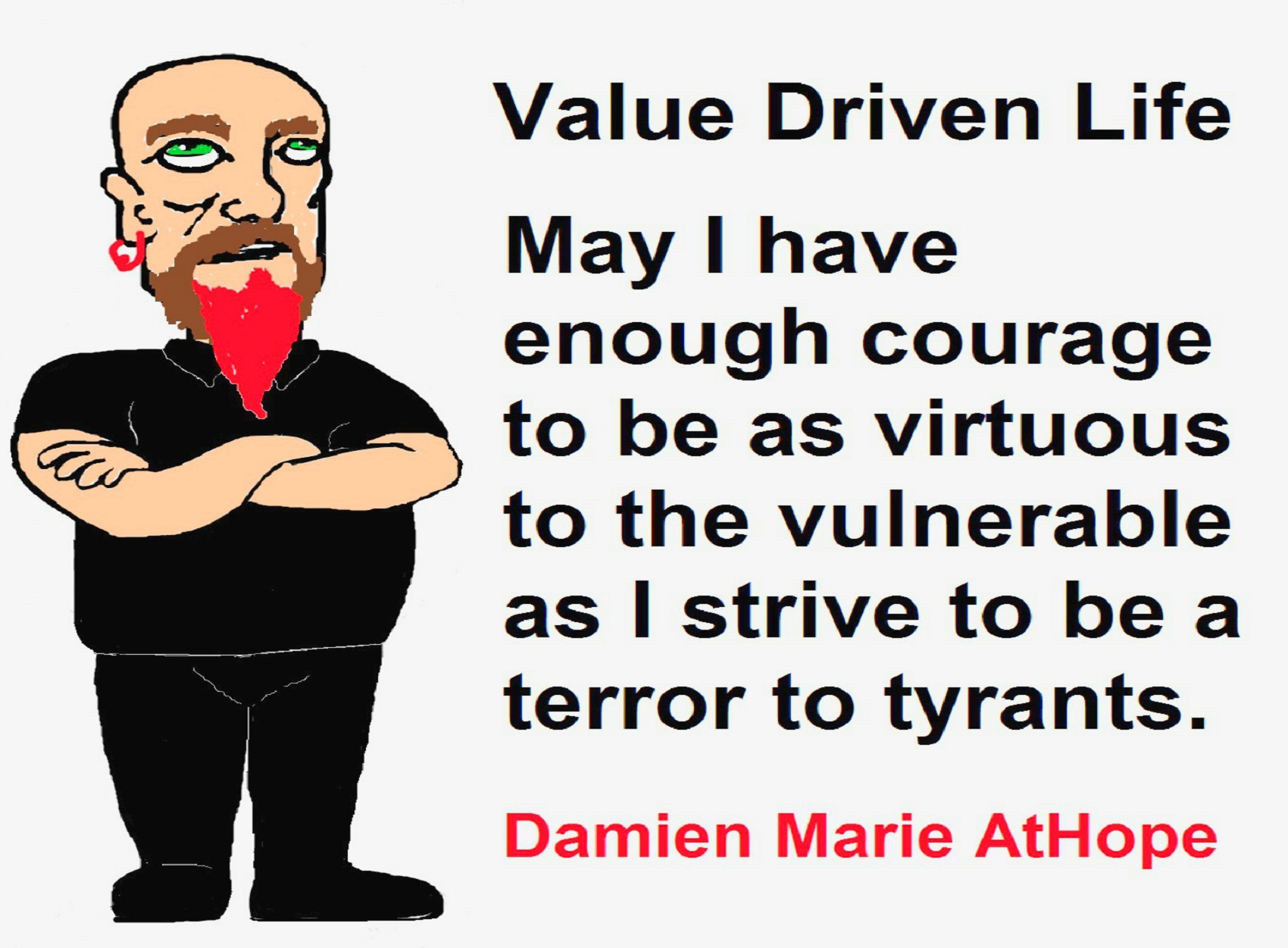
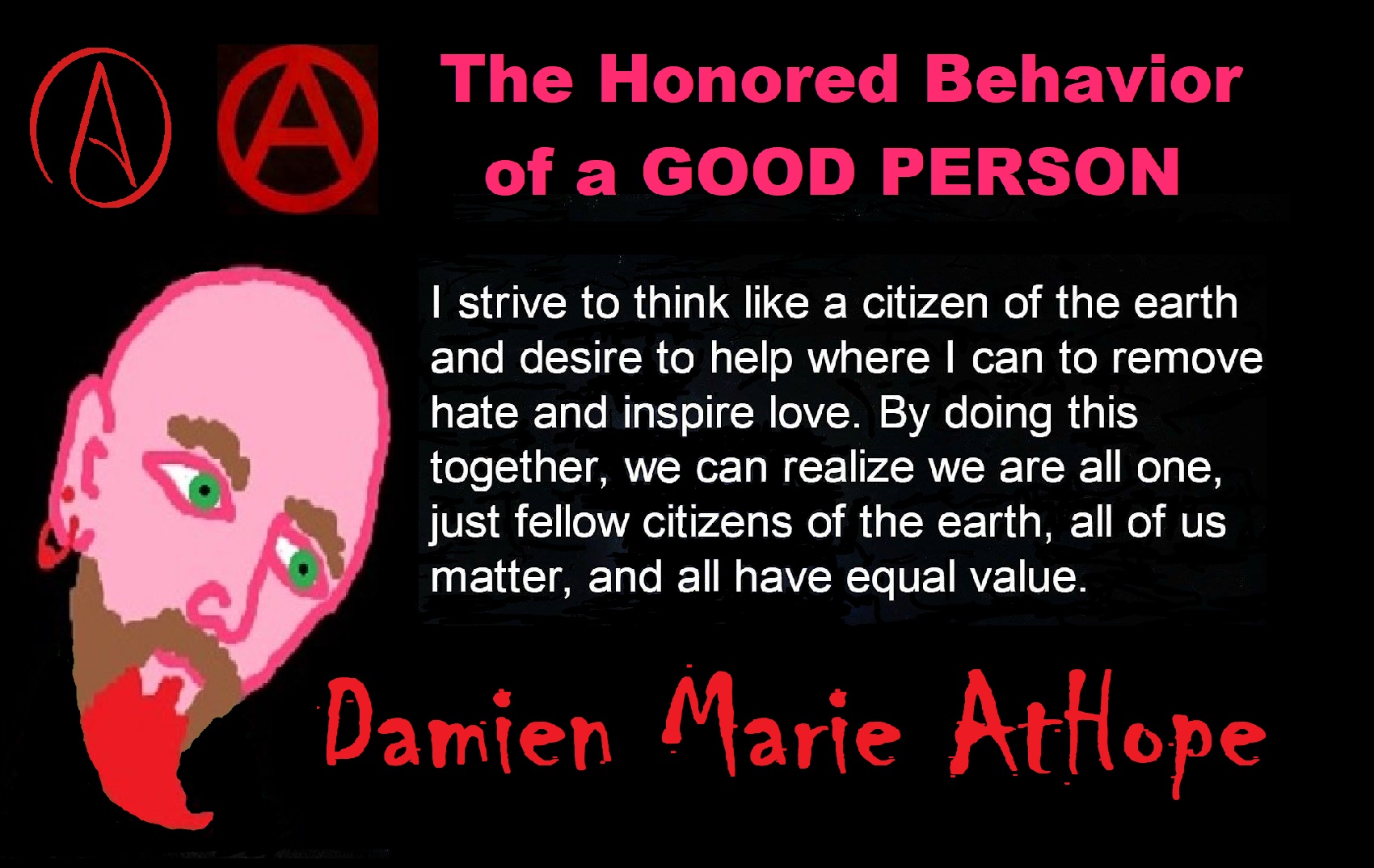
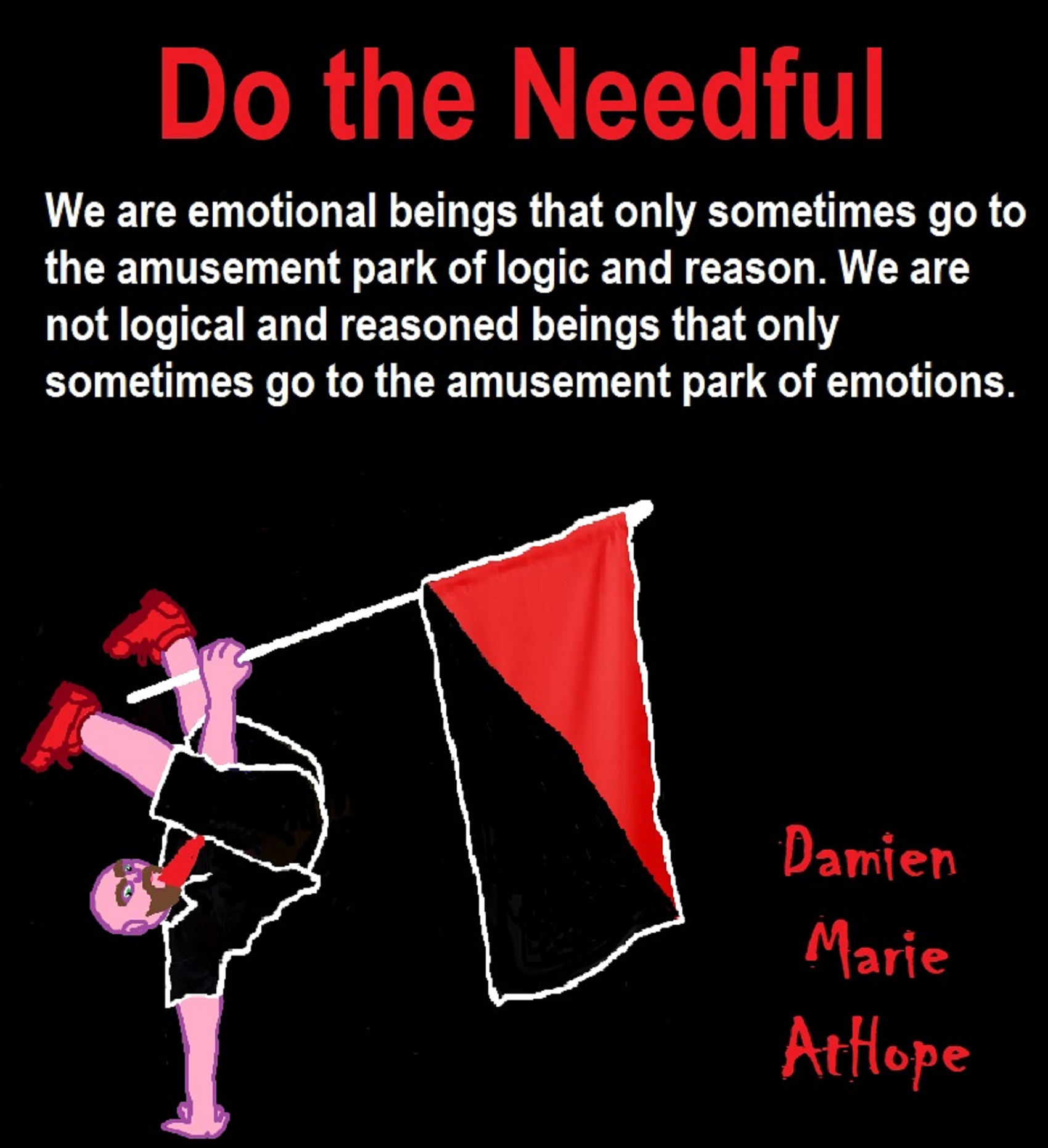
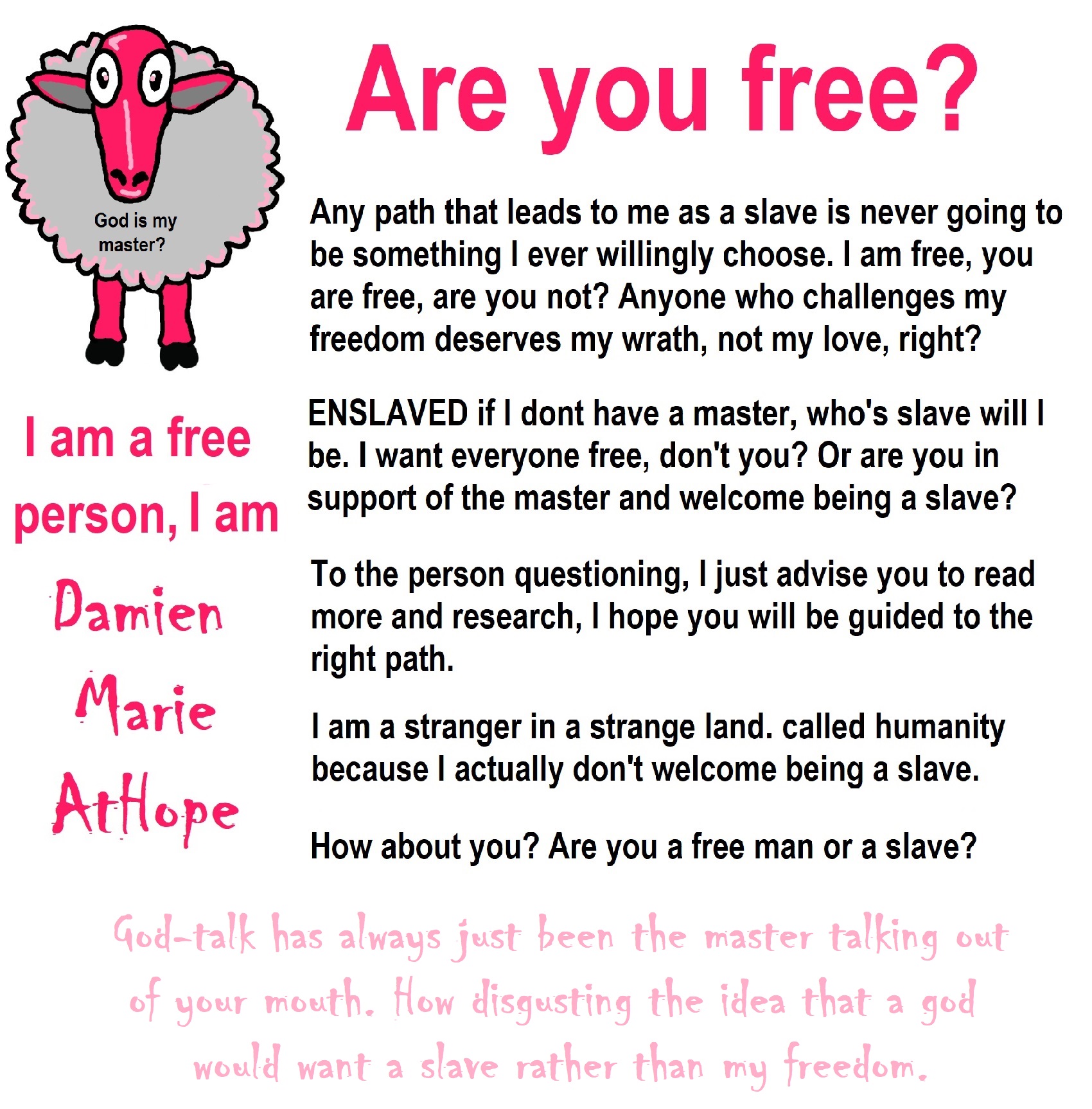
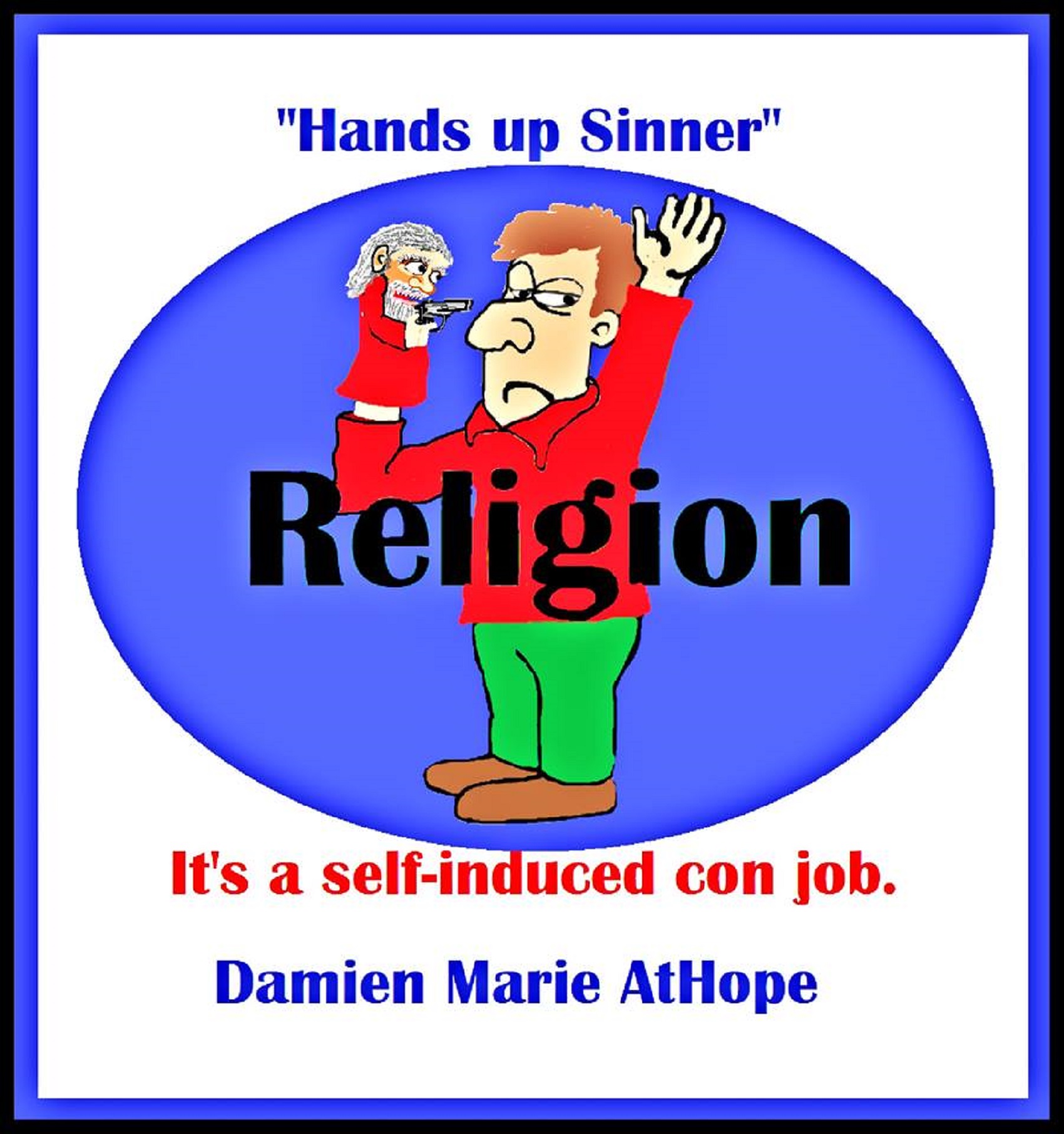
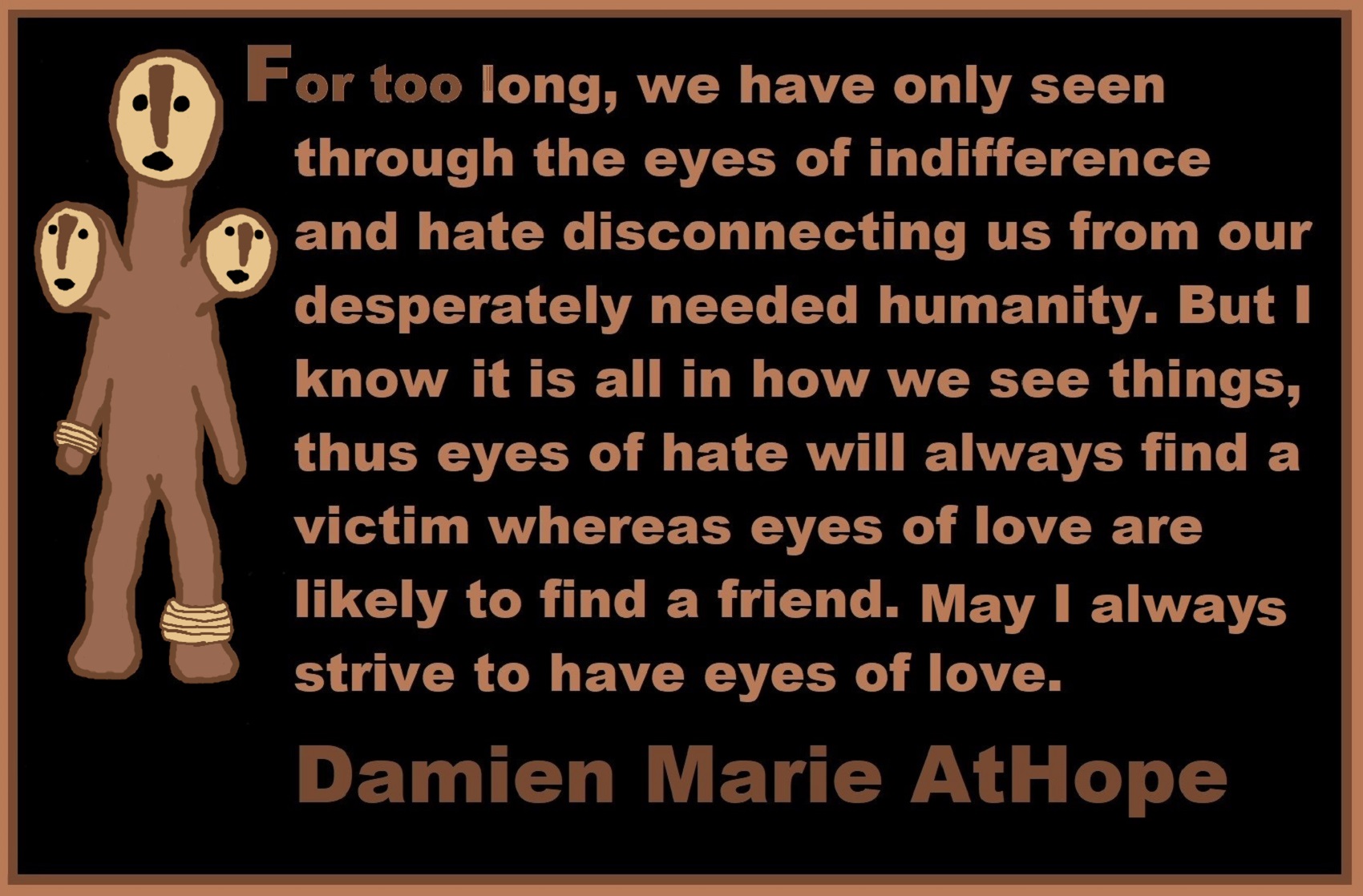
christofascism (christian and fascism) as well as religiofascism (religion and fascism)
“Damien, I (christian) personally think Muslims should be eradicated for what they believe in.” – Challanger
My response, Defense is a reasonable justification for violence but violence not for defense is hardly ever reasonable. Your thinking about “eradicated people for what they believe in” is similar to the radicalized thinking of the terrorists you despise. Such errors in thinking are nothing new as the idea of “eradicating people for what they believe in” is by and large a constant recurring theme of religions. And this has been a favorite excuse for harming others religious thinkers run to. I think religions in general as all lies should be eradicated not people. There is equal threat in this country from the christian terrorists and right wing terrorists than islamic terrorists. I am against terrorists in general and the belief in or support for terrorism should be eradicated not people. Secular education with real histories, sciences and critical as well as analytical thinking is needed to amend the problem not just more violence.
Speaking of real histories “eradicated people for what they believe in” is similar to why millions of Native Peoples of the Americas were slaughtered. But some think even though sad at the harm experienced by American Indians still the colonization of Americas (and the ensuing slaughter of natives) was NOT religion based (it was a purely economic endeavor). To such thinking I disagree. From the beginning the Spanish, English, Dutch, and French all viewed Native Peoples of the Americas as Uneducated Pagans and all professed their desire to teach Native Americans the gospel of Jesus Christ. Indeed, spreading Christianity to the benighted peoples of the New World was a prime rationale for European colonization. However, propagating the faith always took place within a broader cultural context peculiar to the nationality of the colonists involved. Both the Spanish and the English thought in terms of transforming the Indians’ way of life, but only the Spanish pursued that goal rigorously and made it the foundation upon which much of Spanish American culture was based. Of course it was arguably much more the result of European and Indian sexual intermingling than the monumental educational efforts jointly undertaken by the Catholic Church and the Spanish Crown. Moreover, in the borderlands of Florida, Texas, and New Mexico, Spanish success at acculturating the Indians was limited at best. The British too aimed at civilizing as well as Christianizing the Indians, but compared to the Spanish, whose mighty missionary efforts were driven by the powerful Catholic Church, the British commitment to propagating their faith and culture among Native Americans was desultory. Also bringing together the resources of their Catholic Church and Crown, the French missionary adventure in North America was extensively pursued through the Saint Lawrence River valley, the Illinois country, and down the Mississippi River valley to Louisiana and the Gulf of Mexico. Less intrusive and generally more accommodating than Spanish clerics, French priests nevertheless garnered thousands of converts and played a crucial role in forging a Franco-Indian alliance that dominated much of North America. The European missions to the Indians aside, the most fascinating educational story regarding the Indians concerned their adjustments to the European invasion of America that began with Columbus’s arrival in 1492. Ref
Even in the initial stages of contact between European Christians and Native Indian people the stage was set for ethnocentrism, and the Attitude towards the Indians was that of Christian superiority. The Indians were read a proclamation in Spanish which they had no hope of understanding, they had no hope of understanding the death sentence they were being read, and it went something like this: “We ask and require you to acknowledge the church as the ruler and Superior of the whole world and the high priest called pope and in his Name the king of Spain as lords of this land. If you submit we shall Receive you in all love and charity and shall leave you, your wives and Children and your lands free without servitude, but if you do not submit. We shall powerfully enter into your country and shall make war against You, we shall take you and your wives and your children and shall make Slaves of them and we shall take away your goods and shall do you all The harm and damage we can.” This proclamation was use standard until around 1860! Ref
Moreover, an article in 1839 not using the term “manifest destiny”, did predict a “divine destiny” for the United States and an article in 1845 issued an unmistakable call for American expansionism. Focusing mainly on bringing the Republic of Texas into the union, it declared that expansion represented “the fulfillment of our manifest destiny to overspread the continent allotted by Providence for the free development of our yearly multiplying millions.” Thus a powerful American slogan was born. “Manifest Destiny” became first and foremost a call and justification for an American form of imperialism, and neatly summarized the goals of the Mexican War. It claimed that America had a destiny, manifest, i.e., self-evident, from God to occupy the North American continent south of Canada (it also claimed the right to the Oregon territory including the Canadian portion). “Manifest Destiny” was also clearly a racial doctrine of white supremacy that granted no native American or nonwhite claims to any permanent possession of the lands on the North American continent and justified white American expropriation of Indian lands. (“Manifest Destiny” was also a key slogan deployed in the United States’ imperial ventures in the 1890s and early years of the twentieth century that led to U.S. possession or control of Hawaii and the Philippine Islands.) But Manifest Destiny was not simply a cloak for American imperialism and a justification for America’s territorial ambitions. It also was firmly anchored in a long standing and deep sense of a special and unique American Destiny, the belief that in the words of historian Conrad Cherry, “America is a nation called to a special destiny by God.” Ref
When I was young I raged at the world for abuse I received from my parents. Then I developed some, so I held my parents accountable, raging at them and the world; as so much was out there, like them. Then I fully developed and became an atheist, thus I started to see my parents were two different versions of christofascism (christian and fascism), as well as I saw that relatively all religions in some way are part of religiofascism (religion and fascism) especially how they often force hereditary religion of children by cursive force or oppression and I became an antireligionist atheist raging against religion as well as the lies of gods.
I oppose Fascism but what is Fascism?
Anti-Left Propaganda?
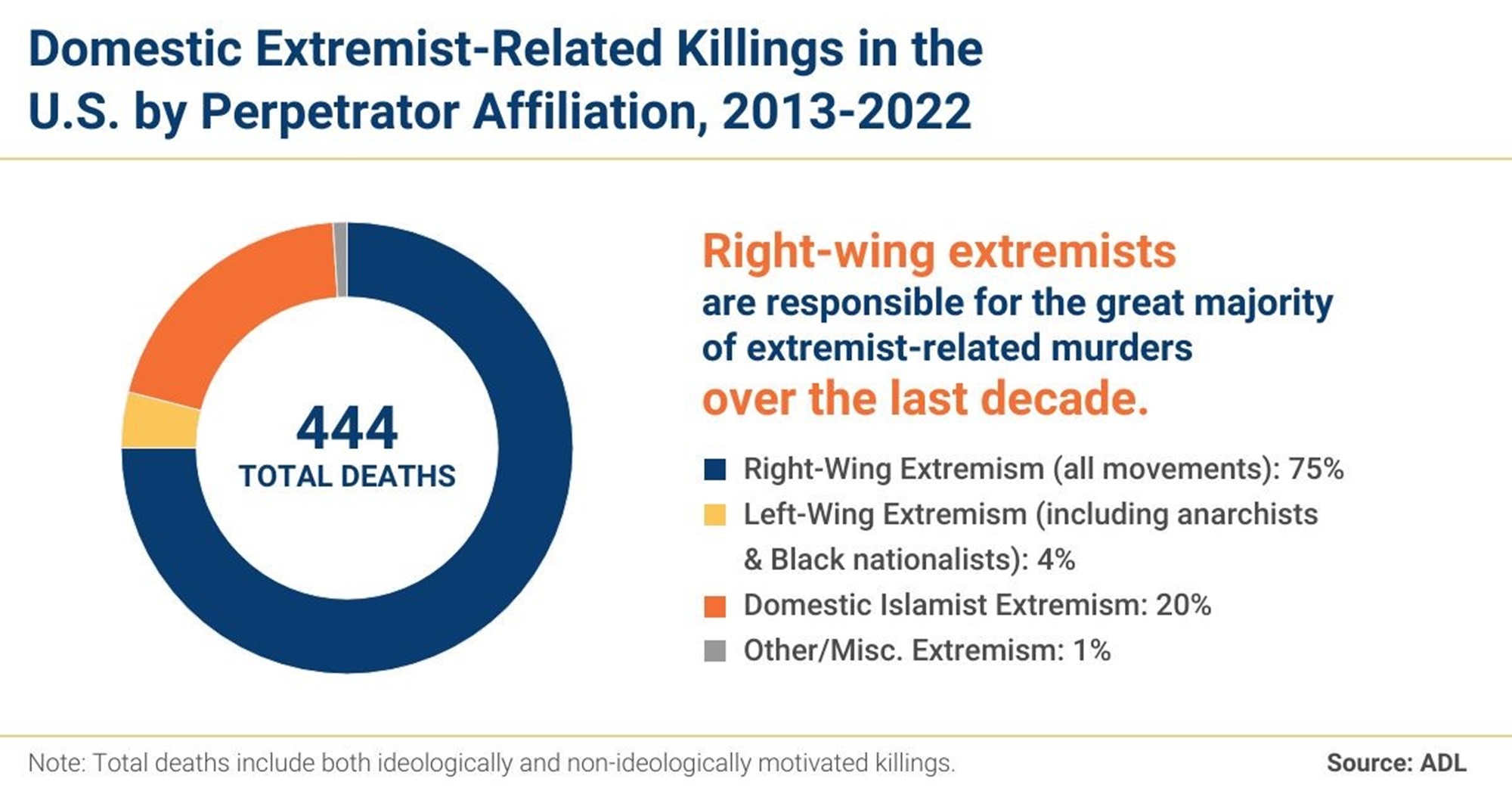
Compare and Contrast (religious and non-religious)
The following is a poem from the book Taste Your Emotions that relates to this:
“Rebirth”
I rub my eyes, Is it true?
I am smiling
Giddy with joy
I look at myself in the mirror
It is like a new me, looking back.
Warm sun sits on my face
Blue skies float inside my eyes.
Happiness of my smile glitters like the stars
I feel new, the mountains of my life did not landslide.
For now, I stand here growing strong.
My life came from a hard seed of hate.
Now changed and strong, I spring forth into a sturdy tree of love.
As a religious believer, I was a far cry from the individual I am now. Almost a complete opposite juxtaposition can be seen in most areas. Some of my past fanaticism mirrors my family’s’ membership in a strict religious Christian cult called “The Local Church”. Theologically, the Local Church is considered by most Christian apologists and counter cult professionals to be a cult of Christianity. According to cult leader Witness Lee, all are evil, even others in Christianity are viewed as blind, fallen, poor, and degraded. Witness Lee calls all other Christian denominational groups harlot daughters of the whore of Babylon (Apologetics Index, 2009). I was also uncaring as a result of my parents’ sexual, physical, emotional, and mental abuse and living in a community of aggression and violence. This oppression and empathy robbing happened both in the home as well as from being from tough schools and neighborhoods in southern california which exposed me directly to seeking approval through acting out violently as well. The topics that will be analyzed are love, cohabitation, sexuality, gender, divorce, working women, marriage, extramarital affairs, child-rearing practices, homosexuality, war, America, politics, family, religion, society, media, racism, sexism, ethnocentrism, morals, and the American justice system.
My Views as a religious thinker
*Love: was a fantasy of the gullible few and what could be obtained was more akin to heavy liking than the conception of romantic love. This was also true with family or friends.
*Cohabitation: was okay, but not really what you should do because it was a sin.
*Sexuality: must be controlled, it was fun but if overt or out of the norm it was shameful or evil.
*Gender: was who we were supposed to be as designed by God and the bible’s understanding of gender told you how to correctly act.
*Divorce: was a sign of failure and showed you did not try. Marriage was to last forever till death do you part.
*Working women: should not have to work if they do not want to; unless it is required in order to earn the needed combined income to survive.
*Marriage: equals monogamy. It was meant to be forever good or bad and was between only one man and one woman.
*Extramarital affairs: sex outside marriage was totally wrong, sinful, demonstrated you did not love the other party, and if accrued will end a marriage.
*Child-rearing practices: I thought spanking should be limited due to his abuse by spanking.
*Homosexuality: I hated homosexuals; I thought being gay was totally wrong, sinful, and demonstrated perversion of the natural world.
*War: was a good means of bettering the world by killing all those who are against America or threaten democracy. I was all for war. I loved radical American nationalism and the thought of power through fear of war with America. In fact, I was so into war that when the first gulf war happened, he was thrilled and hoped the U.S. would bombed and killed the region back to the “Stone Age.” I almost joined the military just to have the opportunity to go to war, be masculine, and kill the enemy but was denied because he was too heavy.
*America: I thought America was the greatest country on earth, blessed by bible God and had a positive legacy of reason and justice; it was a spearhead of freedom for the world.
*Politics: I was a proud conservative republican and was active in politics. I felt it was a responsibility of every American to vote. At the age of 18, was the first time to vote, I was paid to serve in the voting booth operation. He served in the voting booth operation more than once and thought it was a demonstration of my staunch patriotism.
*Religion: I thought the only real true faith was Christianity and it should be pushed on others.
*Society: I thought society was a positive structure necessary to human advancement and god as well as religion were an important part.
*Media: was mostly helpful with a few negative themes.
*Racism: was not good but was mainly an issue of the past.
*Sexism: was mostly a man overexerting masculinity or women’s overreaction of men’s God given authority.
*Ethnocentrism: I saw it as cultural pride a positive love of one’s own kind.
*Morals/ethics: laws given by the Christian God.
*The American Justice system: could be totally trusted. It was simply one of the best judicial systems formed by man.
My Views as a non-religious thinker
*Love: is an amalgam of intertwined emotions and connectedness realized in expressiveness. It is not a one time event but a continually fluid reactional experiential relative multi-dimensional conception. Love can be experienced and shared by several different variations of women and men in any grouping they choose, be it homosexual, bisexual, heterosexual, or group romantic partners. Love changed because I now have positive significant romantic relationships in my life which are different than those modeled by family in my past. Love is similar to maturity in that they do not simply reach some sort of plateau or final state; instead they are a lifetime process of becoming.
*Cohabitation: I think it is no different than not doing it. Cohabitation differs now from before because he has universal ethics, not morals.
*Sexuality: to me is now seen through universal ethics, thus is morally neutral. It should be openly expressed and experienced because it is a positive expression of life and holds no shame or negative orientations, if consenting and between adults. Sexuality differs now because I have universal ethics, not morals. Things like sex for fun, swinging, fetish, porn, prostitution, homosexuality, bisexuality, nudism, strip clubs, group sex, polyamory, polygamy, or polyandry, and even sex between consenting adult family members hold no preconceived negativity or innate wrongness. My universal ethics is a moral standard allowing sexual freedom up to the limit of coercive harm. Since universal ethics is independent of culture, societal standards, moral codes, religious laws, or personal ethical views “sex” or one’s sexual orientation and gender identity loses its right or wrong status; thus, it is morally neutral (Foldvary, 1980).
*Gender: to me is now is an oppressive somewhat invented categorization which forces a picking of one side instead of seeing all people having a varying expression of both masculinity and femininity and should not devalued those who do not fit a socially conceived ideal. Gender has changed because I learned it was not who we are, but who we are told to be. In acknowledging my true self, I realized I had both femininity and masculinity. I have a genderqueer identity; 40% female-typed and 60% male-typed, yet 100% straight.
*Divorce: to me is now is simply a separation that one chooses for personal reasons holding little ethical significance. Evolutionary psychologists contend that human beings are designed to fall in love but not stay in love (Crandell et al., 2009).
*Working women: to me is now are not different than other human beings in obtainment of rights. Thus, they should be wholeheartedly supported to work which includes childbearing without having to jeopardize their high-level career positions. Furthermore, women or the care giving spouse should not have to work if they do not want to unless it is required in order to earn the needed combined income to survive. High-level career positions are just as important for women to reach as men (Crandell et al., 2009).
*Marriage: my current marriage is defined under shared openness with my bisexual wife and their responsible non-monogamy. Thus, marriage is not so rigidly defined as in society. Marriage could involve monogamy or any other forms of chosen non-monogamy, it should also alough gay marriage as well as for all LGBTQI, I also support multiple marriage/poly marriage as long as it’s of free consent. If it is a committed partnership which could involve several different variations of women and men in any grouping they choose, be it homosexual, bisexual, heterosexual, or group marriage. If adults wish to lawfully join no matter the grouping, they should be allowed to do so.
*Extramarital affairs: to me now may involve sex outside of agreed upon mutual relationship rules is not congruent with entered into marriage contract, though being that stringent monogamy is not suited to all, it is understandable even if not a highly valued practice buy some but I am in an open relationship practicing ethical nonmonogamy and have a happy marriage and life. Some adults do make distinctions in types or situations to either understand or justify infidelity which may include practicing ethical nonmonogamy.
*Child-rearing practices: I am anti-spanking and am against physical, psychological or emotional abuse of children. I have never had children and by choice had a vasectomy to never have them. Though he feels there should never be any form of physical violence done to a child of which spanking falls under that category.
*Homosexuality: to me is now is a healthy sexual form of desire expression and simply another category of normal sexuality. In addition, homosexuality is both common and natural being observed in close to 1500 animal species.
*War: to me is now is physical harm and killing, this killing is murder of which is mostly illegal and unethical in other circumstances, unless involved for protection or a (just) war that is restrained, humane, and ultimately directed towards the aim of establishing lasting peace and justice (Colero, n.d.). Though some killing in war is necessary it must not be taken lightly being that it is still murder. Just reasons to go to war could involve restricted reasons, self-defense, and the rescue of another from an aggressor. Likewise, self-defense may be broadened from defense against actual attack to defense against threats, or against perceived threats, and it may be permissible to make pre-emptive strikes. My feelings about just war mirror Just War Theory which embraces principles about the way war may be conducted, generally ruling out gratuitous violence, war against civilians and innocents (Rigstad, 2008). I am for non-aggression but believe it is justified in self-defence or other-defence.
*America: I believe America was founded on a subjected ideal of freedom and had an often shameful, unethical even unjust past. Is there justice in the system or is it just us in the system? Though America had some good ideals and principles, it mainly supported the few such as white affluent Judeo-Christian men and not for the ethnic minorities, children, women, homosexuals, and non-Christians. America was slow to start or just recently began employing reason and justice to fight against ageism, classism, racism, religious intolerance, reverse discrimination, sexism, homophobia, ethnocentrism, and xenophobia.
*Politics: I am a eclectic Liberal and Leftist mainly involve Libertarian Socialism, Anarcho-Collectivism, Anarcho-Mutualism, Natural Rights Libertarianism, Left-Libertarianism, Anarcho-Naturism, Green Anarchism, Dialectical Naturalism, Anti-capitalism, Progressive, Secularism, Democratic Socialism, Libertarian Municipalism, Radical Minarchism, and Anarcho-Mutualism Political Philosophies with Axiology.
*Religion: I does not believe in any gods nor do I feel favorable to any religion, as I am not just an atheist or even an anti-theist as I have stopped following or believing any religious mythologies. In fact, I am an anti-religionist. Not just Atheist, I am a proud anti-religionist. Religion is Conspiracy Theories of Reality, Not Worth Believing In. Those atheists who still like esoteric religions or religious philosophies that is not me at all. I reject it all, every religion or pseudo religion. Just so I am not misunderstood this includes buddhism, satanism, taoism, paganism, wicca, spiritualism, etc. Don’t get me wrong I am against ALL religion. I challenge your beliefs, because you won’t. To me, every religion was new at some point and had someone who made shit up, yes all of them, every religion. As an atheist, I am a person who disbelieves or lacks belief in the existence of god or gods. In my non-belief, I am also ignostic feeling that every theological position assumes too much about the concept of god(s). As an ignostic, I am a person who rationale no idea of anything from reality whatever to label as “a concept of god” thus I can say I have no idea of anything that can connect to the term god and no reason to think anyone else can either. As an anti-theist, I am a person who is active in opposition to theism: both the concepts of god(s) as well as the religions that support them. This is because theistic concepts and theistic religions are harmful and that even if theistic beliefs were true, they would be undesirable. As an anti-religionist, I am a person who can look at religion on the whole and see it is detrimental to the progress of humanity thus am in opposition to all and every religion, not even just opposition to organized religion. In case you were wondering, I am anti-pseudoscience, anti-supernatural, and anti-superstition as well. Yes, I am a proud anti-religionist not just atheist or even anti-theist. So, as as atheist, anti-theist, and anti-religionist; I am against flawed superstitious magical beliefs like god(s) and/or religion. However, I am not against people. I have many strong opinions and beliefs as well as challenge or am against many types of beliefs especially if they involve supernatural or superstitious. However, I am not against people nor am I against their free right to believe as they wish. To me everyone owns themselves and their beliefs are theirs as well. Thus, to me not I or anyone has the right to force people on what to believe.
*Society: can be both positive and negative. Though most of its themes require those in it, to fit in and not be too different or risk condemnation. It can stifle out of the box thinking, values, or reasoning since it is by nature a box bound in group ideas.
*Media: is bias both somewhat positive and can be detrimentally negative. It cannot be trusted; it has many distribution channels though the most influential across the board has been television. We are constantly exposed to thousands of images of violence, sex, and Americanism, sexism, as well as mostly Judeo-Christian values. Television’s free unrestrained teacher is advertising, often expected to push ideas that are highly biased and without being challenged. There are about 40,000 ads a year. But who owns the media, which companies or people shape our values, beliefs and decisions. Basically only five major companies own 95% of all the media (Hubpages Inc., 2009).
*Racism: is an oppressive reality with a long history and sadly still lingering today in many forms.
*Sexism: is one of the last frontiers needing to be tackled and I feel a strong anger that this is not being changed. We cannot use aggressive words towards someone’s race without censure or outrage but put down a woman or use negativity about women towards men and it is either unnoticed or laughed about. Many in middle adult hood feel they have a personal responsibility to make the world a better place (Crandell et al., 2009).
*Ethnocentrism: I sees it as limiting the acceptance of others. Its negative exclusion tendencies surround believing that one’s ethnic, cultural group, language, behaviors, customs, or religion are better that all other groups which teeters on bigotry.
*Morals/Ethics: are not universally just to all, but the best we can have is universal ethics. Atheist Morality = Scientific Morality? Atheist Morality to me is generally somewhat like universal ethics whether they know it or express it as such. Some atheists don’t really address the philosophical arguments of atheistic anti-humanism from atheistic humanism. I am and was dissatisfied with what to me was a lack of scientific core in secular morality. Thus, looked for and found what I was hoping for in Formal Axiology (scientific value theory) which is a social science. I wish to promote common sense, thus challenge thinking that is flated or in error and bad behaviors as well as promote positive humanism and wish for human flourishing as people have dignity and what they may believe has no dignity. And, as far as what I want when it comes to beliefs, I wish to inspire the ethics of belief such as that which is needed in ones increased accuracy of beliefs. We should be thoughtful in belief acquisition, be open in our belief. maintenance, and intellectually honest in our belief relinquishment. This Guardian link is a interesting article close to the dissatisfied way I think some who are atheists seem to avoid or struggle in navigating the difference between anti-humanism and humanism. Which if not we’ll defined confuses the arguments especially in clearly relating atheistic morality in general. To me, it seems many atheists either somehow adopt quasi religious moral thinking try with little substance to core out a moral middle or reject morality entirely in either a relativistic or nihilism way. I reject that line of thinking and see morality as originating outside of religion, involving evolutionary scientific and objective and supported by Formal Axiology which has been proven empirically valid. I mainly hold to objective morality but I do believe morality at times is a blending of subjective and objective factors. This spectator link offers a very interesting critique that is not that different than I would make saying why atheism if it wants scientific morality must adopt axiology (philosophical value theory) or formal axiology (science of value) or something like it or have to give a valid way to account for or navigate its morality, I think that for many and why I think atheistic morality has not fully done more than either use some leftover religious thinking use of idealism and hope is they lack some grounding.
*Value theory (informal/philosophical axiology) encompasses a range of approaches to understanding how, why, and to what degree person’s value things; whether the object or subject of valuing is a person, idea, object, or anything else. This investigation began in ancient philosophy, where it is called axiology or ethics. Early philosophical investigations sought to understand good and evil and the concept of “the good”. Today, much of value theory aspires to the scientifically empirical, recording what people do value and attempting to understand why they value it in the context of psychology, sociology, and economics. At the general level, there is a difference between moral and natural goods. Moral goods are those that have to do with the conduct of persons, usually leading to praise or blame. Natural goods, on the other hand, have to do with objects, not persons. For example, the statement “Mary is a good person” represents a very different sense of the word ‘good’ than the statement “That was some good food”. Ethics is mainly focused on moral goods rather than natural goods, while economics has a concern in what is economically good for the society but not an individual person and is also interested in natural goods. However, both moral and natural goods are equally relevant to goodness and value theory, which is more general in scope. Ref *Formal axiology (science of value) is a foundation upon which a scientific revolution of scientific morality can be attained or at least furthered. To position humanism even secular humanism or to say there can be a scientific morality can come one day, is not an account of a current fact or a true justification of not just how one lives there life or even believes that life should be lived but what empirical or philosophical evidentiary validation is offered? If you want to read about “Formal Axiology” check out this link.
Formal Axiology, the science of value, has the distinctive difference of being based on deductive reasoning, a method by which concrete applications & interpretative detail are deduced from axioms, definitions and postulates. Hartman’s “Axiom of Value” provided us with a formal mathematical norm which can be applied to any field of study to structure the value parameters of that field, and then it weighs or measures individuals or teams against that scientific norm. Dr. Leon Pomeroy in his book, The New Science of Axiological Psychology (Pomeroy, 2005), has shown that formal axiology is also empirically valid. Value Science in a Nutshell: Science = Reason + Empiricism, “Formal Axiology” the science of value. Hartman was a philosopher who used the tools of reason, logic and mathematics to build his theory. He was not a committed empiricist and never tested the reliability and validity of his theory or the HVP. For this reason Dr. Leon Pomeroy had little interest in Hartman when Albert Ellis brought his work to my attention. Without plans or preparation, seven years later, fate intervened. Hartman’s friend, the Mexican psychiatrist Salvatore Roquet, M.D., demonstrated the HVP and convinced me to take another look at it and the theory behind it. The mathematical model Hartman used is “set theory.” Dr. Leon Pomeroy accepted it as a first approximation revealing the architecture of “value logic” or “value grammar” implicit in the mind’s native cognitive processing of values and valuations. Dr. Leon Pomeroy appreciated that this approach to values was an exploration of a world where no one had gone before. It was a creative frame of reference that struck me as “ripe” for empirical testing. Hartman called his theory “formal axiology.” This retained the old philosophical concept of “axiology.” Although understandable, Dr. Leon Pomeroy found it a bit confusing as a scientist. Because Hartman had developed a “new axiology,” he called his theory “formal” axiology to distinguish it from the philosophy of axiology. This invited more confusion among those who are not philosophers. No matter, the “new axiology” or “formal axiology,” is grounded in mathematics which distances it from the philosopher’s axiology. This precise construction of theory and HVP-testing inspired several Hartman students to become entrepreneurs marketing The Hartman Value Profile (HVP) to individuals and corporate clients. It also inspired them to view the theory in a way Dr. Leon Pomeroy found unacceptable. Ref
*My quick definition of Axiology? Axiology is a philosophy (value theory) and a social science/science of value (formal axiology) mainly involving the “what, why, and how” of “value” the way epistemology approaches “knowledge” as in what is of value/good/worth/beneficial/ or useful? Why is the thing in question of value/good/worth/beneficial/ or useful? How should the value/good/worth/beneficial/ or useful be interacted with? “Axiological Atheism Explained”
*The American Justice system: is often quite fallible which offers criminal more rights, justice, and protection than victims. Victims need more protection, justice, and dignity.
References:
Apologetics Index. (2009). The local church. Retrieved October 8, 2009, from http://www.apologeticsindex.org/l40.html#overview
Bagemihl, B. (1999). Biological exuberance: Animal homosexuality and natural diversity. New York, NY: St. Martin’s Press.
Colero, L. (n.d.). A framework for universal principles of ethics. Retrieved October 8, 2009, from http://www.ethics.ubc.ca/papers/invited/colero.html
Crandell, T.L., Crandell, C.H., & Vander Zanden, J.W. (2009). Human development (9th ed.). New York, NY: McGraw-Hill.
Foldvary, E.F. (1980). The soul of liberty: The universal ethic of freedom and human rights. San Francisco, CA: The Gutenberg Press.
Hubpages Inc. (2009). Mass media influence on society. Retrieved October 8, 2009, from http://hubpages.com/hub/Mass-Media-Influence-on-Society
Rigstad, M. (2008). Intro to just war theory. Retrieved October 8, 2009, from http://www.justwartheory.com/#INTRODUCTION
Virtue, Kindness, and Human flourishing?
Proud of Kindness and Caring
I am proud of a lot of achievements in my life but most of all of my acts of kindness and care. I realize that the wisest thing I have ever done was be kind. That said it is often a feat of bravery in a too often harsh and careless world. I feel for and am proud of all who are kind and care. Kindness is hard sometimes but it is never a waste, as it strengths humanity as a whole even if it seems squandered on some of its parts. Kindness has a universal value even if it can be often a trying or tiring endeavor at times it makes a better world.
Champion of Kindness
To be a champion of kindness with all the trying things or people in life can be quite heard at times. But the task of kindness is often self rewarding in how it is life enriching to others around you. Such recipients of acts of kindness are often motivated to themselves do similar acts of kindness, which can lessen the reaction to the noise of all the trying things or people in life.
Kindness is Good for You
“Mortality is delayed, depression is reduced and well-being and good fortune are increased. Committing acts of kindness lowers blood pressure. … Witnessing acts of kindness produces oxytocin, occasionally referred to as the ‘love hormone’ which aids in lowering blood pressure and improving our overall heart-health.” Ref
Are you a friend of kindness?
Let Kindness Reign
We my friend of kindness, can and will inspire the desire for goodness and while not always reached in everything, we will show the term doesn’t mean nothing. May I remember before anything I am or think myself to be, I am human, one of billions all over the earth just other humans like me. We need to see past what can separate us and see how we are all the same. A tree cannot grow healthy without enough water and light. Neither can humanity survive and flourish to greatness without kindness and love. Human beings need support and encouragement to grow healthy as well. We are not alone we are all connected in this life. May I set an example in my thoughts and actions which would even inspire me and empower me to not only champion human freedom but do it with the liberation of kindness.
Please, my fellow champions of humanism, let kindness reign.
Power, Knowledge, and Kindness
When I was young, I valued and longed for power, as I developed I saw the power in knowledge and longed for development of intelligence. Now that I have gained knowledge, I see with the value of wisdom and it is me that has developed for I understand that my greatest power is kindness.
Kindness is Valuing Human Worth
We are worth loving ourselves. Humanity is worth it, so I wish to inspire others to love themselves too. We are all we have in this life and in such a realization we can find and grow the acknowledgment of human worth in everyone around us as much as possible. Sometimes all it takes to start this is to use eyes of love and kindness. Love is the needed feeling when relating with others and kindness is a needed behavior to further human flourishing, such intentionally is valuing human worth.
Hopefully for a Brighter Humanity
I once saw a cool thing at the Denver Colorado airport. A mother was standing with a young child and he started screaming and crying seemingly for nothing she tried to talk to him but he only cried louder. Then the father grabbed his arm and I felt dread that they were going to hurt the child to make him stop but instead the father grabbed him and held him in his arms and only loved the child more and he stopped crying, it was beautiful. I told the father that was commendable as it is easy to get angry even aggressive and to show love and kindness instead was inspiring and made me feel hopefully for a brighter humanity.
Life is just too damn short to not be kind.
Effects of Compassion on the Brain
“Compassion Training Alters Altruism and Neural Responses to Suffering”
“Have you ever wondered if someone with even the hardest exterior could learn sensitivity and love? A new study shows that we can be trained to feel compassion for others just like we learn many other skills. Researchers at the University of Wisconsin Madison discovered human kindness is teachable, and what’s more – it can change how the brain works, making acts of kindness in others and ourselves more commonplace. We’ve been told through the ages that we need to develop compassion for our fellow humans and other sentient creatures on this planet, but that emotional state has been difficult to pin down scientifically. Motivating altruistic behavior in people was a big puzzle – until now.” Ref
“Compassion is a key motivator of altruistic behavior, but little is known about individuals’ capacity to cultivate compassion through training. We examined whether compassion may be systematically trained by testing whether (a) short-term compassion training increases altruistic behavior and (b) individual differences in altruism are associated with training-induced changes in neural responses to suffering. In healthy adults, we found that compassion training increased altruistic redistribution of funds to a victim encountered outside of the training context. Furthermore, increased altruistic behavior after compassion training was associated with altered activation in brain regions implicated in social cognition and emotion regulation, including the inferior parietal cortex and dorsolateral prefrontal cortex (DLPFC), and in DLPFC connectivity with the nucleus accumbens. These results suggest that compassion can be cultivated with training and that greater altruistic behavior may emerge from increased engagement of neural systems implicated in understanding the suffering of other people, executive and emotional control, and reward processing.” Ref
Kindness is also remembering we are: “Only Human”
I wish you all positive Human flourishing.
Attacking the Person?
I strive to attack thinking and not people but I sometimes may use dignity attacks or character attacks about behavior or thinking people are doing. I only say things they can quickly fix or change. Then I will pressure them to change it. My point in doing this is help mirror the bad or errored thinking or behavior so they can change if they wish I try to never do it to hurt anyone as I see this as not a productive and potentially abusive.
However, if I only spend my time pointing fingers have I not wasted times I could have also offered helping hands. Thus, even though somethings things need to be harshly pointed out so to is there a need to be involved in the benefit of helping where we can. May my drive to help not be somehow silenced just because there is a need to fight all that is wrong. I want to thank everyone throughout my life that have treated me with compassion and kindness. From something as simple as a smile or comforting word, to things that create impacts so big they were life altering; you have written with the pen of love across my heart and have helped me be a person who strives to also show and treat others with compassion as well as kindness. I do not respect faith, I respect people. I value the sanctity of “rights” of every person to self define their beliefs and do not attack people because of what they believe. I say, attack thinking not people. We who truly value ourselves and others can and do make a better world. May we together fill the world with this shining example of humanity.
*Axiological Dignity Being Theory*
An “Axiological assessment of human beings” shows with an axiological awareness a logic of values is clear which takes as its basic premise that “all persons always deserve positive regard regard.” – Progressive Logic by William J. Kelleher, Ph.D. And the reason why we should are is because we are Dignity Beings.
“Dignity is an internal state of peace that comes with the recognition and acceptance of the value and vulnerability of all living things.” – Donna Hicks (2011). Dignity: The Essential Role It Plays in Resolving Conflict
— Why care? Because we are Dignity Beings. —
I am inspired by philosophy, enlightened by archaeology and grounded by science that religious claims, on the whole, along with their magical gods, are but Dogmatic-Propaganda, myths and lies. Kindness beats prayers every time, even if you think prayer works, you know kindness works. Think otherwise, do both without telling people and see which one they notice. Aspire to master the heavens but don’t forget about the ones in need still here on earth. You can be kind and never love but you cannot love and never be kind. Therefore, it is this generosity of humanity, we need the most of. So, if you can be kind, as in the end some of the best we can be to others is to exchange kindness. For too long now we have allowed the dark shadow of hate to cloud our minds, while we wait in silence as if pondering if there is a need to commiserate. For too long little has been done and we too often have been part of this dark clouded shame of hate. Simply, so many humans now but sadly one is still left asking, where is the humanity?
Why Ought We Care?
Because kindness is like chicken soup to the essence of who we are, by validating the safety needs of our dignity. When the valuing of dignity is followed, a deep respect for one’s self and others as dignity beings has become one’s path. When we can see with the eyes of love and kindness, how well we finally see and understand what a demonstrates of a mature being of dignity when we value the human rights of others, as we now see others in the world as fellow beings of dignity. We need to understand what should be honored in others as fellow dignity beings and the realization of the value involved in that. As well as strive to understand how an attack to a person’s “human rights” is an attack to the value and worth of a dignity being. Yes, I want to see “you” that previous being of dignity worthy of high value and an honored moral weight to any violation of their self-ownership.
And this dignity being with self-ownership rights is here before you seeking connection. what will you do, here you are in the question ever present even if never said aloud, do you see me now or are you stuck in trying to evaluate my value and assess worth as a fellow being of dignity. A violation of one’s dignity (Which it the emotional, awareness or the emotional detection of the world) as a dignity being can be quite harmful, simply we must see how it can create some physiological disturbance in the dignity being its done to. I am a mutualistic thinker and to me we all are in this life together as fellow dignity beings. Therefore, I want my life to be of a benefit to others in the world. We are natural evolutionary derived dignity beings not supernatural magic derived soul/spirit beings.
Stopping lying about who we are, as your made-up magic about reality which is forced causing a problem event (misunderstanding of axiological valuations) to the natural wonder of reality. What equals a dignity worth being, it is the being whose species has cognitive awareness and the expense of pain. To make another dignity being feel pain is to do an attack to their dignity as well as your own. What equals a dignity worth being, it is the being whose species has cognitive awareness and the expense of pain. When I was younger I felt proud when I harmed those I did not like now I find it deserving even if doing it was seen as the only choice as I now see us for who we are valuable beings of dignity. I am not as worried about how I break the box you believe I need to fit as I am worried about the possibility of your confining hopes of hindering me with your limits, these life traps you have decided about and for me are as owning character attacks to my dignity’s needs which can be generalized as acceptance, understanding, and support.
As I see it now, how odd I find it to have prejudice or bigotry against other humans who are intact previous fellow beings of dignity, we too often get blinded by the external packaging that holds a being of dignity internally. What I am saying don’t judge by the outside see the worth and human value they have as a dignity being. Why is it easier to see what is wrong then what is right? Why do I struggle in speaking what my heart loves as thorough and as passionate as what I dislike or hate? When you say “an act of mercy” the thing that is being appealed to or for is the proposal of or for the human quality of dignity. May my lips be sweetened with words of encouragement and compassion. May my Heart stay warm in the arms kindness. May my life be an expression of love to the world. Dignity arises in our emotional awareness depending on cognition. Our dignity is involved when you feel connected feelings with people, animals, plants, places, things, and ideas. Our dignity is involved when we feel an emotional bond “my family”, “my pet”, “my religion”, “my sport’s team” etc.
Because of the core sensitivity of our dignity, we feel that when we connect, then we are also acknowledging, understanding, and supporting a perceived sense of dignity. Even if it’s not actually a dignity being in the case of plants, places, things, and ideas; and is rightly interacting with a dignity being in people and animals. We are trying to project “dignity developing motivation” towards them somewhere near equally even though human and animals don’t have the same morality weight to them. I am anthropocentric (from Greek means “human being center”) as an Axiological Atheist. I see humans value as above all other life’s value. Some say well, we are animals so they disagree with my destination. But how do the facts play out? So, you don’t have any difference in value of life? Therefore, a bug is the same as a mouse, a mouse is the same as a dolphin, a dolphin is the same as a human, all to you have exactly the same value? You fight to protect the rights of each of them equally? And all killing of any of them is the same crime murder?
I know I am an animal but you also know that we do have the term humans which no other animal is classified. And we don’t take other animals to court as only humans and not any other animals are like us. We are also genetically connected to plants and stars and that still doesn’t remove the special class humans removed from all other animals. A society where you can kill a human as easily as a mosquito would simply just not work ethically to me and it should not to any reasonable person either. If you think humans and animals are of equal value, are you obviously for stronger punishment for all animals to the level of humans? If so we need tougher laws against all animals including divorce and spousal or child support and we will jail any animal parent (deadbeat animal) who does not adequately as we have been avoiding this for too long and thankfully now that in the future the ideas about animals being equal we had to create a new animal police force and animal court system, not to mention are new animal jails as we will not accept such open child abuse and disregard for responsibilities? As we don’t want to treat animals as that would be unjust to some humans, but how does this even make sense? To me it doesn’t make sense as humans a different from all other animals even though some are similar in some ways.
To further discuss my idea of *dignity developing motivation” can be seen in expressions like, I love you and I appreciate you. Or the behavior of living and appreciating. However, this is only true between higher cognitive aware beings as dignity and awareness of selfness is directly related to dignity awareness. The higher the dignity awareness the higher the moral weight of the dignity in the being’s dignity. What do you think are the best ways to cultivate dignity? Well, to me dignity is not a fixed thing and it feels honored or honoring others as well as help self-helping and other helping; like ones we love or those in need, just as our dignity is affected by the interactions with others. We can value our own dignity and we can and do grow this way, but as I see it because we are a social animals we can usually we cannot fully flourish with our dignity. Thus, dignity is emotionally needy for other dignity beings that is why I surmise at least a partially why we feel empathy and compassion or emotional bonds even with animals is a dignity awareness and response. Like when we say “my pet” cat one is acknowledging our increased personal and emotional connecting. So, when we exchange in experience with a pet animal what we have done is we raze their dignity. Our dignity flourishes with acceptance, understanding and support.
Our dignity withers with rejection, misunderstanding, and opposition. Dignity: is the emotional sensitivity of our sense of self or the emotional understanding about our sense of self. When you say, they have a right to what they believe, what I hear is you think I don’t have a right to comment on it. Dignity is the emotional sensitivity of our sense of self or the emotional understanding about our sense of self. To me when we say it’s wrong to kill a human, that person is appealing to our need to value the dignity of the person.’ The person with whom may possibly be killed has a life essence with an attached value and moral weight valuations. And moral weight,’ which is different depending on the value of the dignity being you are addressing understanding moral weight as a kind of liability, responsibility, or rights is actualized. So, it’s the dignity to which we are saying validates the right to life. But I believe all living things with cognitively aware have a dignity. As to me dignity is the name I home to the emotional experience, emotional expression, emotional intelligence or sensitivity at the very core of our sense of self the more aware the hire that dignity value and thus worth.
Dignity is often shredded similar to my thinking: “Moral, ethical, legal, and political discussions use the concept of dignity to express the idea that a being has an innate right to be valued, respected, and to receive ethical treatment. In the modern context dignity, can function as an extension of the Enlightenment-era concepts of inherent, inalienable rights. English-speakers often use the word “dignity” in prescriptive and cautionary ways: for example, in politics it can be used to critique the treatment of oppressed and vulnerable groups and peoples, but it has also been applied to cultures and sub-cultures, to religious beliefs and ideals, to animals used for food or research, and to plants. “Dignity” also has descriptive meanings pertaining to human worth.
In general, the term has various functions and meanings depending on how the term is used and on the context.” Dignity, authenticity and integrity are of the highest value to our experience, yet ones that we must define for ourselves. People of hurt and harm, you are not as free to attack other beings of dignity without any effect on you as you may think. So, I am sorry not sorry that there is no such thing in general, as hurting or harming other beings of dignity without psychological destruction to the dignity being in us. This is an understanding that once done hunts and harm of other beings of dignity emotionally/psychologically hurts and harms your life as an acceptance needy dignity being, as we commonly experience moral discuss involuntary as on our deepest level as dignity beings. Disgust is deeply related to our sense of morality.
Value-blindness Gives Rise to Sociopathic evil.
On the Value of Being a Real Person
Axiology and Value Consciousness
Ethical Thinking or Moral Reasoning Should be Rational AND Emotional
True Morality Not the Golden Rule…
Axiology, Naturalism, Realism and Moral Theory Ideas
Interview of Formal Axiological Atheist Dr. William Kelleher
Don’t be Boxed in by Abstraction
Why care? Because we are Dignity Beings.
Why Does Power Bring Responsibility?
Think, how often is it the powerless that start wars, oppress others, or commit genocide? So, I guess the question is to us all, to ask, how can power not carry responsibility in a humanity concept? I know I see the deep ethical responsibility that if there is power their must be a humanistic responsibility of ethical and empathic stewardship of that power. I once cared the world about what others thought then I started to realize I had forgotten about impressing the most important person, ME. Now I realize my power to be a shining life for goodness and kindness, thus create the world I want to in striving for flushing, which is not a place but a positive potential involvement and promotion; a life of humanist goal precision..
To master oneself also means mastering positive prosocial behaviors needed for human flourishing. I want to be so full of love, that the hate of others can no longer fit. I wish to live life as if it matters and strive to treat others as if they are someone. I wish to help where I can as I believe the biggest lie told to us is that we are no one, can do nothing, and make no difference. But I tell you the kindness of others inspires me to be that hope renewed and to become that someone better, won’t you join me? I hope for the flourishing of a better world for all and I wish to champion equality and human liberation. I fight not just for myself but for all people as to me everyone is part of my human family. Will I be brave enough to be kind? Will I possess enough courage to be compassionate?
Will my valor reached its height of empathy? I as everyone earns justified respect by our actions that are ethical, just, protecting, and kind. Do I have enough self respect to put my love for humanities flushing, over being brought down some of its bad actors? May we all be the ones doing good actions in the world, to help human flourishing. Don’t let anything hold you back, if you feel like you lost your humanity you can get it back. I know I did. We are the authors of our lives until we are gone, so don’t stop until you’re through. Show the world you can be your best no matter what. Don’t let others write your story for you, be your own champion, you’re worth it and others need you too. I need you.
“Life is too Short to Not be Kind”
Easy Definition of Humanism?
My core definition of humanism is that humans can solve human problems by human means. I am not saying other things can’t or shouldn’t be added to it but to me a definition of humanism must always contain something coherent to such a thinking or not contradict such as I have offered. Thus, why it is appropriate to say, “good without god” when one is a humanist.
Having Mental Health Issues Does Not Make You a Bad Person.
There is nothing wrong with having mental health issues it is normal in life. Some are born that way, some are made that way by others or by experiences. People can have mental health issues and can still be wonderful people. I am a mild sociopath do to extreme abuse as a child, thus it was done to me. I have gotten years of therapy and am a now a productive member of society even though empathy and pro social behavior are like a second language, I still function well.
Rationalism, Freethinker, Humanism & Secular humanism?
*Rationalism is a philosophy in which a high regard is given to reason (specifically logic) and to empirical observation.
*Freethinker a person who forms his or her own opinions about important subjects (such as religion and politics) instead of accepting what other people say.
*Humanism is a philosophical and ethical stance that emphasizes the value and agency of human beings, individually and collectively, and generally prefers critical thinking and evidence (rationalism, empiricism) over established doctrine or faith (fideism).
*Secular humanism is a comprehensive, nonreligious life stance incorporating: A naturalistic philosophy. A cosmic outlook rooted in science. A consequentialist ethical system.
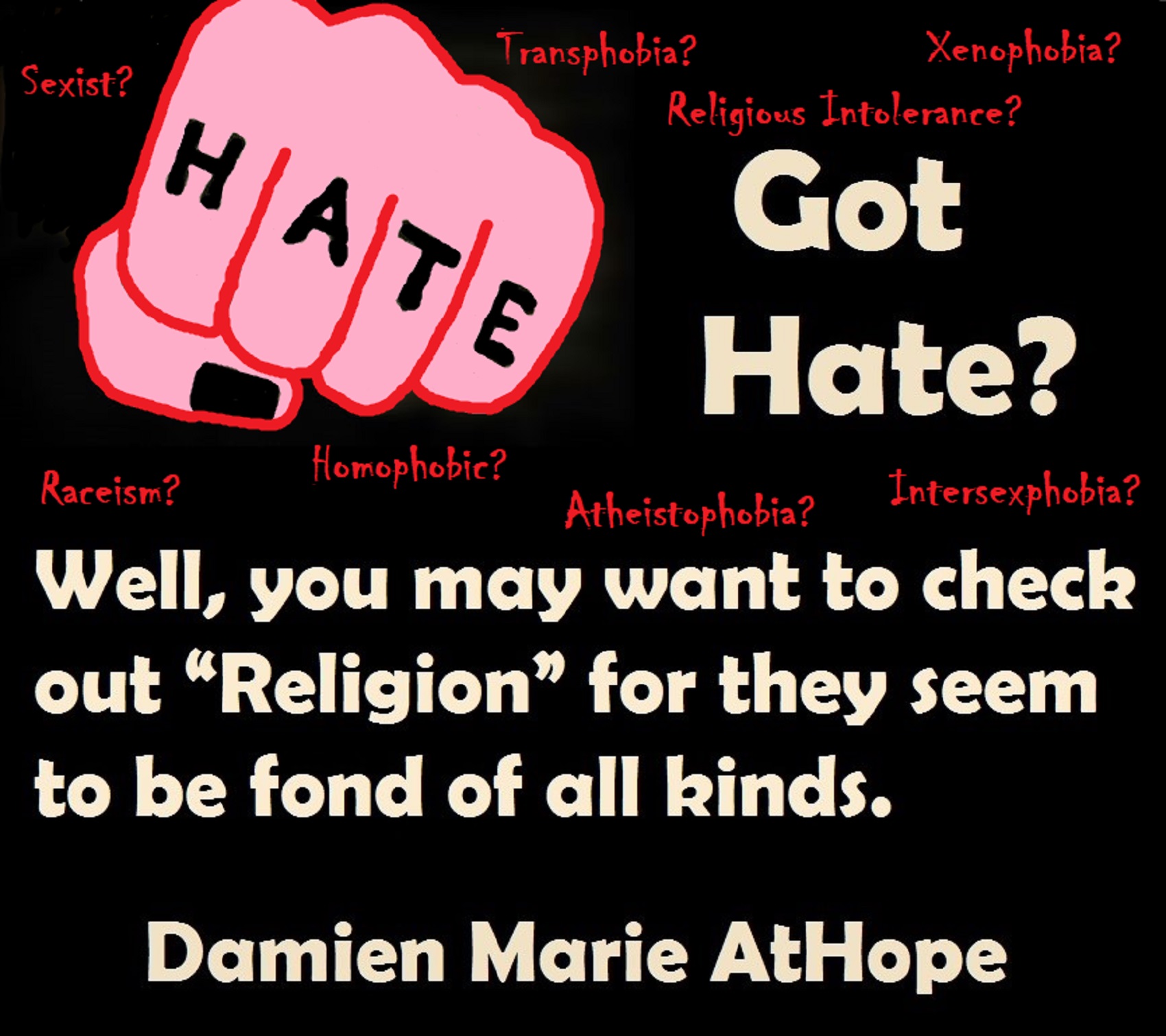
Who gives a fuck?
Small abused hand rising to become a fist, I grab the microphone. Well, me of course. I am brave enough to be kind. As all people of high honor do. How about you? You dare, ask me why I care? FUCK, someone goddamn, had to… Once, I was so foolish, value blind, I added harm, and now, how different I see things, with a value consciousness. I am among the treetops they can’t touch me now for I fly free. I love you all but I am just me.

People don’t commonly teach religious history, even that of their own claimed religion. No, rather they teach a limited “pro their religion” history of their religion from a religious perspective favorable to the religion of choice.

Do you truly think “Religious Belief” is only a matter of some personal choice?
Do you not see how coercive one’s world of choice is limited to the obvious hereditary belief, in most religious choices available to the child of religious parents or caregivers? Religion is more commonly like a family, culture, society, etc. available belief that limits the belief choices of the child and that is when “Religious Belief” is not only a matter of some personal choice and when it becomes hereditary faith, not because of the quality of its alleged facts or proposed truths but because everyone else important to the child believes similarly so they do as well simply mimicking authority beliefs handed to them. Because children are raised in religion rather than being presented all possible choices but rather one limited dogmatic brand of “Religious Belief” where children only have a choice of following the belief as instructed, and then personally claim the faith hereditary belief seen in the confirming to the belief they have held themselves all their lives. This is obvious in statements asked and answered by children claiming a faith they barely understand but they do understand that their family believes “this or that” faith, so they feel obligated to believe it too. While I do agree that “Religious Belief” should only be a matter of some personal choice, it rarely is… End Hereditary Religion!

Animism: Respecting the Living World by Graham Harvey
“How have human cultures engaged with and thought about animals, plants, rocks, clouds, and other elements in their natural surroundings? Do animals and other natural objects have a spirit or soul? What is their relationship to humans? In this new study, Graham Harvey explores current and past animistic beliefs and practices of Native Americans, Maori, Aboriginal Australians, and eco-pagans. He considers the varieties of animism found in these cultures as well as their shared desire to live respectfully within larger natural communities. Drawing on his extensive casework, Harvey also considers the linguistic, performative, ecological, and activist implications of these different animisms.” ref

We are like believing machines we vacuum up ideas, like Velcro sticks to almost everything. We accumulate beliefs that we allow to negatively influence our lives, often without realizing it. Our willingness must be to alter skewed beliefs that impend our balance or reason, which allows us to achieve new positive thinking and accurate outcomes.

My thoughts on Religion Evolution with external links for more info:
- (Pre-Animism Africa mainly, but also Europe, and Asia at least 300,000 years ago), (Pre-Animism – Oxford Dictionaries)
- (Animism Africa around 100,000 years ago), (Animism – Britannica.com)
- (Totemism Europe around 50,000 years ago), (Totemism – Anthropology)
- (Shamanism Siberia around 30,000 years ago), (Shamanism – Britannica.com)
- (Paganism Turkey around 12,000 years ago), (Paganism – BBC Religion)
- (Progressed Organized Religion “Institutional Religion” Egypt around 5,000 years ago), (Ancient Egyptian Religion – Britannica.com)
- (CURRENT “World” RELIGIONS after 4,000 years ago) (Origin of Major Religions – Sacred Texts)
- (Early Atheistic Doubting at least by 2,600 years ago) (History of Atheism – Wikipedia)
“Religion is an Evolved Product” and Yes, Religion is Like Fear Given Wings…
Atheists talk about gods and religions for the same reason doctors talk about cancer, they are looking for a cure, or a firefighter talks about fires because they burn people and they care to stop them. We atheists too often feel a need to help the victims of mental slavery, held in the bondage that is the false beliefs of gods and the conspiracy theories of reality found in religions.
Understanding Religion Evolution:
- Pre-Animism (at least 300,000 years ago)
- Animism (Africa: 100,000 years ago)
- Totemism (Europe: 50,000 years ago)
- Shamanism (Siberia: 30,000 years ago)
- Paganism (Turkey: 12,000 years ago)
- Progressed organized religion (Egypt: 5,000 years ago), (Egypt, the First Dynasty 5,150 years ago)
- CURRENT “World” RELIGIONS (after 4,000 years ago)
- Early Atheistic Doubting (at least by 2,600 years ago)
“An Archaeological/Anthropological Understanding of Religion Evolution”
It seems ancient peoples had to survived amazing threats in a “dangerous universe (by superstition perceived as good and evil),” and human “immorality or imperfection of the soul” which was thought to affect the still living, leading to ancestor worship. This ancestor worship presumably led to the belief in supernatural beings, and then some of these were turned into the belief in gods. This feeble myth called gods were just a human conceived “made from nothing into something over and over, changing, again and again, taking on more as they evolve, all the while they are thought to be special,” but it is just supernatural animistic spirit-belief perceived as sacred.
Quick Evolution of Religion?
Pre-Animism (at least 300,000 years ago) pre-religion is a beginning that evolves into later Animism. So, Religion as we think of it, to me, all starts in a general way with Animism (Africa: 100,000 years ago) (theoretical belief in supernatural powers/spirits), then this is physically expressed in or with Totemism (Europe: 50,000 years ago) (theoretical belief in mythical relationship with powers/spirits through a totem item), which then enlists a full-time specific person to do this worship and believed interacting Shamanism (Siberia/Russia: 30,000 years ago) (theoretical belief in access and influence with spirits through ritual), and then there is the further employment of myths and gods added to all the above giving you Paganism (Turkey: 12,000 years ago) (often a lot more nature-based than most current top world religions, thus hinting to their close link to more ancient religious thinking it stems from). My hypothesis is expressed with an explanation of the building of a theatrical house (modern religions development). Progressed organized religion (Egypt: 5,000 years ago) with CURRENT “World” RELIGIONS (after 4,000 years ago).
Historically, in large city-state societies (such as Egypt or Iraq) starting around 5,000 years ago culminated to make religion something kind of new, a sociocultural-governmental-religious monarchy, where all or at least many of the people of such large city-state societies seem familiar with and committed to the existence of “religion” as the integrated life identity package of control dynamics with a fixed closed magical doctrine, but this juggernaut integrated religion identity package of Dogmatic-Propaganda certainly did not exist or if developed to an extent it was highly limited in most smaller prehistoric societies as they seem to lack most of the strong control dynamics with a fixed closed magical doctrine (magical beliefs could be at times be added or removed). Many people just want to see developed religious dynamics everywhere even if it is not. Instead, all that is found is largely fragments until the domestication of religion.
Religions, as we think of them today, are a new fad, even if they go back to around 6,000 years in the timeline of human existence, this amounts to almost nothing when seen in the long slow evolution of religion at least around 70,000 years ago with one of the oldest ritual worship. Stone Snake of South Africa: “first human worship” 70,000 years ago. This message of how religion and gods among them are clearly a man-made thing that was developed slowly as it was invented and then implemented peace by peace discrediting them all. Which seems to be a simple point some are just not grasping how devastating to any claims of truth when we can see the lie clearly in the archeological sites.
I wish people fought as hard for the actual values as they fight for the group/clan names political or otherwise they think support values. Every amount spent on war is theft to children in need of food or the homeless kept from shelter.
Here are several of my blog posts on history:
- To Find Truth You Must First Look
- (Magdalenian/Iberomaurusian) Connections to the First Paganists of the early Neolithic Near East Dating from around 17,000 to 12,000 Years Ago
- Natufians: an Ancient People at the Origins of Agriculture and Sedentary Life
- Possible Clan Leader/Special “MALE” Ancestor Totem Poles At Least 13,500 years ago?
- Jewish People with DNA at least 13,200 years old, Judaism, and the Origins of Some of its Ideas
- Baltic Reindeer Hunters: Swiderian, Lyngby, Ahrensburgian, and Krasnosillya cultures 12,020 to 11,020 years ago are evidence of powerful migratory waves during the last 13,000 years and a genetic link to Saami and the Finno-Ugric peoples.
- The Rise of Inequality: patriarchy and state hierarchy inequality
- Fertile Crescent 12,500 – 9,500 Years Ago: fertility and death cult belief system?
- 12,400 – 11,700 Years Ago – Kortik Tepe (Turkey) Pre/early-Agriculture Cultic Ritualism
- Ritualistic Bird Symbolism at Gobekli Tepe and its “Ancestor Cult”
- Male-Homosexual (female-like) / Trans-woman (female) Seated Figurine from Gobekli Tepe
- Could a 12,000-year-old Bull Geoglyph at Göbekli Tepe relate to older Bull and Female Art 25,000 years ago and Later Goddess and the Bull cults like Catal Huyuk?
- Sedentism and the Creation of goddesses around 12,000 years ago as well as male gods after 7,000 years ago.
- Alcohol, where Agriculture and Religion Become one? Such as Gobekli Tepe’s Ritualistic use of Grain as Food and Ritual Drink
- Neolithic Ritual Sites with T-Pillars and other Cultic Pillars
- Paganism: Goddesses around 12,000 years ago then Male Gods after 7,000 years ago
- First Patriarchy: Split of Women’s Status around 12,000 years ago & First Hierarchy: fall of Women’s Status around 5,000 years ago.
- Natufians: an Ancient People at the Origins of Agriculture and Sedentary Life
- J DNA and the Spread of Agricultural Religion (paganism)
- Paganism: an approximately 12,000-year-old belief system
- Paganism 12,000 years old: related to “Anarchism and Socialism” (Pre-Capitalism)
- Shaman burial in Israel 12,000 years ago and the Shamanism Phenomena
- Need to Mythicized: gods and goddesses
- 12,000 – 7,000 Years Ago – Paleo-Indian Culture (The Americas)
- 12,000 – 2,000 Years Ago – Indigenous-Scandinavians (Nordic)
- Norse did not wear helmets with horns?
- Pre-Pottery Neolithic Skull Cult around 11,500 to 8,400 Years Ago?
- 10,400 – 10,100 Years Ago, in Turkey the Nevail Cori Religious Settlement
- 9,000-6,500 Years Old Submerged Pre-Pottery/Pottery Neolithic Ritual Settlements off Israel’s Coast
- Catal Huyuk “first religious designed city” around 9,500 to 7,700 years ago (Turkey)
- Cultic Hunting at Catal Huyuk “first religious designed city”
- Special Items and Art as well as Special Elite Burials at Catal Huyuk
- New Rituals and Violence with the appearance of Pottery and People?
- Haplogroup N and its related Uralic Languages and Cultures
- Ainu people, Sámi people, Native Americans, the Ancient North Eurasians, and Paganistic-Shamanism with Totemism
- Ideas, Technology and People from Turkey, Europe, to China and Back again 9,000 to 5,000 years ago?
- First Pottery of Europe and the Related Cultures
- 9,000 years old Neolithic Artifacts Judean Desert and Hills Israel
- 9,000-7,000 years-old Sex and Death Rituals: Cult Sites in Israel, Jordan, and the Sinai
- 9,000-8500 year old Horned Female shaman Bad Dürrenberg Germany
- Neolithic Jewelry and the Spread of Farming in Europe Emerging out of West Turkey
- 8,600-year-old Tortoise Shells in Neolithic graves in central China have Early Writing and Shamanism
- Swing of the Mace: the rise of Elite, Forced Authority, and Inequality begin to Emerge 8,500 years ago?
- Migrations and Changing Europeans Beginning around 8,000 Years Ago
- My “Steppe-Anatolian-Kurgan hypothesis” 8,000/7,000 years ago
- Around 8,000-year-old Shared Idea of the Mistress of Animals, “Ritual” Motif
- Pre-Columbian Red-Paint (red ochre) Maritime Archaic Culture 8,000-3,000 years ago
- 7,522-6,522 years ago Linear Pottery culture which I think relates to Arcane Capitalism’s origins
- Arcane Capitalism: Primitive socialism, Primitive capital, Private ownership, Means of production, Market capitalism, Class discrimination, and Petite bourgeoisie (smaller capitalists)
- 7,500-4,750 years old Ritualistic Cucuteni-Trypillian culture of Moldova, Romania, and Ukraine
- Roots of a changing early society 7,200-6,700 years ago Jordan and Israel
- Agriculture religion (Paganism) with farming reached Britain between about 7,000 to 6,500 or so years ago and seemingly expressed in things like Western Europe’s Long Barrows
- My Thoughts on Possible Migrations of “R” DNA and Proto-Indo-European?
- “Millet” Spreading from China 7,022 years ago to Europe and related Language may have Spread with it leading to Proto-Indo-European
- Proto-Indo-European (PIE), ancestor of Indo-European languages: DNA, Society, Language, and Mythology
- The Dnieper–Donets culture and Asian varieties of Millet from China to the Black Sea region of Europe by 7,022 years ago
- Kurgan 6,000 years ago/dolmens 7,000 years ago: funeral, ritual, and other?
- 7,020 to 6,020-year-old Proto-Indo-European Homeland of Urheimat or proposed home of their Language and Religion
- Ancient Megaliths: Kurgan, Ziggurat, Pyramid, Menhir, Trilithon, Dolman, Kromlech, and Kromlech of Trilithons
- The Mytheme of Ancient North Eurasian Sacred-Dog belief and similar motifs are found in Indo-European, Native American, and Siberian comparative mythology
- Elite Power Accumulation: Ancient Trade, Tokens, Writing, Wealth, Merchants, and Priest-Kings
- Sacred Mounds, Mountains, Kurgans, and Pyramids may hold deep connections?
- Between 7,000-5,000 Years ago, rise of unequal hierarchy elite, leading to a “birth of the State” or worship of power, strong new sexism, oppression of non-elites, and the fall of Women’s equal status
- Paganism 7,000-5,000 years old: related to “Anarchism and Socialism” (Capitalism) (World War 0) Elite & their slaves
- Hell and Underworld mythologies starting maybe as far back as 7,000 to 5,000 years ago with the Proto-Indo-Europeans?
- The First Expression of the Male God around 7,000 years ago?
- White (light complexion skin) Bigotry and Sexism started 7,000 years ago?
- Around 7,000-year-old Shared Idea of the Divine Bird (Tutelary and/or Trickster spirit/deity), “Ritual” Motif
- Nekhbet an Ancient Egyptian Vulture Goddess and Tutelary Deity
- 6,720 to 4,920 years old Ritualistic Hongshan Culture of Inner Mongolia with 5,000-year-old Pyramid Mounds and Temples
- First proto-king in the Balkans, Varna culture around 6,500 years ago?
- 6,500–5,800 years ago in Israel Late Chalcolithic (Copper Age) Period in the Southern Levant Seems to Express Northern Levant Migrations, Cultural and Religious Transfer
- KING OF BEASTS: Master of Animals “Ritual” Motif, around 6,000 years old or older…
- Around 6000-year-old Shared Idea of the Solid Wheel & the Spoked Wheel-Shaped Ritual Motif
- “The Ghassulian Star,” a mysterious 6,000-year-old mural from Jordan; a Proto-Star of Ishtar, Star of Inanna or Star of Venus?
- Religious/Ritual Ideas, including goddesses and gods as well as ritual mounds or pyramids from Northeastern Asia at least 6,000 years old, seemingly filtering to Iran, Iraq, the Mediterranean, Europe, Egypt, and the Americas?
- Maykop (5,720–5,020 years ago) Caucasus region Bronze Age culture-related to Copper Age farmers from the south, influenced by the Ubaid period and Leyla-Tepe culture, as well as influencing the Kura-Araxes culture
- 5-600-year-old Tomb, Mummy, and First Bearded Male Figurine in a Grave
- Kura-Araxes Cultural 5,520 to 4,470 years old DNA traces to the Canaanites, Arabs, and Jews
- Minoan/Cretan (Keftiu) Civilization and Religion around 5,520 to 3,120 years ago
- Evolution Of Science at least by 5,500 years ago
- 5,500 Years old birth of the State, the rise of Hierarchy, and the fall of Women’s status
- “Jiroft culture” 5,100 – 4,200 years ago and the History of Iran
- Stonehenge: Paganistic Burial and Astrological Ritual Complex, England (5,100-3,600 years ago)
- Around 5,000-year-old Shared Idea of the “Tree of Life” Ritual Motif
- Complex rituals for elite, seen from China to Egypt, at least by 5,000 years ago
- Around 5,000 years ago: “Birth of the State” where Religion gets Military Power and Influence
- The Center of the World “Axis Mundi” and/or “Sacred Mountains” Mythology Could Relate to the Altai Mountains, Heart of the Steppe
- Progressed organized religion starts, an approximately 5,000-year-old belief system
- China’s Civilization between 5,000-3,000 years ago, was a time of war and class struggle, violent transition from free clans to a Slave or Elite society
- Origin of Logics is Naturalistic Observation at least by around 5,000 years ago.
- Paganism 5,000 years old: progressed organized religion and the state: related to “Anarchism and Socialism” (Kings and the Rise of the State)
- Ziggurats (multi-platform temples: 4,900 years old) to Pyramids (multi-platform tombs: 4,700 years old)
- Did a 4,520–4,420-year-old Volcano In Turkey Inspire the Bible God?
- Finland’s Horned Shaman and Pre-Horned-God at least 4,500 years ago?
- 4,000-year-Old Dolmens in Israel: A Connected Dolmen Religious Phenomenon?
- Creation myths: From chaos, Ex nihilo, Earth-diver, Emergence, World egg, and World parent
- Bronze Age “Ritual” connections of the Bell Beaker culture with the Corded Ware/Single Grave culture, which were related to the Yamnaya culture and Proto-Indo-European Languages/Religions
- Low Gods (Earth/ Tutelary deity), High Gods (Sky/Supreme deity), and Moralistic Gods (Deity enforcement/divine order)
- The exchange of people, ideas, and material-culture including, to me, the new god (Sky Father) and goddess (Earth Mother) religion between the Cucuteni-Trypillians and others which is then spread far and wide
- Koryaks: Indigenous People of the Russian Far East and Big Raven myths also found in Tlingit, Haida, Tsimshian, and other Indigenous People of North America
- 42 Principles Of Maat (Egyptian Goddess of the justice) around 4,400 years ago, 2000 Years Before Ten Commandments
- “Happy Easter” Well Happy Eostre/Ishter
- 4,320-3,820 years old “Shimao” (North China) site with Totemistic-Shamanistic Paganism and a Stepped Pyramid
- 4,250 to 3,400 Year old Stonehenge from Russia: Arkaim?
- 4,100-year-old beaker with medicinal & flowering plants in a grave of a woman in Scotland
- Early European Farmer ancestry, Kelif el Boroud people with the Cardial Ware culture, and the Bell Beaker culture Paganists too, spread into North Africa, then to the Canary Islands off West Africa
- Flood Accounts: Gilgamesh epic (4,100 years ago) Noah in Genesis (2,600 years ago)
- Paganism 4,000 years old: related to “Anarchism and Socialism” (First Moralistic gods, then the Origin time of Monotheism)
- When was the beginning: TIMELINE OF CURRENT RELIGIONS, which start around 4,000 years ago.
- Early Religions Thought to Express Proto-Monotheistic Systems around 4,000 years ago
- Kultepe? An archaeological site with a 4,000 years old women’s rights document.
- Single God Religions (Monotheism) = “Man-o-theism” started around 4,000 years ago with the Great Sky Spirit/God Tiān (天)?
- Confucianism’s Tiān (Shangdi god 4,000 years old): Supernaturalism, Pantheism or Theism?
- Yes, Your Male God is Ridiculous
- Mythology, a Lunar Deity is a Goddess or God of the Moon
- Sacred Land, Hills, and Mountains: Sami Mythology (Paganistic Shamanism)
- Horse Worship/Sacrifice: mythical union of Ruling Elite/Kingship and the Horse
- The Amorite/Amurru people’s God Amurru “Lord of the Steppe”, relates to the Origins of the Bible God?
- Bronze Age Exotic Trade Routes Spread Quite Far as well as Spread Religious Ideas with Them
- Sami and the Northern Indigenous Peoples Landscape, Language, and its Connection to Religion
- Prototype of Ancient Analemmatic Sundials around 3,900-3,150 years ago and a Possible Solar Connection to gods?
- Judaism is around 3,450 or 3,250 years old. (“Paleo-Hebrew” 3,000 years ago and Torah 2,500 years ago)
- The Weakening of Ancient Trade and the Strengthening of Religions around 3000 years ago?
- Are you aware that there are religions that worship women gods, explain now religion tears women down?
- Animistic, Totemistic, and Paganistic Superstition Origins of bible god and the bible’s Religion.
- Myths and Folklore: “Trickster gods and goddesses”
- Jews, Judaism, and the Origins of Some of its Ideas
- An Old Branch of Religion Still Giving Fruit: Sacred Trees
- Dating the BIBLE: naming names and telling times (written less than 3,000 years ago, provable to 2,200 years ago)
- Did a Volcano Inspire the bible god?
- Dené–Yeniseian language, Old Copper Complex, and Pre-Columbian Mound Builders?
- No “dinosaurs and humans didn’t exist together just because some think they are in the bible itself”
- Sacred Shit and Sacred Animals?
- Everyone Killed in the Bible Flood? “Nephilim” (giants)?
- Hey, Damien dude, I have a question for you regarding “the bible” Exodus.
- Archaeology Disproves the Bible
- Bible Battle, Just More, Bible Babble
- The Jericho Conquest lie?
- Canaanites and Israelites?
- Accurate Account on how did Christianity Began?
- Let’s talk about Christianity.
- So the 10 commandments isn’t anything to go by either right?
- Misinformed christian
- Debunking Jesus?
- Paulism vs Jesus
- Ok, you seem confused so let’s talk about Buddhism.
- Unacknowledged Buddhism: Gods, Savior, Demons, Rebirth, Heavens, Hells, and Terrorism
- His Foolishness The Dalai Lama
- Yin and Yang is sexist with an ORIGIN around 2,300 years ago?
- I Believe Archaeology, not Myths & Why Not, as the Religious Myths Already Violate Reason!
- Archaeological, Scientific, & Philosophic evidence shows the god myth is man-made nonsense.
- Aquatic Ape Theory/Hypothesis? As Always, Just Pseudoscience.
- Ancient Aliens Conspiracy Theorists are Pseudohistorians
- The Pseudohistoric and Pseudoscientific claims about “Bakoni Ruins” of South Africa
- Why do people think Religion is much more than supernaturalism and superstitionism?
- Religion is an Evolved Product
- Was the Value of Ancient Women Different?
- 1000 to 1100 CE, human sacrifice Cahokia Mounds a pre-Columbian Native American site
- Feminist atheists as far back as the 1800s?
- Promoting Religion as Real is Mentally Harmful to a Flourishing Humanity
- Screw All Religions and Their Toxic lies, they are all fraud
- Forget Religions’ Unfounded Myths, I Have Substantiated “Archaeology Facts.”
- Religion Dispersal throughout the World
- I Hate Religion Just as I Hate all Pseudoscience
- Exposing Scientology, Eckankar, Wicca and Other Nonsense?
- Main deity or religious belief systems
- Quit Trying to Invent Your God From the Scraps of Science.
- Archaeological, Scientific, & Philosophic evidence shows the god myth is man-made nonsense.
- Ancient Alien Conspiracy Theorists: Misunderstanding, Rhetoric, Misinformation, Fabrications, and Lies
- Misinformation, Distortion, and Pseudoscience in Talking with a Christian Creationist
- Judging the Lack of Goodness in Gods, Even the Norse God Odin
- Challenging the Belief in God-like Aliens and Gods in General
- A Challenge to Christian use of Torture Devices?
- Yes, Hinduism is a Religion
- Trump is One of the Most Reactionary Forces of Far-right Christian Extremism
- Was the Bull Head a Symbol of God? Yes!
- Primate Death Rituals
- Christian – “God and Christianity are objectively true”
- Australopithecus afarensis Death Ritual?
- You Claim Global Warming is a Hoax?
- Doubter of Science and Defamer of Atheists?
- I think that sounds like the Bible?
- History of the Antifa (“anti-fascist”) Movements
- Indianapolis Anti-Blasphemy Laws #Free Soheil Rally
- Damien, you repeat the golden rule in so many forms then you say religion is dogmatic?
- Science is a Trustable Methodology whereas Faith is not Trustable at all!
- Was I ever a believer, before I was an atheist?
- Atheists rise in reason
- Mistrust of science?
- Open to Talking About the Definition of ‘God’? But first, we address Faith.
- ‘United Monarchy’ full of splendor and power – Saul, David, and Solomon? Most likely not.
- Is there EXODUS ARCHAEOLOGY? The short answer is “no.”
- Lacking Proof of Bigfoots, Unicorns, and Gods is Just a Lack of Research?
- Religion and Politics: Faith Beliefs vs. Rational Thinking
- Hammer of Truth that lying pig RELIGION: challenged by an archaeologist
- “The Hammer of Truth” -ontology question- What do You Mean by That?
- Navigation of a bad argument: Ad Hominem vs. Attack
- Why is it Often Claimed that Gods have a Gender?
- Why are basically all monotheistic religions ones that have a male god?
- Shifting through the Claims in support of Faith
- Dear Mr. AtHope, The 20th Century is an Indictment of Secularism and a Failed Atheist Century
- An Understanding of the Worldwide Statistics and Dynamics of Terrorist Incidents and Suicide Attacks
- Intoxication and Evolution? Addressing and Assessing the “Stoned Ape” or “Drunken Monkey” Theories as Catalysts in Human Evolution
- Sacred Menstrual cloth? Inanna’s knot, Isis knot, and maybe Ma’at’s feather?
- Damien, why don’t the Hebrews accept the bible stories?
- Dealing with a Troll and Arguing Over Word Meaning
- Knowledge without Belief? Justified beliefs or disbeliefs worthy of Knowledge?
- Afrocentrism and African Religions
- Crecganford @crecganford offers history & stories of the people, places, gods, & culture
- Empiricism-Denier?
I am not an academic. I am a revolutionary that teaches in public, in places like social media, and in the streets. I am not a leader by some title given but from my commanding leadership style of simply to start teaching everywhere to everyone, all manner of positive education.


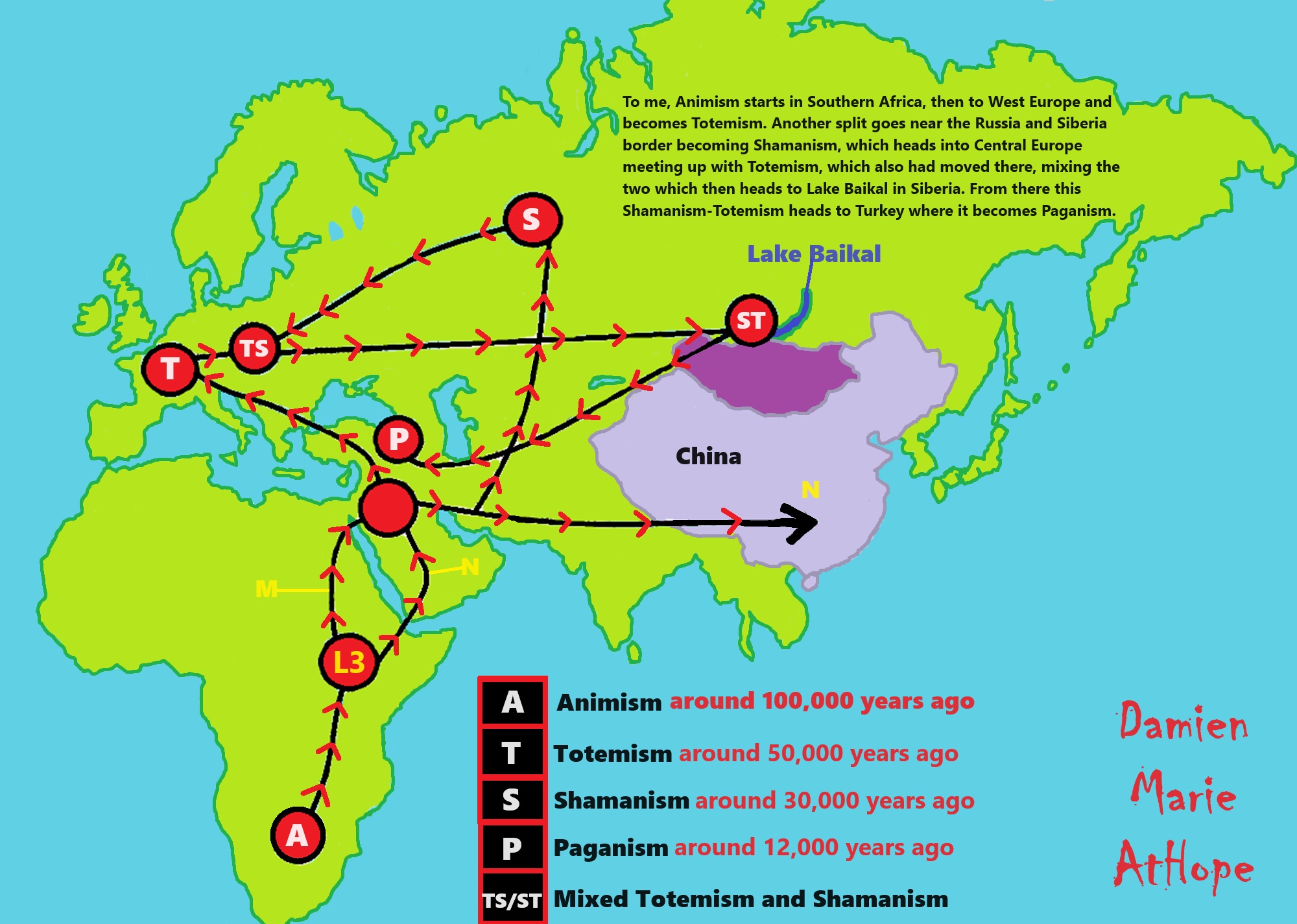
To me, Animism starts in Southern Africa, then to West Europe, and becomes Totemism. Another split goes near the Russia and Siberia border becoming Shamanism, which heads into Central Europe meeting up with Totemism, which also had moved there, mixing the two which then heads to Lake Baikal in Siberia. From there this Shamanism-Totemism heads to Turkey where it becomes Paganism.





Not all “Religions” or “Religious Persuasions” have a god(s) but
All can be said to believe in some imaginary beings or imaginary things like spirits, afterlives, etc.
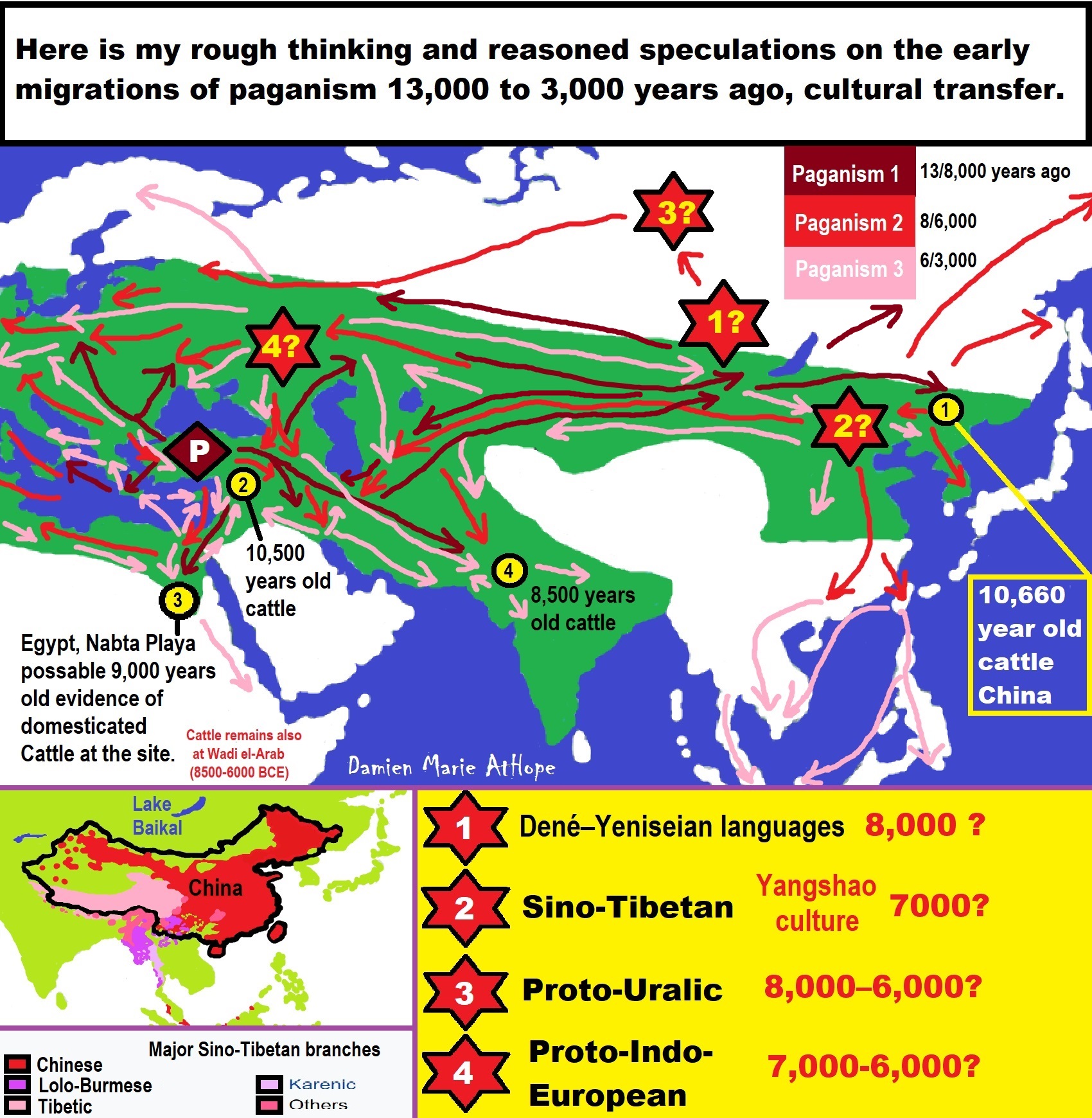
Paganism 12,000-4,000 years old
12,000-7,000 years old: related to (Pre-Capitalism)
7,000-5,000 years old: related to (Capitalism) (World War 0) Elite and their slaves!
5,000 years old: related to (Kings and the Rise of the State)
4,000 years old: related to (First Moralistic gods, then the Origin time of Monotheism)

ref, ref, ref, ref, ref, ref, ref, ref, ref, ref, ref, ref, ref, ref, ref, ref, ref, ref, ref, ref, ref
Low Gods “Earth” or Tutelary deity and High Gods “Sky” or Supreme deity
“An Earth goddess is a deification of the Earth. Earth goddesses are often associated with the “chthonic” deities of the underworld. Ki and Ninhursag are Mesopotamian earth goddesses. In Greek mythology, the Earth is personified as Gaia, corresponding to Roman Terra, Indic Prithvi/Bhūmi, etc. traced to an “Earth Mother” complementary to the “Sky Father” in Proto-Indo-European religion. Egyptian mythology exceptionally has a sky goddess and an Earth god.” ref
“A mother goddess is a goddess who represents or is a personification of nature, motherhood, fertility, creation, destruction or who embodies the bounty of the Earth. When equated with the Earth or the natural world, such goddesses are sometimes referred to as Mother Earth or as the Earth Mother. In some religious traditions or movements, Heavenly Mother (also referred to as Mother in Heaven or Sky Mother) is the wife or feminine counterpart of the Sky father or God the Father.” ref
“Any masculine sky god is often also king of the gods, taking the position of patriarch within a pantheon. Such king gods are collectively categorized as “sky father” deities, with a polarity between sky and earth often being expressed by pairing a “sky father” god with an “earth mother” goddess (pairings of a sky mother with an earth father are less frequent). A main sky goddess is often the queen of the gods and may be an air/sky goddess in her own right, though she usually has other functions as well with “sky” not being her main. In antiquity, several sky goddesses in ancient Egypt, Mesopotamia, and the Near East were called Queen of Heaven. Neopagans often apply it with impunity to sky goddesses from other regions who were never associated with the term historically. The sky often has important religious significance. Many religions, both polytheistic and monotheistic, have deities associated with the sky.” ref
“In comparative mythology, sky father is a term for a recurring concept in polytheistic religions of a sky god who is addressed as a “father”, often the father of a pantheon and is often either a reigning or former King of the Gods. The concept of “sky father” may also be taken to include Sun gods with similar characteristics, such as Ra. The concept is complementary to an “earth mother“. “Sky Father” is a direct translation of the Vedic Dyaus Pita, etymologically descended from the same Proto-Indo-European deity name as the Greek Zeûs Pater and Roman Jupiter and Germanic Týr, Tir or Tiwaz, all of which are reflexes of the same Proto-Indo-European deity’s name, *Dyēus Ph₂tḗr. While there are numerous parallels adduced from outside of Indo-European mythology, there are exceptions (e.g. In Egyptian mythology, Nut is the sky mother and Geb is the earth father).” ref
Tutelary deity
“A tutelary (also tutelar) is a deity or spirit who is a guardian, patron, or protector of a particular place, geographic feature, person, lineage, nation, culture, or occupation. The etymology of “tutelary” expresses the concept of safety and thus of guardianship. In late Greek and Roman religion, one type of tutelary deity, the genius, functions as the personal deity or daimon of an individual from birth to death. Another form of personal tutelary spirit is the familiar spirit of European folklore.” ref
“A tutelary (also tutelar) in Korean shamanism, jangseung and sotdae were placed at the edge of villages to frighten off demons. They were also worshiped as deities. Seonangshin is the patron deity of the village in Korean tradition and was believed to embody the Seonangdang. In Philippine animism, Diwata or Lambana are deities or spirits that inhabit sacred places like mountains and mounds and serve as guardians. Such as: Maria Makiling is the deity who guards Mt. Makiling and Maria Cacao and Maria Sinukuan. In Shinto, the spirits, or kami, which give life to human bodies come from nature and return to it after death. Ancestors are therefore themselves tutelaries to be worshiped. And similarly, Native American beliefs such as Tonás, tutelary animal spirit among the Zapotec and Totems, familial or clan spirits among the Ojibwe, can be animals.” ref
“A tutelary (also tutelar) in Austronesian beliefs such as: Atua (gods and spirits of the Polynesian peoples such as the Māori or the Hawaiians), Hanitu (Bunun of Taiwan‘s term for spirit), Hyang (Kawi, Sundanese, Javanese, and Balinese Supreme Being, in ancient Java and Bali mythology and this spiritual entity, can be either divine or ancestral), Kaitiaki (New Zealand Māori term used for the concept of guardianship, for the sky, the sea, and the land), Kawas (mythology) (divided into 6 groups: gods, ancestors, souls of the living, spirits of living things, spirits of lifeless objects, and ghosts), Tiki (Māori mythology, Tiki is the first man created by either Tūmatauenga or Tāne and represents deified ancestors found in most Polynesian cultures). ” ref, ref, ref, ref, ref, ref, ref
Mesopotamian Tutelary Deities can be seen as ones related to City-States
“Historical city-states included Sumerian cities such as Uruk and Ur; Ancient Egyptian city-states, such as Thebes and Memphis; the Phoenician cities (such as Tyre and Sidon); the five Philistine city-states; the Berber city-states of the Garamantes; the city-states of ancient Greece (the poleis such as Athens, Sparta, Thebes, and Corinth); the Roman Republic (which grew from a city-state into a vast empire); the Italian city-states from the Middle Ages to the early modern period, such as Florence, Siena, Ferrara, Milan (which as they grew in power began to dominate neighboring cities) and Genoa and Venice, which became powerful thalassocracies; the Mayan and other cultures of pre-Columbian Mesoamerica (including cities such as Chichen Itza, Tikal, Copán and Monte Albán); the central Asian cities along the Silk Road; the city-states of the Swahili coast; Ragusa; states of the medieval Russian lands such as Novgorod and Pskov; and many others.” ref
“The Uruk period (ca. 4000 to 3100 BCE; also known as Protoliterate period) of Mesopotamia, named after the Sumerian city of Uruk, this period saw the emergence of urban life in Mesopotamia and the Sumerian civilization. City-States like Uruk and others had a patron tutelary City Deity along with a Priest-King.” ref
“Chinese folk religion, both past, and present, includes myriad tutelary deities. Exceptional individuals, highly cultivated sages, and prominent ancestors can be deified and honored after death. Lord Guan is the patron of military personnel and police, while Mazu is the patron of fishermen and sailors. Such as Tu Di Gong (Earth Deity) is the tutelary deity of a locality, and each individual locality has its own Earth Deity and Cheng Huang Gong (City God) is the guardian deity of an individual city, worshipped by local officials and locals since imperial times.” ref
“A tutelary (also tutelar) in Hinduism, personal tutelary deities are known as ishta-devata, while family tutelary deities are known as Kuladevata. Gramadevata are guardian deities of villages. Devas can also be seen as tutelary. Shiva is the patron of yogis and renunciants. City goddesses include: Mumbadevi (Mumbai), Sachchika (Osian); Kuladevis include: Ambika (Porwad), and Mahalakshmi. In NorthEast India Meitei mythology and religion (Sanamahism) of Manipur, there are various types of tutelary deities, among which Lam Lais are the most predominant ones. Tibetan Buddhism has Yidam as a tutelary deity. Dakini is the patron of those who seek knowledge.” ref
“A tutelary (also tutelar) The Greeks also thought deities guarded specific places: for instance, Athena was the patron goddess of the city of Athens. Socrates spoke of hearing the voice of his personal spirit or daimonion:
You have often heard me speak of an oracle or sign which comes to me … . This sign I have had ever since I was a child. The sign is a voice which comes to me and always forbids me to do something which I am going to do, but never commands me to do anything, and this is what stands in the way of my being a politician.” ref
“Tutelary deities who guard and preserve a place or a person are fundamental to ancient Roman religion. The tutelary deity of a man was his Genius, that of a woman her Juno. In the Imperial era, the Genius of the Emperor was a focus of Imperial cult. An emperor might also adopt a major deity as his personal patron or tutelary, as Augustus did Apollo. Precedents for claiming the personal protection of a deity were established in the Republican era, when for instance the Roman dictator Sulla advertised the goddess Victory as his tutelary by holding public games (ludi) in her honor.” ref
“Each town or city had one or more tutelary deities, whose protection was considered particularly vital in time of war and siege. Rome itself was protected by a goddess whose name was to be kept ritually secret on pain of death (for a supposed case, see Quintus Valerius Soranus). The Capitoline Triad of Juno, Jupiter, and Minerva were also tutelaries of Rome. The Italic towns had their own tutelary deities. Juno often had this function, as at the Latin town of Lanuvium and the Etruscan city of Veii, and was often housed in an especially grand temple on the arx (citadel) or other prominent or central location. The tutelary deity of Praeneste was Fortuna, whose oracle was renowned.” ref
“The Roman ritual of evocatio was premised on the belief that a town could be made vulnerable to military defeat if the power of its tutelary deity were diverted outside the city, perhaps by the offer of superior cult at Rome. The depiction of some goddesses such as the Magna Mater (Great Mother, or Cybele) as “tower-crowned” represents their capacity to preserve the city. A town in the provinces might adopt a deity from within the Roman religious sphere to serve as its guardian, or syncretize its own tutelary with such; for instance, a community within the civitas of the Remi in Gaul adopted Apollo as its tutelary, and at the capital of the Remi (present-day Rheims), the tutelary was Mars Camulus.” ref
Household deity (a kind of or related to a Tutelary deity)
“A household deity is a deity or spirit that protects the home, looking after the entire household or certain key members. It has been a common belief in paganism as well as in folklore across many parts of the world. Household deities fit into two types; firstly, a specific deity – typically a goddess – often referred to as a hearth goddess or domestic goddess who is associated with the home and hearth, such as the ancient Greek Hestia.” ref
“The second type of household deities are those that are not one singular deity, but a type, or species of animistic deity, who usually have lesser powers than major deities. This type was common in the religions of antiquity, such as the Lares of ancient Roman religion, the Gashin of Korean shamanism, and Cofgodas of Anglo-Saxon paganism. These survived Christianisation as fairy-like creatures existing in folklore, such as the Anglo-Scottish Brownie and Slavic Domovoy.” ref
“Household deities were usually worshipped not in temples but in the home, where they would be represented by small idols (such as the teraphim of the Bible, often translated as “household gods” in Genesis 31:19 for example), amulets, paintings, or reliefs. They could also be found on domestic objects, such as cosmetic articles in the case of Tawaret. The more prosperous houses might have a small shrine to the household god(s); the lararium served this purpose in the case of the Romans. The gods would be treated as members of the family and invited to join in meals, or be given offerings of food and drink.” ref
“In many religions, both ancient and modern, a god would preside over the home. Certain species, or types, of household deities, existed. An example of this was the Roman Lares. Many European cultures retained house spirits into the modern period. Some examples of these include:
- Brownie (Scotland and England) or Hob (England) / Kobold (Germany) / Goblin / Hobgoblin
- Domovoy (Slavic)
- Nisse (Norwegian or Danish) / Tomte (Swedish) / Tonttu (Finnish)
- Húsvættir (Norse)” ref
“Although the cosmic status of household deities was not as lofty as that of the Twelve Olympians or the Aesir, they were also jealous of their dignity and also had to be appeased with shrines and offerings, however humble. Because of their immediacy they had arguably more influence on the day-to-day affairs of men than the remote gods did. Vestiges of their worship persisted long after Christianity and other major religions extirpated nearly every trace of the major pagan pantheons. Elements of the practice can be seen even today, with Christian accretions, where statues to various saints (such as St. Francis) protect gardens and grottos. Even the gargoyles found on older churches, could be viewed as guardians partitioning a sacred space.” ref
“For centuries, Christianity fought a mop-up war against these lingering minor pagan deities, but they proved tenacious. For example, Martin Luther‘s Tischreden have numerous – quite serious – references to dealing with kobolds. Eventually, rationalism and the Industrial Revolution threatened to erase most of these minor deities, until the advent of romantic nationalism rehabilitated them and embellished them into objects of literary curiosity in the 19th century. Since the 20th century this literature has been mined for characters for role-playing games, video games, and other fantasy personae, not infrequently invested with invented traits and hierarchies somewhat different from their mythological and folkloric roots.” ref
“In contradistinction to both Herbert Spencer and Edward Burnett Tylor, who defended theories of animistic origins of ancestor worship, Émile Durkheim saw its origin in totemism. In reality, this distinction is somewhat academic, since totemism may be regarded as a particularized manifestation of animism, and something of a synthesis of the two positions was attempted by Sigmund Freud. In Freud’s Totem and Taboo, both totem and taboo are outward expressions or manifestations of the same psychological tendency, a concept which is complementary to, or which rather reconciles, the apparent conflict. Freud preferred to emphasize the psychoanalytic implications of the reification of metaphysical forces, but with particular emphasis on its familial nature. This emphasis underscores, rather than weakens, the ancestral component.” ref
“William Edward Hearn, a noted classicist, and jurist, traced the origin of domestic deities from the earliest stages as an expression of animism, a belief system thought to have existed also in the neolithic, and the forerunner of Indo-European religion. In his analysis of the Indo-European household, in Chapter II “The House Spirit”, Section 1, he states:
The belief which guided the conduct of our forefathers was … the spirit rule of dead ancestors.” ref
“In Section 2 he proceeds to elaborate:
It is thus certain that the worship of deceased ancestors is a vera causa, and not a mere hypothesis. …
In the other European nations, the Slavs, the Teutons, and the Kelts, the House Spirit appears with no less distinctness. … [T]he existence of that worship does not admit of doubt. … The House Spirits had a multitude of other names which it is needless here to enumerate, but all of which are more or less expressive of their friendly relations with man. … In [England] … [h]e is the Brownie. … In Scotland this same Brownie is well known. He is usually described as attached to particular families, with whom he has been known to reside for centuries, threshing the corn, cleaning the house, and performing similar household tasks. His favorite gratification was milk and honey.” ref

ref, ref, ref, ref, ref, ref, ref, ref, ref, ref, ref, ref, ref, ref, ref, ref, ref
“These ideas are my speculations from the evidence.”
I am still researching the “god‘s origins” all over the world. So you know, it is very complicated but I am smart and willing to look, DEEP, if necessary, which going very deep does seem to be needed here, when trying to actually understand the evolution of gods and goddesses. I am sure of a few things and less sure of others, but even in stuff I am not fully grasping I still am slowly figuring it out, to explain it to others. But as I research more I am understanding things a little better, though I am still working on understanding it all or something close and thus always figuring out more.
Sky Father/Sky God?
“Egyptian: (Nut) Sky Mother and (Geb) Earth Father” (Egypt is different but similar)
Turkic/Mongolic: (Tengri/Tenger Etseg) Sky Father and (Eje/Gazar Eej) Earth Mother *Transeurasian*
Hawaiian: (Wākea) Sky Father and (Papahānaumoku) Earth Mother *Austronesian*
New Zealand/ Māori: (Ranginui) Sky Father and (Papatūānuku) Earth Mother *Austronesian*
Proto-Indo-European: (Dyḗus/Dyḗus ph₂tḗr) Sky Father and (Dʰéǵʰōm/Pleth₂wih₁) Earth Mother
Indo-Aryan: (Dyaus Pita) Sky Father and (Prithvi Mata) Earth Mother *Indo-European*
Italic: (Jupiter) Sky Father and (Juno) Sky Mother *Indo-European*
Etruscan: (Tinia) Sky Father and (Uni) Sky Mother *Tyrsenian/Italy Pre–Indo-European*
Hellenic/Greek: (Zeus) Sky Father and (Hera) Sky Mother who started as an “Earth Goddess” *Indo-European*
Nordic: (Dagr) Sky Father and (Nótt) Sky Mother *Indo-European*
Slavic: (Perun) Sky Father and (Mokosh) Earth Mother *Indo-European*
Illyrian: (Deipaturos) Sky Father and (Messapic Damatura’s “earth-mother” maybe) Earth Mother *Indo-European*
Albanian: (Zojz) Sky Father and (?) *Indo-European*
Baltic: (Perkūnas) Sky Father and (Saulė) Sky Mother *Indo-European*
Germanic: (Týr) Sky Father and (?) *Indo-European*
Colombian-Muisca: (Bochica) Sky Father and (Huythaca) Sky Mother *Chibchan*
Aztec: (Quetzalcoatl) Sky Father and (Xochiquetzal) Sky Mother *Uto-Aztecan*
Incan: (Viracocha) Sky Father and (Mama Runtucaya) Sky Mother *Quechuan*
China: (Tian/Shangdi) Sky Father and (Dì) Earth Mother *Sino-Tibetan*
Sumerian, Assyrian and Babylonian: (An/Anu) Sky Father and (Ki) Earth Mother
Finnish: (Ukko) Sky Father and (Akka) Earth Mother *Finno-Ugric*
Sami: (Horagalles) Sky Father and (Ravdna) Earth Mother *Finno-Ugric*
Puebloan-Zuni: (Ápoyan Ta’chu) Sky Father and (Áwitelin Tsíta) Earth Mother
Puebloan-Hopi: (Tawa) Sky Father and (Kokyangwuti/Spider Woman/Grandmother) Earth Mother *Uto-Aztecan*
Puebloan-Navajo: (Tsohanoai) Sky Father and (Estsanatlehi) Earth Mother *Na-Dene*
ref, ref, ref, ref, ref, ref, ref, ref, ref, ref, ref, ref, ref, ref, ref, ref, ref, ref, ref, ref, ref, ref, ref, ref, ref, ref, ref

Hinduism around 3,700 to 3,500 years old. ref
Judaism around 3,450 or 3,250 years old. (The first writing in the bible was “Paleo-Hebrew” dated to around 3,000 years ago Khirbet Qeiyafa is the site of an ancient fortress city overlooking the Elah Valley. And many believe the religious Jewish texts were completed around 2,500) ref, ref
Judaism is around 3,450 or 3,250 years old. (“Paleo-Hebrew” 3,000 years ago and Torah 2,500 years ago)
“Judaism is an Abrahamic, its roots as an organized religion in the Middle East during the Bronze Age. Some scholars argue that modern Judaism evolved from Yahwism, the religion of ancient Israel and Judah, by the late 6th century BCE, and is thus considered to be one of the oldest monotheistic religions.” ref
“Yahwism is the name given by modern scholars to the religion of ancient Israel, essentially polytheistic, with a plethora of gods and goddesses. Heading the pantheon was Yahweh, the national god of the Israelite kingdoms of Israel and Judah, with his consort, the goddess Asherah; below them were second-tier gods and goddesses such as Baal, Shamash, Yarikh, Mot, and Astarte, all of whom had their own priests and prophets and numbered royalty among their devotees, and a third and fourth tier of minor divine beings, including the mal’ak, the messengers of the higher gods, who in later times became the angels of Judaism, Christianity and Islam. Yahweh, however, was not the ‘original’ god of Israel “Isra-El”; it is El, the head of the Canaanite pantheon, whose name forms the basis of the name “Israel”, and none of the Old Testament patriarchs, the tribes of Israel, the Judges, or the earliest monarchs, have a Yahwistic theophoric name (i.e., one incorporating the name of Yahweh).” ref
“El is a Northwest Semitic word meaning “god” or “deity“, or referring (as a proper name) to any one of multiple major ancient Near Eastern deities. A rarer form, ‘ila, represents the predicate form in Old Akkadian and in Amorite. The word is derived from the Proto-Semitic *ʔil-, meaning “god”. Specific deities known as ‘El or ‘Il include the supreme god of the ancient Canaanite religion and the supreme god of East Semitic speakers in Mesopotamia’s Early Dynastic Period. ʼĒl is listed at the head of many pantheons. In some Canaanite and Ugaritic sources, ʼĒl played a role as father of the gods, of creation, or both. For example, in the Ugaritic texts, ʾil mlk is understood to mean “ʼĒl the King” but ʾil hd as “the god Hadad“. The Semitic root ʾlh (Arabic ʾilāh, Aramaic ʾAlāh, ʾElāh, Hebrew ʾelōah) may be ʾl with a parasitic h, and ʾl may be an abbreviated form of ʾlh. In Ugaritic the plural form meaning “gods” is ʾilhm, equivalent to Hebrew ʾelōhîm “powers”. In the Hebrew texts this word is interpreted as being semantically singular for “god” by biblical commentators. However the documentary hypothesis for the Old Testament (corresponds to the Jewish Torah) developed originally in the 1870s, identifies these that different authors – the Jahwist, Elohist, Deuteronomist, and the Priestly source – were responsible for editing stories from a polytheistic religion into those of a monotheistic religion. Inconsistencies that arise between monotheism and polytheism in the texts are reflective of this hypothesis.” ref
Jainism around 2,599 – 2,527 years old. ref
Confucianism around 2,600 – 2,551 years old. ref
Buddhism around 2,563/2,480 – 2,483/2,400 years old. ref
Christianity around 2,o00 years old. ref
Shinto around 1,305 years old. ref
Islam around 1407–1385 years old. ref

Knowledge to Ponder:
Stars/Astrology:
- Possibly, around 30,000 years ago (in simpler form) to 6,000 years ago, Stars/Astrology are connected to Ancestors, Spirit Animals, and Deities.
- The star also seems to be a possible proto-star for Star of Ishtar, Star of Inanna, or Star of Venus.
- Around 7,000 to 6,000 years ago, Star Constellations/Astrology have connections to the “Kurgan phenomenon” of below-ground “mound” stone/wood burial structures and “Dolmen phenomenon” of above-ground stone burial structures.
- Around 6,500–5,800 years ago, The Northern Levant migrations into Jordon and Israel in the Southern Levant brought new cultural and religious transfer from Turkey and Iran.
- “The Ghassulian Star,” a mysterious 6,000-year-old mural from Jordan may have connections to the European paganstic kurgan/dolmens phenomenon.
“Astrology is a range of divinatory practices, recognized as pseudoscientific since the 18th century, that claim to discern information about human affairs and terrestrial events by studying the apparent positions of celestial objects. Different cultures have employed forms of astrology since at least the 2nd millennium BCE, these practices having originated in calendrical systems used to predict seasonal shifts and to interpret celestial cycles as signs of divine communications. Most, if not all, cultures have attached importance to what they observed in the sky, and some—such as the Hindus, Chinese, and the Maya—developed elaborate systems for predicting terrestrial events from celestial observations. Western astrology, one of the oldest astrological systems still in use, can trace its roots to 19th–17th century BCE Mesopotamia, from where it spread to Ancient Greece, Rome, the Islamicate world and eventually Central and Western Europe. Contemporary Western astrology is often associated with systems of horoscopes that purport to explain aspects of a person’s personality and predict significant events in their lives based on the positions of celestial objects; the majority of professional astrologers rely on such systems.” ref
Around 5,500 years ago, Science evolves, The first evidence of science was 5,500 years ago and was demonstrated by a body of empirical, theoretical, and practical knowledge about the natural world. ref
Around 5,000 years ago, Origin of Logics is a Naturalistic Observation (principles of valid reasoning, inference, & demonstration) ref
Around 4,150 to 4,000 years ago: The earliest surviving versions of the Sumerian Epic of Gilgamesh, which was originally titled “He who Saw the Deep” (Sha naqba īmuru) or “Surpassing All Other Kings” (Shūtur eli sharrī) were written. ref
Hinduism:
- 3,700 years ago or so, the oldest of the Hindu Vedas (scriptures), the Rig Veda was composed.
- 3,500 years ago or so, the Vedic Age began in India after the collapse of the Indus Valley Civilization.
Judaism:
- around 3,000 years ago, the first writing in the bible was “Paleo-Hebrew”
- around 2,500 years ago, many believe the religious Jewish texts were completed
Myths: The bible inspired religion is not just one religion or one myth but a grouping of several religions and myths
- Around 3,450 or 3,250 years ago, according to legend, is the traditionally accepted period in which the Israelite lawgiver, Moses, provided the Ten Commandments.
- Around 2,500 to 2,400 years ago, a collection of ancient religious writings by the Israelites based primarily upon the Hebrew Bible, Tanakh, or Old Testament is the first part of Christianity’s bible.
- Around 2,400 years ago, the most accepted hypothesis is that the canon was formed in stages, first the Pentateuch (Torah).
- Around 2,140 to 2,116 years ago, the Prophets was written during the Hasmonean dynasty, and finally the remaining books.
- Christians traditionally divide the Old Testament into four sections:
- The first five books or Pentateuch (Torah).
- The proposed history books telling the history of the Israelites from their conquest of Canaan to their defeat and exile in Babylon.
- The poetic and proposed “Wisdom books” dealing, in various forms, with questions of good and evil in the world.
- The books of the biblical prophets, warning of the consequences of turning away from God:
- Henotheism:
- Exodus 20:23 “You shall not make other gods besides Me (not saying there are no other gods just not to worship them); gods of silver or gods of gold, you shall not make for yourselves.”
- Polytheism:
- Judges 10:6 “Then the sons of Israel again did evil in the sight of the LORD, served the Baals and the Ashtaroth, the gods of Aram, the gods of Sidon, the gods of Moab, the gods of the sons of Ammon, and the gods of the Philistines; thus they forsook the LORD and did not serve Him.”
- 1 Corinthians 8:5 “For even if there are so-called gods whether in heaven or on earth, as indeed there are many gods and many lords.”
- Monotheism:
- Isaiah 43:10 “You are my witnesses,” declares the LORD, “and my servant whom I have chosen, so that you may know and believe me and understand that I am he. Before me no god was formed, nor will there be one after me.
Around 2,570 to 2,270 Years Ago, there is a confirmation of atheistic doubting as well as atheistic thinking, mainly by Greek philosophers. However, doubting gods is likely as old as the invention of gods and should destroy the thinking that belief in god(s) is the “default belief”. The Greek word is apistos (a “not” and pistos “faithful,”), thus not faithful or faithless because one is unpersuaded and unconvinced by a god(s) claim. Short Definition: unbelieving, unbeliever, or unbelief.

Expressions of Atheistic Thinking:
- Around 2,600 years ago, Ajita Kesakambali, ancient Indian philosopher, who is the first known proponent of Indian materialism. ref
- Around 2,535 to 2,475 years ago, Heraclitus, Greek pre-Socratic philosopher, a native of the Greek city Ephesus, Ionia, on the coast of Anatolia, also known as Asia Minor or modern Turkey. ref
- Around 2,500 to 2,400 years ago, according to The Story of Civilization book series certain African pygmy tribes have no identifiable gods, spirits, or religious beliefs or rituals, and even what burials accrue are without ceremony. ref
- Around 2,490 to 2,430 years ago, Empedocles, Greek pre-Socratic philosopher and a citizen of Agrigentum, a Greek city in Sicily. ref
- Around 2,460 to 2,370 years ago, Democritus, Greek pre-Socratic philosopher considered to be the “father of modern science” possibly had some disbelief amounting to atheism. ref
- Around 2,399 years ago or so, Socrates, a famous Greek philosopher was tried for sinfulness by teaching doubt of state gods. ref
- Around 2,341 to 2,270 years ago, Epicurus, a Greek philosopher known for composing atheistic critics and famously stated, “Is God willing to prevent evil, but not able? Then he is not omnipotent. Is he able, but not willing? Then he is malevolent. Is he both able and willing? Then whence cometh evil? Is he neither able nor willing? Then why call him god?” ref
This last expression by Epicurus, seems to be an expression of Axiological Atheism. To understand and utilize value or actually possess “Value Conscious/Consciousness” to both give a strong moral “axiological” argument (the problem of evil) as well as use it to fortify humanism and positive ethical persuasion of human helping and care responsibilities. Because value-blindness gives rise to sociopathic/psychopathic evil.

“Theists, there has to be a god, as something can not come from nothing.”
Well, thus something (unknown) happened and then there was something. This does not tell us what the something that may have been involved with something coming from nothing. A supposed first cause, thus something (unknown) happened and then there was something is not an open invitation to claim it as known, neither is it justified to call or label such an unknown as anything, especially an unsubstantiated magical thinking belief born of mythology and religious storytelling.


While hallucinogens are associated with shamanism, it is alcohol that is associated with paganism.
The Atheist-Humanist-Leftist Revolutionaries Shows in the prehistory series:
Show two: Pre-animism 300,000 years old and animism 100,000 years old: related to “Anarchism and Socialism”
Show tree: Totemism 50,000 years old: related to “Anarchism and Socialism”
Show four: Shamanism 30,000 years old: related to “Anarchism and Socialism”
Show five: Paganism 12,000 years old: related to “Anarchism and Socialism”
Show six: Emergence of hierarchy, sexism, slavery, and the new male god dominance: Paganism 7,000-5,000 years old: related to “Anarchism and Socialism” (Capitalism) (World War 0) Elite and their slaves!
Prehistory: related to “Anarchism and Socialism” the division of labor, power, rights, and recourses: VIDEO
Pre-animism 300,000 years old and animism 100,000 years old: related to “Anarchism and Socialism”: VIDEO
Totemism 50,000 years old: related to “Anarchism and Socialism”: VIDEO
Shamanism 30,000 years old: related to “Anarchism and Socialism”: VIDEO
Paganism 12,000 years old: related to “Anarchism and Socialism” (Pre-Capitalism): VIDEO
Paganism 7,000-5,000 years old: related to “Anarchism and Socialism” (Capitalism) (World War 0) Elite and their slaves: VIEDO
Paganism 5,000 years old: progressed organized religion and the state: related to “Anarchism and Socialism” (Kings and the Rise of the State): VIEDO
Paganism 4,000 years old: related to “Anarchism and Socialism” (First Moralistic gods, then the Origin time of Monotheism): VIEDO
I do not hate simply because I challenge and expose myths or lies any more than others being thought of as loving simply because of the protection and hiding from challenge their favored myths or lies.
The truth is best championed in the sunlight of challenge.
An archaeologist once said to me “Damien religion and culture are very different”
My response, So are you saying that was always that way, such as would you say Native Americans’ cultures are separate from their religions? And do you think it always was the way you believe?
I had said that religion was a cultural product. That is still how I see it and there are other archaeologists that think close to me as well. Gods too are the myths of cultures that did not understand science or the world around them, seeing magic/supernatural everywhere.
I personally think there is a goddess and not enough evidence to support a male god at Çatalhöyük but if there was both a male and female god and goddess then I know the kind of gods they were like Proto-Indo-European mythology.
This series idea was addressed in, Anarchist Teaching as Free Public Education or Free Education in the Public: VIDEO
Our 12 video series: Organized Oppression: Mesopotamian State Force and the Politics of power (9,000-4,000 years ago), is adapted from: The Complete and Concise History of the Sumerians and Early Bronze Age Mesopotamia (7000-2000 BC): https://www.youtube.com/watch?v=szFjxmY7jQA by “History with Cy“
Show #1: Mesopotamian State Force and the Politics of Power (Samarra, Halaf, Ubaid)
Show #2: Mesopotamian State Force and the Politics of Power
Show #3: Mesopotamian State Force and the Politics of Power (Uruk and the First Cities)
Show #4: Mesopotamian State Force and the Politics of Power (First Kings)
Show #5: Mesopotamian State Force and the Politics of Power (Early Dynastic Period)
Show #6: Mesopotamian State Force and the Politics of Power
Show #7: Mesopotamian State Force and the Politics of Power (Sargon and Akkadian Rule)
Show #9: Mesopotamian State Force and the Politics of Power (Gudea of Lagash and Utu-hegal)
Show #12: Mesopotamian State Force and the Politics of Power (Aftermath and Legacy of Sumer)

The “Atheist-Humanist-Leftist Revolutionaries”
Cory Johnston ☭ Ⓐ Atheist Leftist @Skepticallefty & I (Damien Marie AtHope) @AthopeMarie (my YouTube & related blog) are working jointly in atheist, antitheist, antireligionist, antifascist, anarchist, socialist, and humanist endeavors in our videos together, generally, every other Saturday.
Why Does Power Bring Responsibility?
Think, how often is it the powerless that start wars, oppress others, or commit genocide? So, I guess the question is to us all, to ask, how can power not carry responsibility in a humanity concept? I know I see the deep ethical responsibility that if there is power their must be a humanistic responsibility of ethical and empathic stewardship of that power. Will I be brave enough to be kind? Will I possess enough courage to be compassionate? Will my valor reach its height of empathy? I as everyone, earns our justified respect by our actions, that are good, ethical, just, protecting, and kind. Do I have enough self-respect to put my love for humanity’s flushing, over being brought down by some of its bad actors? May we all be the ones doing good actions in the world, to help human flourishing.
I create the world I want to live in, striving for flourishing. Which is not a place but a positive potential involvement and promotion; a life of humanist goal precision. To master oneself, also means mastering positive prosocial behaviors needed for human flourishing. I may have lost a god myth as an atheist, but I am happy to tell you, my friend, it is exactly because of that, leaving the mental terrorizer, god belief, that I truly regained my connected ethical as well as kind humanity.
Cory and I will talk about prehistory and theism, addressing the relevance to atheism, anarchism, and socialism.
At the same time as the rise of the male god, 7,000 years ago, there was also the very time there was the rise of violence, war, and clans to kingdoms, then empires, then states. It is all connected back to 7,000 years ago, and it moved across the world.
Cory Johnston: https://damienmarieathope.com/2021/04/cory-johnston-mind-of-a-skeptical-leftist/?v=32aec8db952d
The Mind of a Skeptical Leftist (YouTube)
Cory Johnston: Mind of a Skeptical Leftist @Skepticallefty
The Mind of a Skeptical Leftist By Cory Johnston: “Promoting critical thinking, social justice, and left-wing politics by covering current events and talking to a variety of people. Cory Johnston has been thoughtfully talking to people and attempting to promote critical thinking, social justice, and left-wing politics.” http://anchor.fm/skepticalleft
Cory needs our support. We rise by helping each other.
Cory Johnston ☭ Ⓐ @Skepticallefty Evidence-based atheist leftist (he/him) Producer, host, and co-host of 4 podcasts @skeptarchy @skpoliticspod and @AthopeMarie
Damien Marie AtHope (“At Hope”) Axiological Atheist, Anti-theist, Anti-religionist, Secular Humanist. Rationalist, Writer, Artist, Poet, Philosopher, Advocate, Activist, Psychology, and Armchair Archaeology/Anthropology/Historian.
Damien is interested in: Freedom, Liberty, Justice, Equality, Ethics, Humanism, Science, Atheism, Antiteism, Antireligionism, Ignosticism, Left-Libertarianism, Anarchism, Socialism, Mutualism, Axiology, Metaphysics, LGBTQI, Philosophy, Advocacy, Activism, Mental Health, Psychology, Archaeology, Social Work, Sexual Rights, Marriage Rights, Woman’s Rights, Gender Rights, Child Rights, Secular Rights, Race Equality, Ageism/Disability Equality, Etc. And a far-leftist, “Anarcho-Humanist.”
I am not a good fit in the atheist movement that is mostly pro-capitalist, I am anti-capitalist. Mostly pro-skeptic, I am a rationalist not valuing skepticism. Mostly pro-agnostic, I am anti-agnostic. Mostly limited to anti-Abrahamic religions, I am an anti-religionist.
To me, the “male god” seems to have either emerged or become prominent around 7,000 years ago, whereas the now favored monotheism “male god” is more like 4,000 years ago or so. To me, the “female goddess” seems to have either emerged or become prominent around 11,000-10,000 years ago or so, losing the majority of its once prominence around 2,000 years ago due largely to the now favored monotheism “male god” that grow in prominence after 4,000 years ago or so.
My Thought on the Evolution of Gods?
Animal protector deities from old totems/spirit animal beliefs come first to me, 13,000/12,000 years ago, then women as deities 11,000/10,000 years ago, then male gods around 7,000/8,000 years ago. Moralistic gods around 5,000/4,000 years ago, and monotheistic gods around 4,000/3,000 years ago.
To me, animal gods were likely first related to totemism animals around 13,000 to 12,000 years ago or older. Female as goddesses was next to me, 11,000 to 10,000 years ago or so with the emergence of agriculture. Then male gods come about 8,000 to 7,000 years ago with clan wars. Many monotheism-themed religions started in henotheism, emerging out of polytheism/paganism.

Damien Marie AtHope (Said as “At” “Hope”)/(Autodidact Polymath but not good at math):
Axiological Atheist, Anti-theist, Anti-religionist, Secular Humanist, Rationalist, Writer, Artist, Jeweler, Poet, “autodidact” Philosopher, schooled in Psychology, and “autodidact” Armchair Archaeology/Anthropology/Pre-Historian (Knowledgeable in the range of: 1 million to 5,000/4,000 years ago). I am an anarchist socialist politically. Reasons for or Types of Atheism
My Website, My Blog, & Short-writing or Quotes, My YouTube, Twitter: @AthopeMarie, and My Email: damien.marie.athope@gmail.com

